

GUARDING DEMOCRACY
CALD 2024 ANNUAL REPORT
GUARDING DEMOCRACY
CALD 2024 ANNUAL REPORT





No Dying of the Light
by Mardi Seng

It has been said that “light shines brightest in the darkest nights.”
The year 2024 turned out to be one of the “darkest nights” in our continuing fight for democracy, human rights, and the rule of law. It was touted as the “year of elections” as around half of the world’s population went to the polls to select their political leaders. The outcome and process of these elections, however, did not necessarily contribute to the advancement of fundamental freedoms.
Probably the best manifestation of this is the victory of Donald J. Trump in last year’s presidential elections in the United States. While it can be said that his electoral redemption was fueled by valid concerns of the American people, the disinformation spewed by his Make America Great Again (MAGA) rhetoric, which was amplified further in the social-media platforms of pliant billionaire supporters, could have had an impact on the capability of U.S. electorate to make informed choices. We are now seeing the result of that (mis)informed choice: inhumane mass deportation; dismantling of diversity, equity, and inclusions (DEI) institutions and policies; pardoning, commuting, or ending of cases against those involved in the U.S. Capitol attacks; the freeze on federal aid funding, including on those programs that aim to support democracy, human rights, and good governance, among others. And we are just at the beginning of Trump’s second term.
In Southeast and East Asia, the Trump presidency could have negative repercussions on the security, political, and economic fronts. In terms of security, Trump would not give a high priority on the South China Sea disputes or Taiwan strait tensions despite his tough line on China. This is because of his
transactional leadership style – which would put premium on avoiding U.S. involvement in potential conflict by striking a deal with Beijing, with detrimental consequences to its allies like Taiwan and the Philippines.
Politically, having a transactional approach means that the priority should be U.S. national interest (narrowly defined in a right-wing, populist way), not promoting values such as democracy and human rights. In terms of the economy, Trump proposed to have a 60-percent levy on all Chinese imports, and 10 – to 20-percent across-the-board tariff on those of other countries. These tariffs could result in inflation, trade tensions, and long-term economic instability. Highly trade-dependent economies of Asia would be severely hit by these, and political destabilization within the region would be the inevitable consequence.
This specter of Trumpism – a unique blend of authoritarianism, right-wing populism, economic neomercantilism – looms large in the horizon even as the democratic recession in the Southeast and East Asian subregion continued to intensify in 2024.
Last year’s Indonesian elections resulted in the victory of Prabowo Subianto, a former army general with a questionable human rights record. His candidacy was boosted by the assumed support of his predecessor, Joko ‘Jokowi’ Widodo, whose son was able to run as Prabowo’s vice president through a tailor-made change in the age requirement to run for such position. Moreover, the elections were said to be marred by politicization of the courts and election regulatory bodies, use of state funds and personnel for campaigning, and the intimidation of the electorate by military and police forces.
Cambodia also had elections last year, although it was an indirect one where commune leaders and members of the National Assembly elected members of the Senate. The Cambodian Senate has 62 members, two of which are appointed by the king and another two of the National Assembly. Out of the 58 elected members, only three came from the political opposition. I was one of the three, but I had to change my political-party affiliation as the political party I was previously involved in was disqualified to participate in the parliamentary elections of 2023 due to a technicality.
Myanmar was supposed to have elections last year as well, but these were postponed after the military junta extended again the “state of emergency” for the fourth time since the 2021 coup. For the past few years, the Human Rights Watch has been describing the situation in the country as a “human rights and humanitarian catastrophe,” with at least 55 townships still under martial law. Arbitrary arrests, torture, extrajudicial killings, and indiscriminate attacks to civilians continue unabated with no end in sight.
In 2024, Thailand’s constitutional court also dissolved the progressive Move Forward Party (MFP) even as it cleared the leader of the party of the case involving the breach of election laws. The court ruled that the MFP’s proposal to amend the royal defamation law can be considered an attempt “to overthrow the democratic regime of government with the king as a head of state.” MFP suffered the same fate as its predecessor, the Future Forward Party (FFP), which was dissolved due to allegations of receiving an illegal loan.
While Southeast and East Asia experienced one of its “darkest nights” in 2024, there were also notable “bright lights” that continue to illuminate the path of

those who are fighting for democracy and freedom. The most important of these was the historic victory of founding CALD member-party, the Democratic Progressive Party (DPP) in Taiwan’s presidential election – the first time the Taiwanese people voted to elect a president from the same party for a third consecutive time – a testament to the support for liberal and democratic values that DPP espouses.
In 2024, democratic pushback was also notable when: (1) a Philippine court dismissed the last pending case against former senator and Liberal Party (LP) spokesperson Leila de Lima, who was detained by former president Rodrigo Duterte on fabricated charges; (2) the CALD observer member in Japan – the Constitutional Democratic Party –contributed to ending the parliamentary majority of the longtime ruling party in the powerful lower house of the Japanese Diet; and (3) the South Korean National Assembly and the general public immediately moved against the declaration of martial law of President Yoon Suk Yeol, who was eventually impeached and arrested, and is now awaiting the decision of the Constitutional Court for possible removal from office.
These notable successes against impunity, one-party dominance, and abuse of power show that all is not lost in our struggle for a more democratic and freer Southeast and East Asia. I have no doubt that we – liberals and democrats – will triumph in the end because what we are fighting for is grounded on our very nature as human beings: the desire for freedom.
Our present circumstances may have been eclipsed by the shadows of populist authoritarians, but this is also when our liberal and democratic values shine the brightest.

Navigating Uncertainty: CALD’s 2024 Journey Toward Stronger Democracies
by Francis ‘Blue’ Abaya
In 2024, CALD took the road less traveled, navigating a landscape marked by rising global political tensions, the decline of liberal democracies in elections, the rapid emergence of transformative but critical technologies, and escalating societal vulnerabilities that revealed areas still in need of attention. Despite these challenges, CALD remained unwavering in its commitment to organizing programs that empower our member parties and elevate discussions on navigating the complex political terrain we strive to shape.
In the first quarter, CALD organized election missions to Taiwan and Indonesia, where, respectively, the Democratic Progressive Party (DPP) of Taiwan and the Indonesian Democratic Party of Struggle (PDIP) fought boldly against disinformation, populism, and external interference that threatened democratic integrity. While there were both victories and setbacks, the resilience of our members and their courage to uphold the values of freedom, human rights, and democracy were inspiring, ensuring that legitimacy in governance was secured and democratic gains preserved.
The road ahead for successful electoral campaigns relies heavily on empowering the next generation of change-makers. CALD’s Transformative Academy for Developing Empowered Leadership (CTADEL), held in August in Singapore, provided invaluable training for youth and women that they can use to face the growing threat of illiberal and authoritarian forces. With a focus on diversity, inclusion, and leadership, CTADEL marked a milestone in CALD’s decades-long efforts to support its youth and women representatives, with tailored programs developed in collaboration with academic experts.

CALD believes in the power of youth, and we seek to ensure that not only are their voices heard, they are also equipped to shape the policies that will define their generation’s future. Likewise, we recognize the crucial role women play in politics, offering diverse perspectives, promoting more inclusive decision-making, and challenging traditional power structures to create opportunities for everyone. We are excited to witness how they will carry out their ideas and leadership skills to the test in the next elections.
During the second half of the year, CALD successfully concluded its Smart Mobility Project, which began in 2022. We held the final Local Government Workshop in Trenggalek, Indonesia, in June, and then the Smart Mobility Conference in Thailand in November, which brought together stakeholders from across Asia to explore innovative solutions for urban mobility.
We take great pride in this project, as it culminated in a shared vision for sustainable cities and mobility, reinforcing our belief in the power of collaboration between transportation, infrastructure, and policy for the common good. Additionally, it opened new opportunities for CALD to further engage with local governments and explore potential collaborations that can drive meaningful change.
Finally, we concluded the year with the release of our Artificial Intelligence (AI) Report, which explores AI’s impact on transforming political processes in East and Southeast Asia. Given the critical role of safeguarding democracy, CALD recognizes the importance of examining the scope, openness, and potential of AI’s influence on electoral integrity and democratic values. It is essential that AI serves

the public good and is not exploited to advance personal agendas or manipulate democratic processes. This presents a significant challenge as we approach next year’s elections.
In addition to the CALD events we organized, we built on the membership exploration initiative we started last year with the Partido Democrático (PD) of East Timor. This year, CALD organized an Executive Mission to Japan to deepen our understanding of the current political landscape and strengthen our relationship with our observer-member, the Constitutional Democratic Party (CDP), Japan’s main opposition party.
These initiatives are essential to the broader social fabric of CALD. We remain hopeful that our continued partnerships and dialogue with other liberal and democratic parties will help build stronger, more resilient democracies.
As we continue our journey through an uncertain path, CALD remains resolute. With steadfast dedication to the liberal principles that guide us, we are confident in our collective capacity to achieve our shared goal of creating an inclusive, just, and equitable environment where individual freedoms, human rights, and the rule of law are upheld.
We invite you to explore our 2024 journey, and we hope that the stories and lessons we’ve encountered along the way inspire and encourage you.

Amplifying Women’s Voices in Leadership
by Jaslyn Go
As I reflect on the past year as your Women’s Caucus Chairperson, I’m filled with a sense of pride for what we’ve accomplished together, and renewed determination for the work that lies ahead.
Taking the helm in 2023, I was inspired by the legacy of the CALD Women’s Caucus since 2008, and committed to building upon its strong foundation. The challenges facing women globally remain significant. From workplace inequalities to the ongoing fight for political representation, our work is more important than ever. This past year, we’ve actively engaged in crucial dialogues and initiatives to address these issues.
The year 2024 was marked by significant engagement in international forums and collaborations. These experiences have been invaluable for broadening our perspectives and strengthening our networks.
Notably, I participated in the Women Empowerment Conference, “Women-Up Democracy,” held in Bangkok on 28 October, which provided a key platform for discussing strategies to enhance women’s political participation. I also attended the 9th Asia Centre International Conference in Bangkok (21-23 August), gaining valuable insights into regional challenges and opportunities. The CALD Transformative Academy for Developing Empowered Leadership (CTADEL) in Singapore (1-6 August) proved instrumental in fostering the leadership skills of emerging women leaders.
Earlier in the year, on 16 January, CALD Secretary General Francis Abaya and I met with officials from the Westminster Foundation for Democracy (WFD) in Taipei to explore avenues for collaboration and support for democratic processes. This was after the election mission in Taiwan. Participation in the IAF Seminar in March also provided valuable networking opportunities within the broader international community.
These engagements have not only broadened my understanding of the diverse challenges facing women but have also resulted in my forming valuable connections that will inform my future work.

My vision for the Women’s Caucus remains steadfast: to foster a truly inclusive community built on empathy and mutual respect. A space where diverse voices are not only heard but celebrated, where marginalized individuals find unwavering support, and where women can thrive without fear of discrimination.
In 2025, we will build upon the momentum of the past year with a focused theme: “Amplifying Women’s Voices in Leadership.” This theme directly reflects our recent engagements and underscores our commitment to ensure that women have a strong and influential presence in decision-making spaces.
To achieve this, we will:
Deepen our impact. We will refine our existing initiatives and explore new avenues to address the evolving needs of our community. This includes leveraging the connections and knowledge gained from the conferences and meetings mentioned above to inform our future activities, specifically focusing on initiatives that empower women to take on leadership roles.
Strengthen our partnerships. Collaboration is key to achieving lasting change. We will continue to work with other organizations, including the WFD and other partners identified through our international engagements, to amplify our collective voice and advocate for systemic change that promotes women’s leadership.
Focus on leadership development and advocacy. In line with our theme, our efforts will be concentrated on providing leadership training, mentorship programs, and advocacy campaigns that directly support women in assuming leadership positions across various sectors.
This journey requires the continued engagement and passion of each and every one of you. I invite you to join me as we continue to work toward a more equitable and just future for women, where their voices are not only heard but amplified in every sphere of influence.
Together, we can make a real difference.

A Call for Liberal Pragmatism in an Age of Democratic Fragility
by Jeremiah Tomas
The year 2025 unfolds in the aftermath of one of the most consequential election cycles in modern history. From the shifting tides in the United States and India to the evolving political landscapes of Indonesia, Russia, and Taiwan, democracy stands at a crossroads. The recent elections have not just reshaped nations but revealed an unsettling truth: democracy has never been more fragile.
We now live in a multipolar world, where countries are faced with the choice of aligning with the West or the East. Yet, this binary perspective no longer serves us. The reality is that the world is evolving too rapidly to be constrained by rigid ideological camps. Instead of choosing sides, we must learn to adapt, to navigate, and to lead within this complex global space. The path forward must not be one of blind allegiance but of Liberal Pragmatism—a vision that upholds democracy and freedom while embracing the flexibility needed to address real-world challenges.
For those of us in the youth sector, this moment is critical. The decisions made today will shape the world we inherit tomorrow. We cannot afford to be passive observers in a discourse that will define our future. Our voices must be heard—not just in the margins, but at the very center of dialogue and decision-making.
This is why our work through CALD Youth, the International Federation of Liberal Youth (IFLRY), and other regional and global partners has been so crucial. Throughout 2024, we engaged in election observation missions, youth-leadership summits, and policy dialogues that strengthened the fabric of democracy across Asia and beyond. From championing youth participation in democratic processes to shaping policies on digital rights, climate justice, and good governance, we have proven that the

youth are not just the leaders of tomorrow. We are also the changemakers of today.
My own journey has taught me that democracy is not self-sustaining. It is fragile, vulnerable to manipulation, and often tested by forces that seek to undermine it. But I have also learned that its strength lies in the people who fight for it—who choose to organize, to engage, and to stand firm in its defense.
The work we do with our regional and international partners has reinforced a simple truth: democracy thrives when young people take action. Whether it is advocating for human rights, supporting movements against authoritarianism, or ensuring that youth voices are heard in decision-making bodies, our collective efforts are shaping the democratic landscape.
As we move forward, let this be our guiding principle: Democracy is worth the struggle, but its survival depends on our ability to be pragmatic, to adapt, and to remain unwavering in our belief in freedom. Let us not be paralyzed by fear, nor consumed by cynicism. Instead, let us be bold, collaborative, and resolute in forging a world where democracy is not just an ideal, but a lived reality for all.
The future is being shaped now. Let’s make sure we have a seat at the table.
CALD PROJECTS 2024
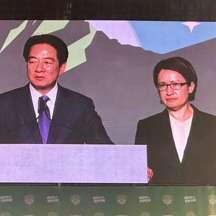
Joint CALD-LI Election Observation Mission in Taiwan
10 – 14 JANUARY | TAIPEI
& NEW TAIPEI CITY, TAIW AN
CALD, in partnership with the Liberal International (LI) and Taiwan’s Democratic Progressive Party (DPP), organized an election observation mission in Taiwan, which was holding its presidential and legislative polls on 13 January. With support from FNF and the Taiwan Foundation for Democracy (TFD), the mission provided an opportunity for participants to observe Taiwan’s democratic processes firsthand, with a focus on the transparency and integrity of the country’s electoral system.
CALD Election Mission in Jakarta & CALD 49th Executive Committee Meeting
12–15 FEBRUARY | JAKARTA,
INDONESIA
CALD conducted an election observation mission in Jakarta that provided insights into Indonesia’s electoral process and the dynamics of its political landscape as the world’s third-largest democracy held ‘5-in-1’ polls on 14 February. The mission, which was in partnership with the Indonesian Democratic Party of Struggle (PDI-P), was followed by the 49th CALD Executive Committee Meeting.
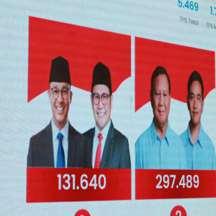
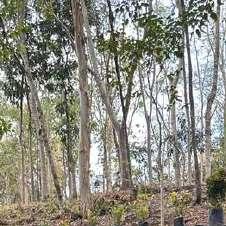
CALD Local Government Workshop in Trenggalek
6– 10 JUNE | TRENGGALEK,
INDONESIA
Held in the coastal regency of Trenggalek in Indonesia, the CALD Local Government Workshop focused on enhancing the capacities of local government officials in strengthening democratic governance. Participants engaged in discussions on decentralization, public policy, and effective service delivery at the local level, particularly in dealing with transportation and mobility issues in urban areas. The workshop, supported by the local government of Trenggalek, aimed to empower local leaders to implement progressive policies in their communities.



CALD Transformative Academy for Developing Empowered Leadership
1– 6 AUGUST | SINGAPORE
This women and youth leadership training program was designed to equip young leaders with the skills and knowledge to become champions of democratic governance. The inaugural CTADEL offered both academic training and hands-on leadership experiences and was held in Singapore in partnership with the World Movement for Democracy (WMD), Westminster Foundation for Democracy (WFD), TFD, and Junge Liberale.
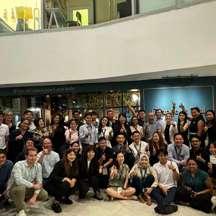
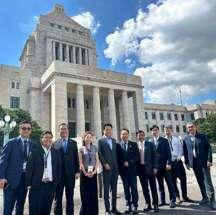
CALD Executive Mission Japan
8– 10 SEPTEMBER | TOKYO, JAPAN
This executive mission brought together regional leaders to explore Japan’s political structures and its democratic processes. The mission, with support from FNF and Japan’s Constitutional Democratic Party (CDP), provided participants with a unique opportunity to exchange views on governance, regional security, and the promotion of democratic values.
CALD Smart Mobility Conference
23– 27 OCTOBER | BANGKOK & KHON KAEN, THAILAND
Held in Bangkok and Khon Kaen, this regional conference served as the culminating activity of CALD’s three-year Smart Mobility Project. It brought together key stakeholders from across Asia to discuss sustainable and innovative transportation solutions. Supported by the Democrat Party of Thailand, the conference aimed to foster collaboration between governments, businesses, and civil society to promote smart mobility in urban centers.
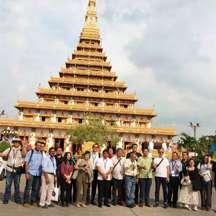
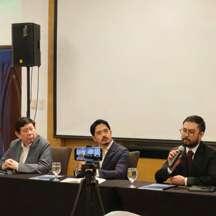
CALD AI Report Launch
4 DECEMBER | QUEZON CITY, PHILIPPINES
CALD closed the year by launching a policy paper on artificial intelligence (AI) and its implications for democracy and governance in the region. The paper aims to provide policy recommendations for governments in Asia to adapt to the rapid changes brought about by AI technologies in politics, and especially in elections. The launch included discussions with experts and stakeholders on the ethical challenges and opportunities AI presents for democrats and liberals.



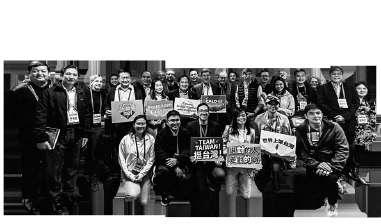
Joint CALD-LI Election Observation Mission in Taiwan

It was a year during which more than half of the world’s population were going to the polls, so it was only fitting that CALD began 2024 by having a joint election observation mission in Taiwan with Liberal International (LI). Taiwan was to have its presidential and parliamentary elections on 13 January, and there were strong indications that these would be tighter races than previous ones. More importantly, the fate of Taiwan has been seen as closely tied to Asia’s democratic future, and the results of its polls would have an impact beyond its borders.
A welcome dinner formally started the four-day mission, which had among its aims having the delegates observe Taiwan’s voting process and vote tabulation, as well as providing them with a general understanding and appreciation of the Taiwanese democratic system and political-party dynamics.
CALD Chairperson Mardi Seng underscored Taiwan’s role in the region in his welcome remarks, saying, “For us liberals and democrats who passionately advocate for freedom, human rights, and the rule of law, Taiwan is home. Taiwan has become a model for us who also aspire to have a democratic, secure, and prosperous future for our own people.”
That, of course, was largely due to the hard work of CALD founding member Democratic Progressive Party (DPP), which had governed Taiwan for two consecutive terms. Another win in the 2024
elections would have it serving for three consecutive terms, the prospects of which had the CALD-LI mission delegates excited.
First, though, the delegates spent two days meeting with partners and friends, among them the Taiwan Foundation for Democracy and the International Republican Institute. They also attended a seminar at the FNF Global Innovation Hub on Day Two of the mission, and had a briefing at the DPP headquarters on Day Three.
The CALD-LI delegation visited Legislative Yuan President You Si-Kun as well. Speaking on behalf of the delegation, LI Deputy President and FNF Chairperson Karl-Heinz Paque told You, “Our journey to Taiwan is a very important one. This country – Taiwan — is a beacon of democracy. What this country has achieved in the last 30 years is a shining example of transforming a country from an authoritarian regime into a full-scale democracy.”
President Tsai Ing-wen also graciously hosted the mission members, with whom she even had discussions on disinformation, artificial intelligence, trade agreements, and democratic progress. Mardi
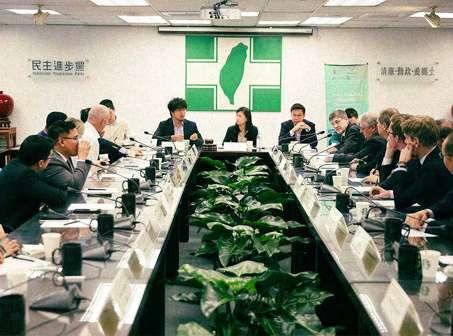
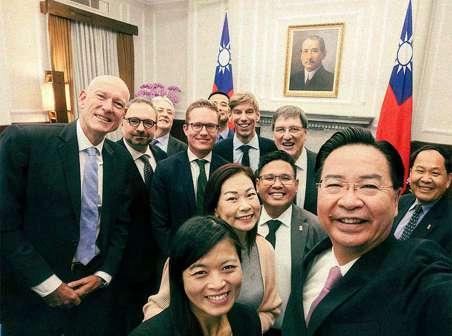
Seng acknowledged Tsai’s accomplishments in his address to the outgoing Taiwan leader, expressing admiration for her “leadership, strength, and creativity in engaging various sectors, particularly women and the youth.”
After the counting of votes was over, no single party ended up in majority in the 113-seat Legislative Yuan; the KMT got 52 seats, DPP 51, TPP eight, and independents two. But the DPP emerged victorious in the presidential poll, its third consecutive win an unprecedented feat since Taiwan transitioned to a democracy with competitive elections.
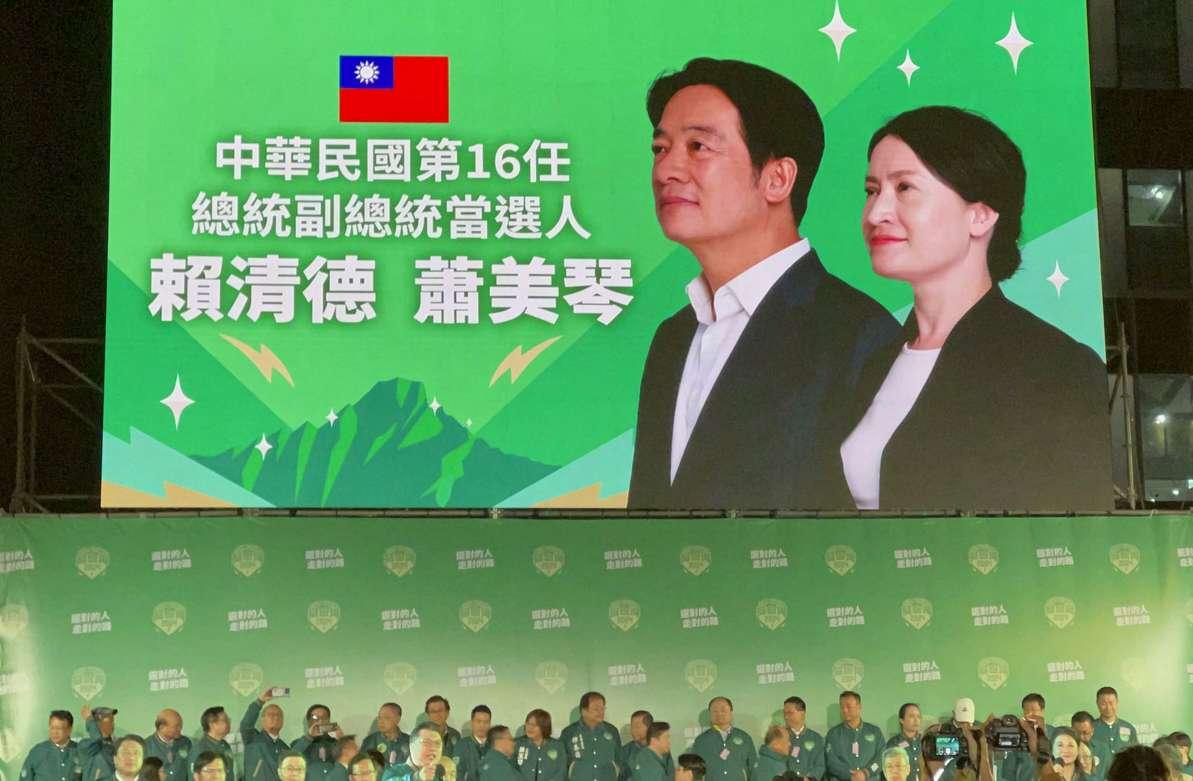

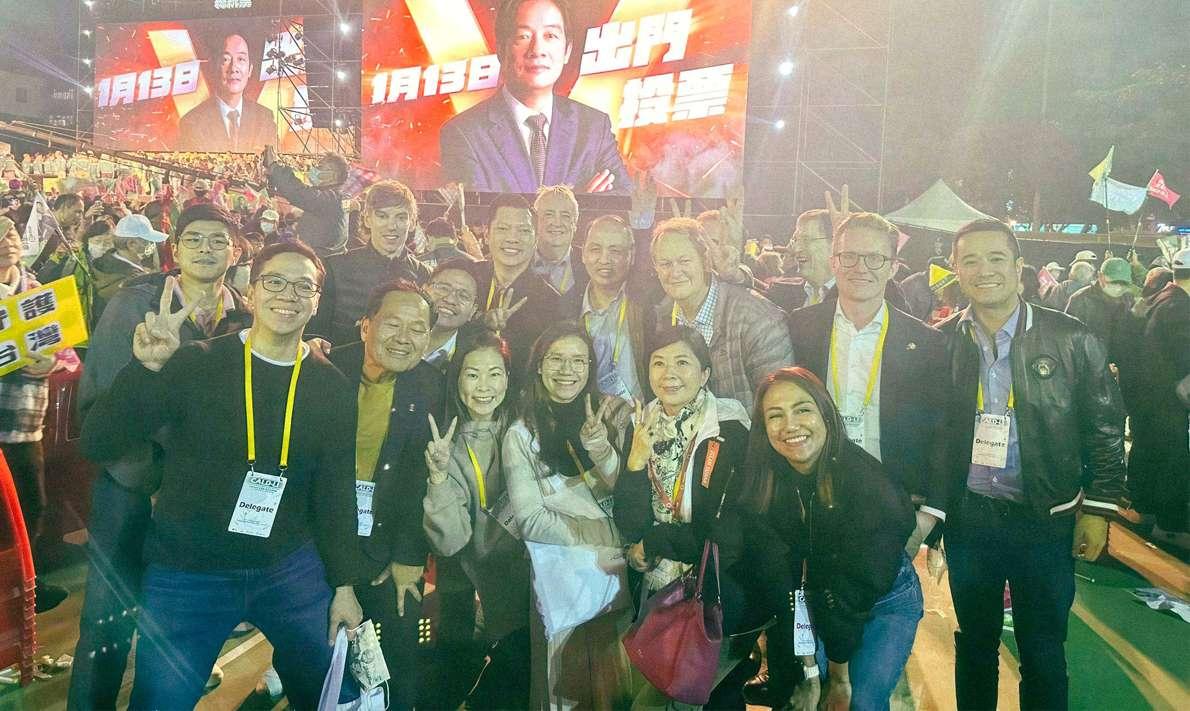
DPP presidential candidate Lai Ching-te obtained 40.1 percent of the total votes cast, while Hou Yu-ih of the Koumintang (KMT) and Ko Wen-je of Taiwan People’s Party (TPP) got 33.5 percent and 26.5 percent respectively.
After hearing the results, CALD and LI released a joint statement commending the DPP\s historic election victory. CALD also sent separate congrat
“Despite the efforts of external forces to influence election results,” CALD wrote to Lai, “your people
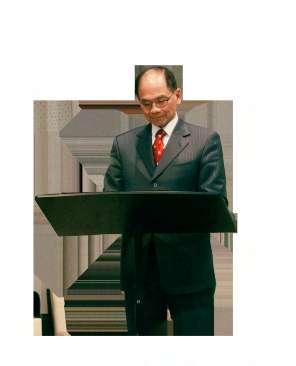
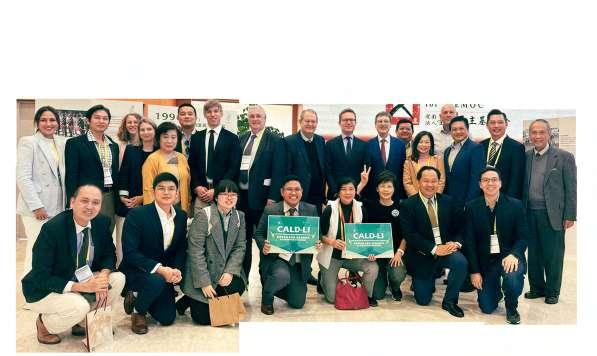
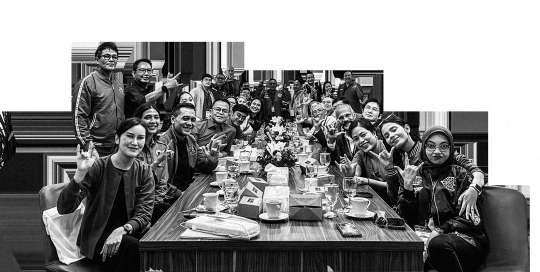
CALD Election Mission in Jakarta & CALD 49th Executive Committee Meeting

While many people across the world were busy celebrating Valentine’s Day, millions of Indonesians were preoccupied with an important event of their very own. On 14 February 2024, the world’s third-largest democracy held 5-in-1 elections to choose its president / vice president, members of the Senate, members of the House of Representatives, and legislative representatives at the provincial and city / district levels.
With over 204 million voters, 820,000 voting precincts, and 258,000 candidates, Indonesia’s 2024 polls were considered to be the biggest single-day electoral exercise in the world yet. The concurrent elections were made more complex by the varying electoral systems for each post.
CALD, of course, made sure to be there. To make full use of the fact that key officials of CALD would be among the election observation mission to Indonesia, the Council also scheduled its 49th Executive Committee Meeting on the sidelines.
Delegates of the CALD election observation mission arrived in Jakarta on 12 February. In large part, the visit was also meant to demonstrate solidarity with CALD member Indonesian Democratic Party of Struggle (PDIP) as it contested crucial elections.
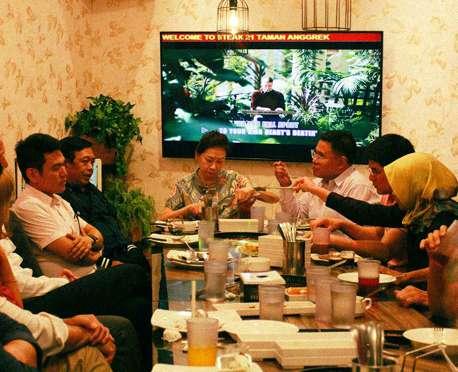
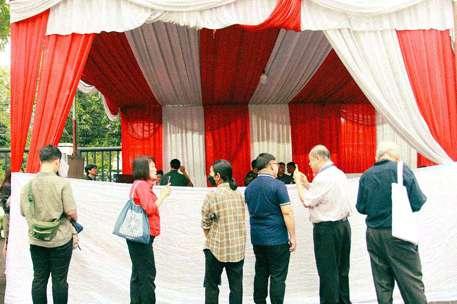
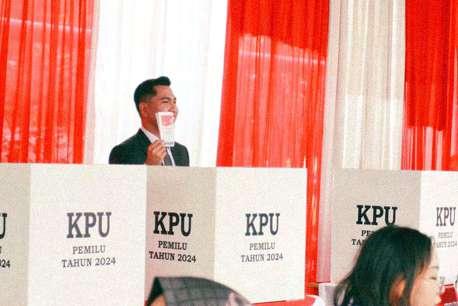
Prior to Election Day, the mission delegates met with representatives from PDI-P, civil society, and the academe to contextualize and understand better the key issues and problems in the 2024 polls. The discussion yielded these observations:
• Indonesia deserved credit for holding elections of this scale and complexity considering its relatively shorter experience with democracy;
• The 2024 elections were affected by the Constitutional Court’s decision disregarding the age requirement, which appeared to have favored one particular candidate; and
• While Indonesian elections can be considered a “festival of democracy,” several issues remain and need to be addressed. These include the focus on presidential elections and the corresponding lack of attention on legislative elections; the emphasis on personality instead of issues during the campaign; the need for voter education to address the issue of invalid ballots; and the use of pork barrel politics to influence the voters.
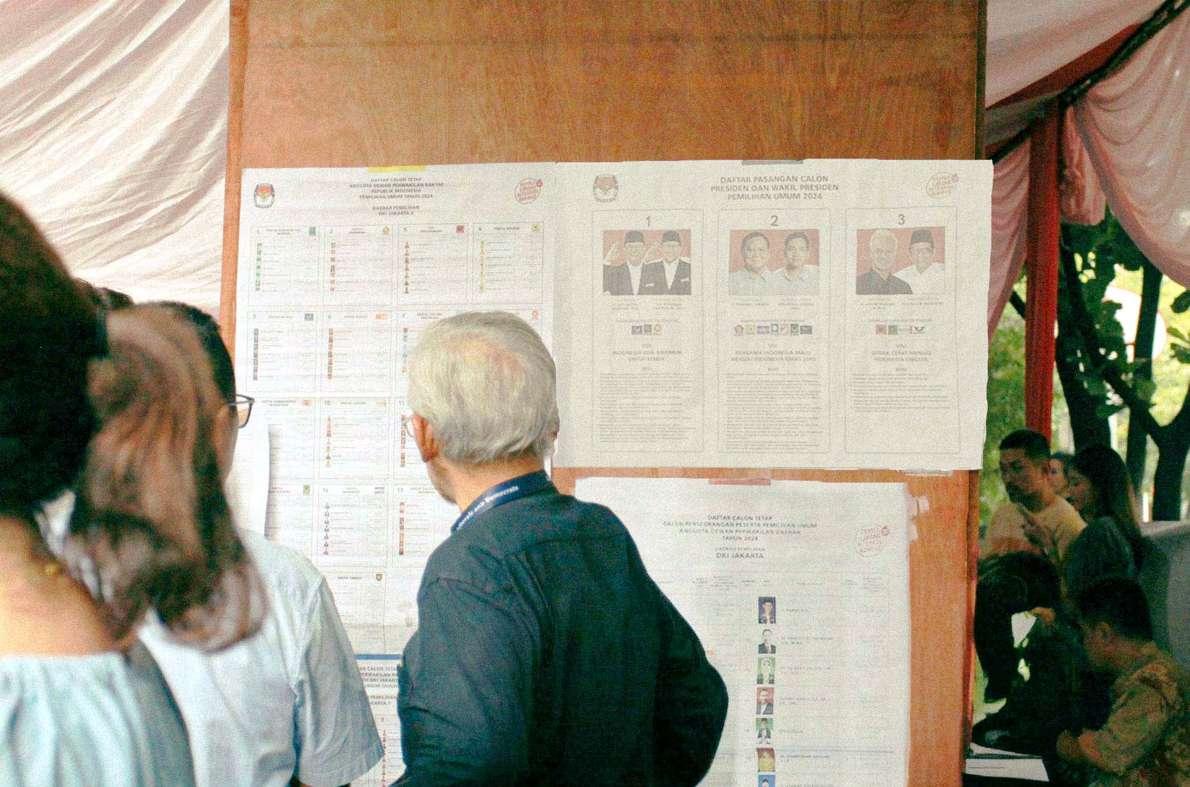
By the evening of 14 February, reliable quick counts suggested that the presidential-vice presidential tandem of Prabowo Subianto and Gibran Rakabuming Raka had obtained enough votes to avoid a second round of elections. PDI-P, however, was still the biggest party in the national legislature.
In the debriefing session, members of the CALD delegation noted the orderly, open and transparent conduct of the elections, despite their scale and complexity, as well as the active involvement of the youth in the electoral process and the use of digitalization and AI technology in the campaign. Among their takeaways from the mission were the importance of interaction with members of civil society and the academe to get a complete picture of the electoral process; the necessity of having an efficient and independent election commission; the continuing need for voter education; the importance of having the opportunity to observe vote counting to complete the election observation experience; and the need for political maturity to accept election results.
“As a political party network, we are of course very interested in elections,” said CALD Chairperson Mardi Seng. “And as liberals and democrats, we want elections to be free, fair, and honest – to be by international standards. The recently concluded Indonesian elections show that while significant progress has been made, there are still a number of issues that need to be addressed in order for the country to have a stronger, more consolidated democracy.”
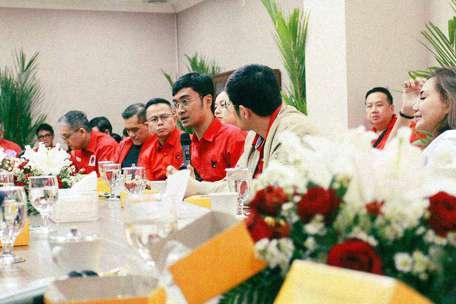
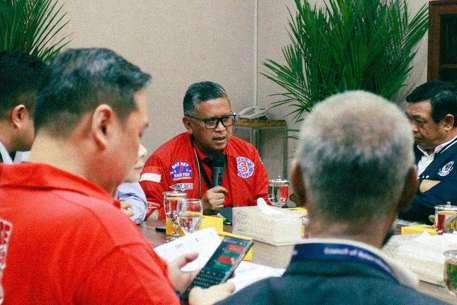
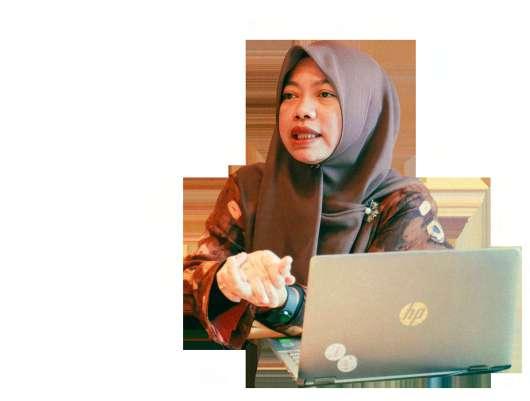
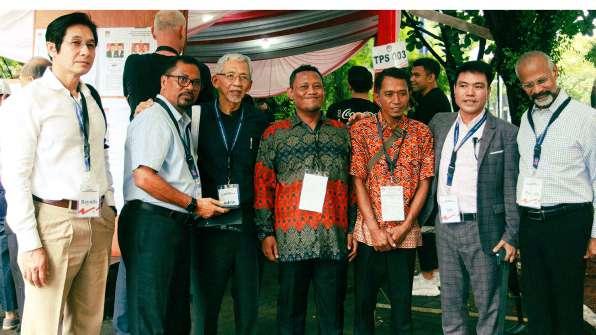
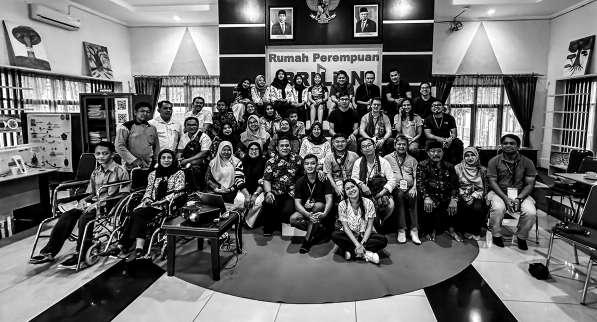
CALD Local Government Workshop on Smart Mobility

The local sun-kissed beaches beckoned, but CALD had serious business to accomplish first in Trenggalek, a regency in East Java, Indonesia. For three days in June, CALD, held a localgovernment workshop in Trenggalek City, which is primed to implement smart-city innovation through its economic and tourism development programs.
With the theme “Transforming Smart Mobility Ideas into Local Government Solutions,” the workshop –hosted by Trenggalek Mayor Mochamad Nur ‘Avin’ and with FNF support—was the third installment in CALD’s Smart Mobility workshops for local governments.
“Trenggalek is on the right track,” said CALD Secretary General and former Philippine legislator Francis ‘Blue’ Abaya, commenting on Trenggalek City’s transportation and mobility initiatives. “Smart mobility provides opportunities for bringing in the strength of the community toward inclusive progress in local governance. Trenggalek has shown that it draws strength from the people, and uses public dialogue to take up the challenge for further boosting its mobility and transportation services to improve tourism and the local business industry.”
Indeed, community consultation is a top priority in Trenggalek’s mobility program. At the workshop, the youth, women, senior citizens, and PWDs all had representatives. They shared their ideas and concerns on mobility challenges while representatives from the transportation department, traffic management department, and the mayor’s office
listened and took note of the issues that needed to be addressed.
According to the participants, mobility challenges in Trenggalek covered public transportation, road and pedestrian safety, road infrastructure, noise pollution, and congestion. Aside from a lack of public transportation, the participants said service areas were also limited and had short operating hours. Trenggalek suffered from intersections that had no signal lights, too, they said.
Fortunately, resource persons were on hand to point out that solutions for these are not that hard to find. Among these resource persons was Karlo Abadines of AltMobilityPH, a group of policy advocates that promote sensible and humane transport policies. He noted that “building for the most vulnerable in society is building for everyone’s accessibility.”
Workshop participants also heard the experiences of local governments from other countries such as the Philippines, Taiwan, and Thailand. Discussing their respective smart-mobility initiatives were Taiwan’s ruling Democratic Progressive Party associate researcher Luke Tsai and Democrat Party of Thailand’s Strategic Technology and Innovation Center Technical Manager Pieethum Triyakasem. From the Philippines were San Mateo, Rizal Mayor Bartolome ‘Omie’ Rivera Jr. and Panglao, Bohol Councilor Dennis Hora. Both San Mateo and
Panglao are CALD partners in building mobility plans for local governments.
Aside from attending the workshop proper, the participants also visited the City Hall and Pasar Pon or the Trenggalek Mobility Hub to observe transportation infrastructure and experience firsthand the freedom of mobility through walking, biking, and even riding wheelchairs and walking blindfolded. And because Trenggalek focuses as well on keeping the environment healthy, the participants’ stops included the Gunung Jaas project, a forest city garden that sprawls 40 hectares across Trenggalek and which Mayor Avin has declared a protected area.
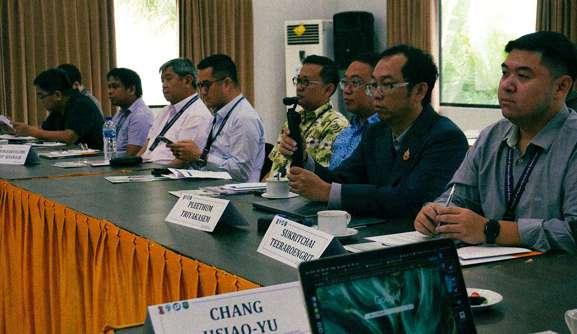
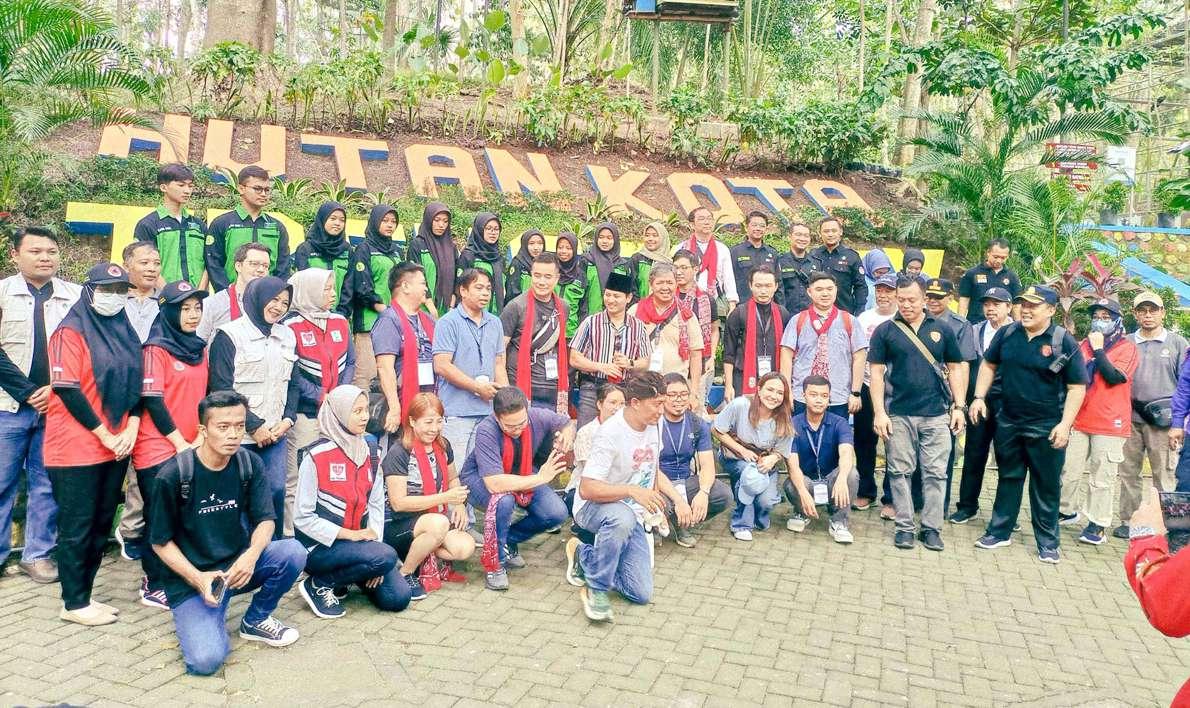
In the end, the convening of the community and local government proved helpful as they worked together on identifying the goals for each issue and listing short – and long-term plans to address them.
Among the listed initiatives they planned to work on were: an incentive system for those who use bicycles; more people-centered infrastructure planning; compulsory insurance for vehicles; a mobility campaign on the rights of pedestrians; and periodic community consultations.
Gigih Widy Merbawani, a youth representative, said that it was Trenggalek’s first time to host an international event.
“This event has given us, people of Trenggalek, a new perspective on how to use proper transportation as well as to build up the awareness to the community,” she said. “The workshop brought such
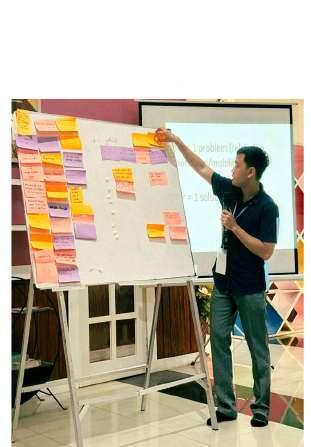
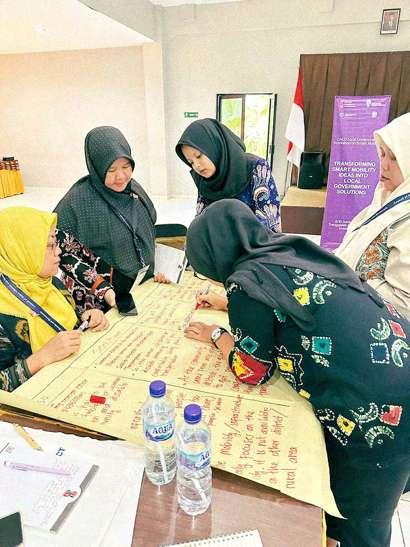

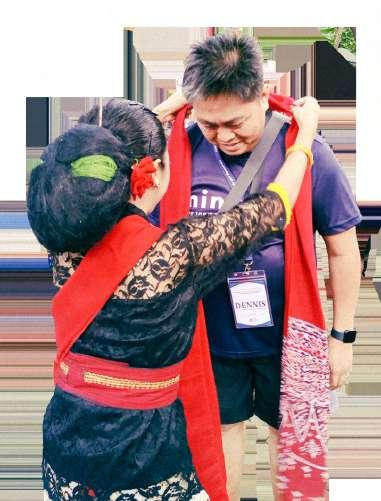
Mayor Avin said that participating in the CALD workshop proved to be highly informative.
“The insights gained from experiences in different municipalities and expertise shared by professionals have inspired us with valuable ideas for our future endeavors,” he said. “I am confident that this workshop has the potential to propel us toward achieving the goal of a net-zero carbon city by 2045.”
Paolo Zamora, CALD program manager in charge of the CALD Smart Mobility Project, meanwhile commended the mayor “for showing the kind of leadership that inspires communities to express their needs and ideas and allows them to work hand-in-hand with the local government in delivering inclusive and sustainable reforms on transportation and mobility services.”
“Trenggalek is a promising place,” Zamora also said.” I will not be surprised if it becomes one of the main tourist destinations in Indonesia.”
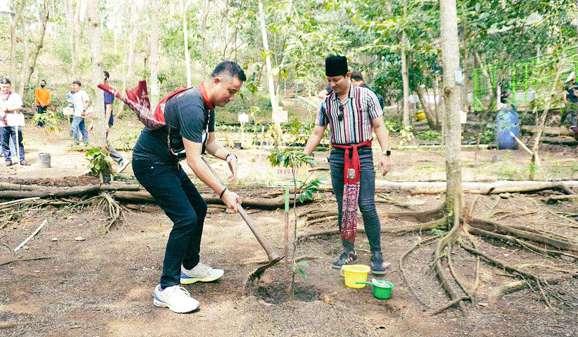
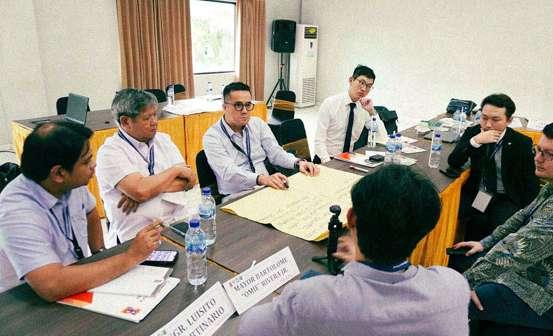
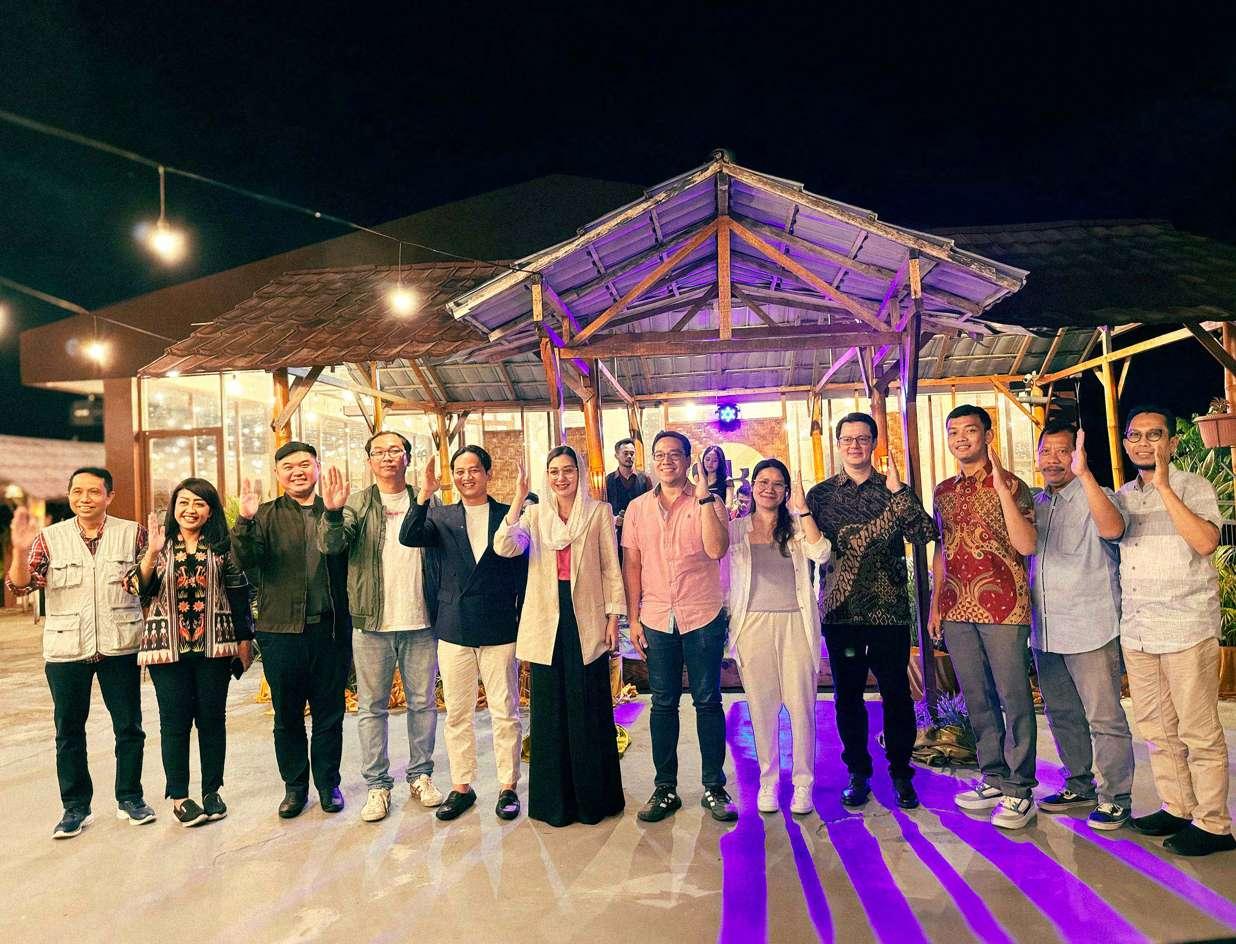
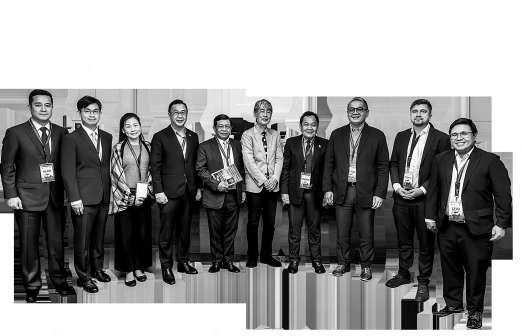
CALD Executive Mission to Japan

The political heat in Tokyo was threatening to match the searing temperatures of late summer in the Land of the Rising Sun. But that suited CALD just fine during its short but meaningful executive mission to Japan in September.
The primary objective of the mission was to strengthen the Council’s relations with its observer-member the Constitutional Democratic Party (CDP). The high-level delegation also took the opportunity to meet Japanese think tanks, civil-society groups, and other stakeholders with
which CALD could potentially partner in advancing its democratic work.
“The visit is part of our efforts to engage more democratic allies to address challenges to democracy and human rights in East and Southeast Asia,” said CALD Chairperson and delegation head Mardi Seng. “Japan’s democratic credential and the CDP’s political experience can be very valuable to CALD as we endeavor to broaden political space in the
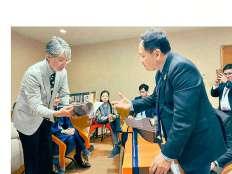
The main opposition party in Japan, CDP has been a CALD observer member-party since July 2020. As stated in its platform, CDP’s goals include democratic politics based on constitutionalism; a free society that
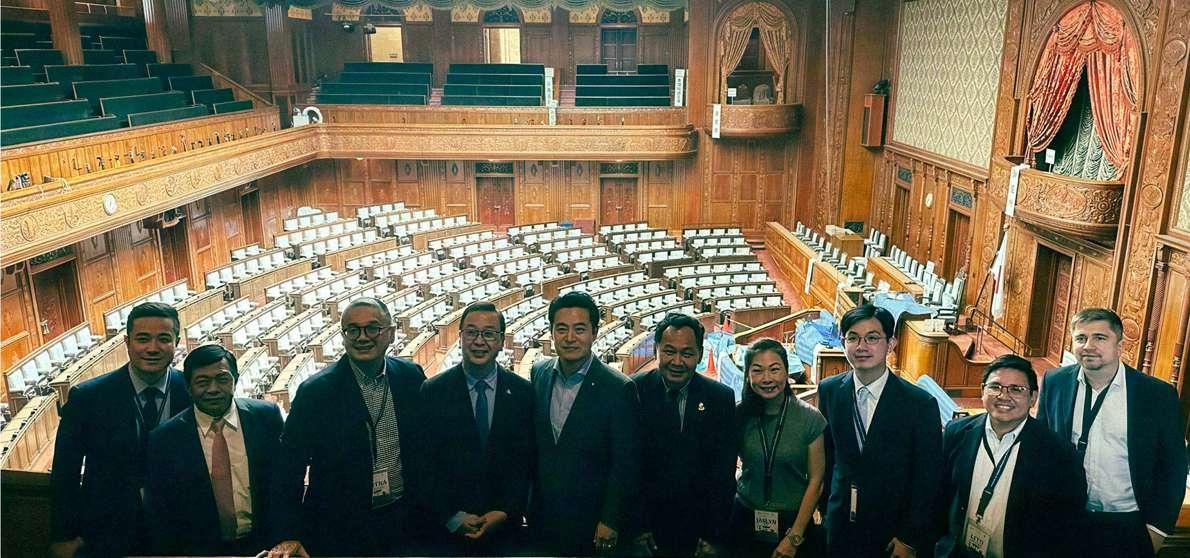
respects human rights; a symbiotic society that respects diversity and mutual support; an economy that respects people and promotes well-being; a sustainable and reliable social security; strong and trustworthy government in times of crisis; and global peace and prosperity.
In Japan’s April 2024 by-elections, CDP swept all three seats up for grabs in the House of Representatives. These results heralded the possibility of an opposition victory in the next general poll, which must be held by October 2025.
Although CALD’s visit coincided with CDP’s party-leadership elections, the delegation was nevertheless welcomed warmly by the CDP in its
Tokyo headquarters. The key officers of the party’s International Bureau — including a former minister, and all of them incumbent members of the House of Representatives – engaged in a frank and candid discussion with the CALD delegation about Japan’s current political scene, as well as the human rights situation in East and Southeast Asia.
MP Kentaro Gemma, director general of CDP’s International Bureau, noted that the ruling Liberal Democratic Party (LDP), was at the time also in the process of choosing its next leader. Gemma reckoned that there would soon be greater differentiation between the two parties about “the kind of country we want to create.”
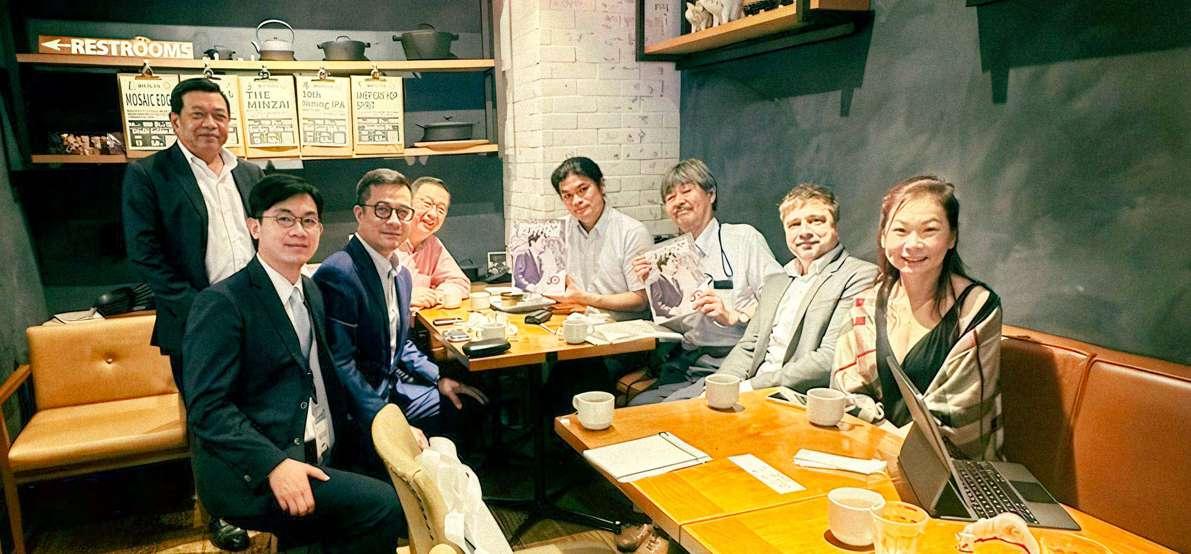
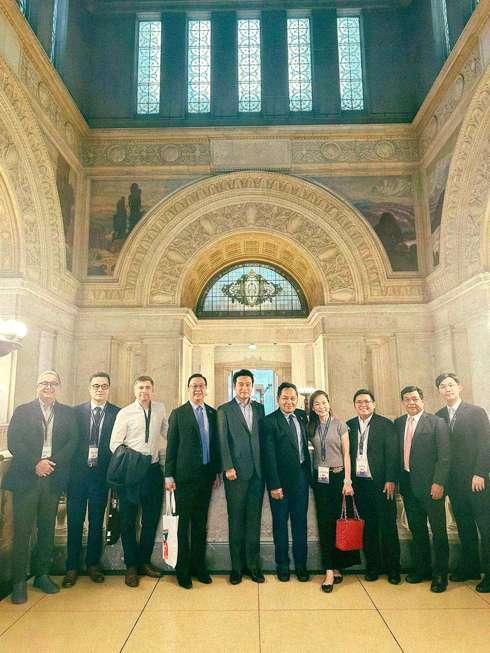
Prior to hosting the CALD delegation at its headquarters, CDP organized a tour of the Japanese Diet and a luncheon with MP and CDP International Bureau Deputy Director Shu Sakurai. Later that evening, the CDP treated the delegation to a sumptuous Fukuokan dinner.
The CALD executive mission agenda also had the delegation meeting with other opposition parties, such as the Japan Communist Party and the Social Democratic Party. In addition, the CALD mission members had discussions on various issues with representatives of think tanks and civil society, such as the Japan Centre for International Exchange (JCIE) and the Japan NGO Center for International Cooperation (JANIC), along with its research and advocacy arm THINK Lobby, as well as with the Japan director of the Inter-Parliamentary Assembly on China (IPAC).
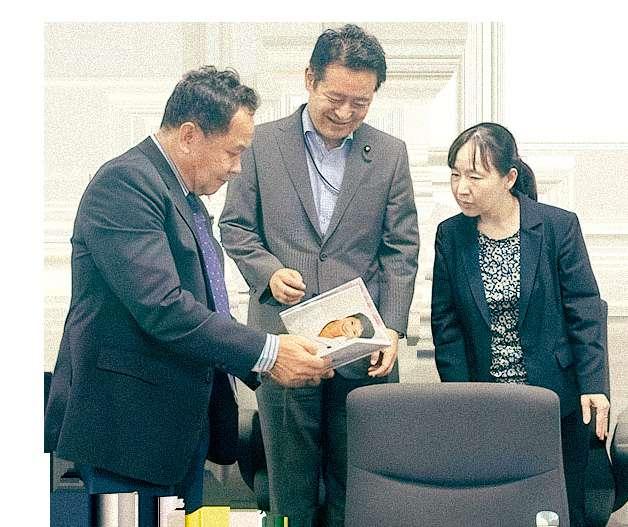
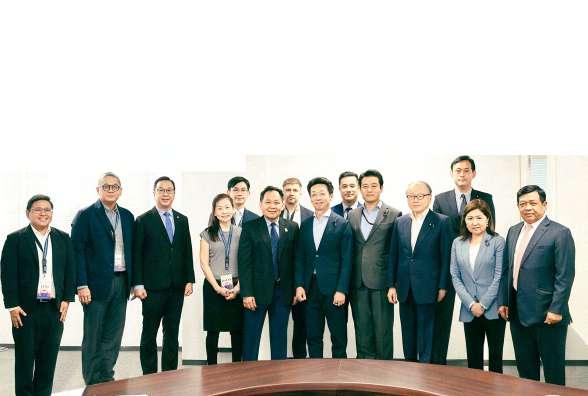
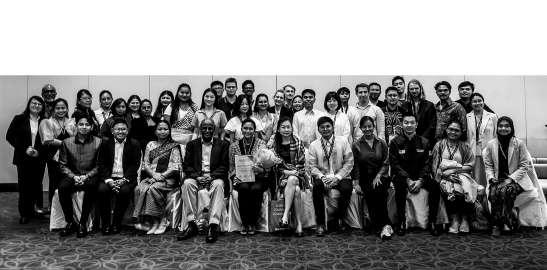
CALD Transformative Academy for Developing Empowered Leadership

Even in the best of times, there will always challenges to democracy. To help ensure that there also will always be political leaders and thinkers ready to defend and support democratic and liberal values, CALD for years has been conducting workshops to hone the leadership skills of members of the CALD Youth and the CALD Women’s Caucus.
In 2024, the Council decided it was time to have a political academy for women and youth leaders that would enforce foundational knowledge, build a transformative attitude, and develop critical skills necessary to practice innovative and transformative leadership.
For five days in August thus, the inaugural CALD Transformative Academy for Developing Empowered Leadership (CTADEL) was held in Singapore, with some 30 women and youth leaders from across Asia as participants. Providing support for the event were the Singapore Democratic Party (SDP), FNF, World Movement for Democracy, Westminster Foundation for Democracy, and Taiwan Foundation for Democracy.
CALD Chairperson and Cambodian Senator Mardi Seng summarized CTADEL’s goal in his opening remarks, saying that it was meant to equip participants with the knowledge and skills so that they can “act like fortresses that would defend our freedom and democracy against illiberal, ultranationalist, and authoritarian forces that remain predominant in many parts of the world, including Asia.”
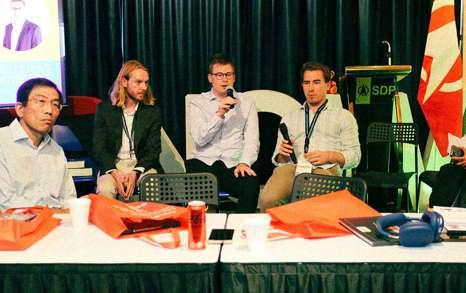
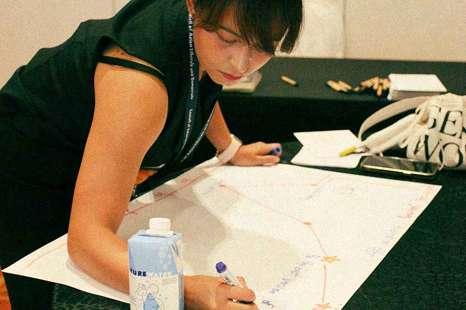
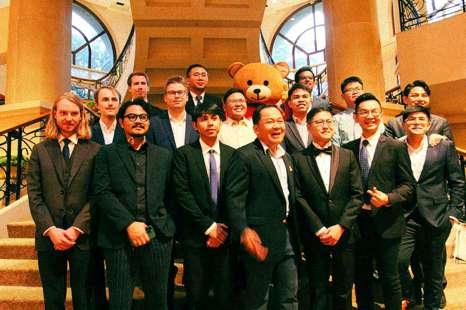
CALD’s decades-long experience in conducting workshops for members of its women and youth wings were vital in developing CTADEL. Key learnings from these previous workshops were synthesized to come up with a comprehensive and incisive training program for emerging political leaders. Also providing their expertise at the event were seasoned facilitators and resource persons not only from Asia, but from Africa and Europe as well. Notable women leaders delivered the keynote addresses, such as former Philippine Vice President Leni Robredo, Liberal International President and former Morocco Environment Minister Hakima el Haite, and former Philippine Senator Leila de Lima (through video).
Five modules made up the CTADEL program in Singapore. Module I, “Political Analysis of Asia,” came in the form of a panel discussion featuring academics Elvin Ong and Cherian George, and civil society activist Braema Mathi. They took up issues like the role of opposition parties, societal polarization, and the gender divide in the region. Asia Centre Regional Director James Gomez facilitated the module’s working group session where these issues were contextualized as narratives of democracy.
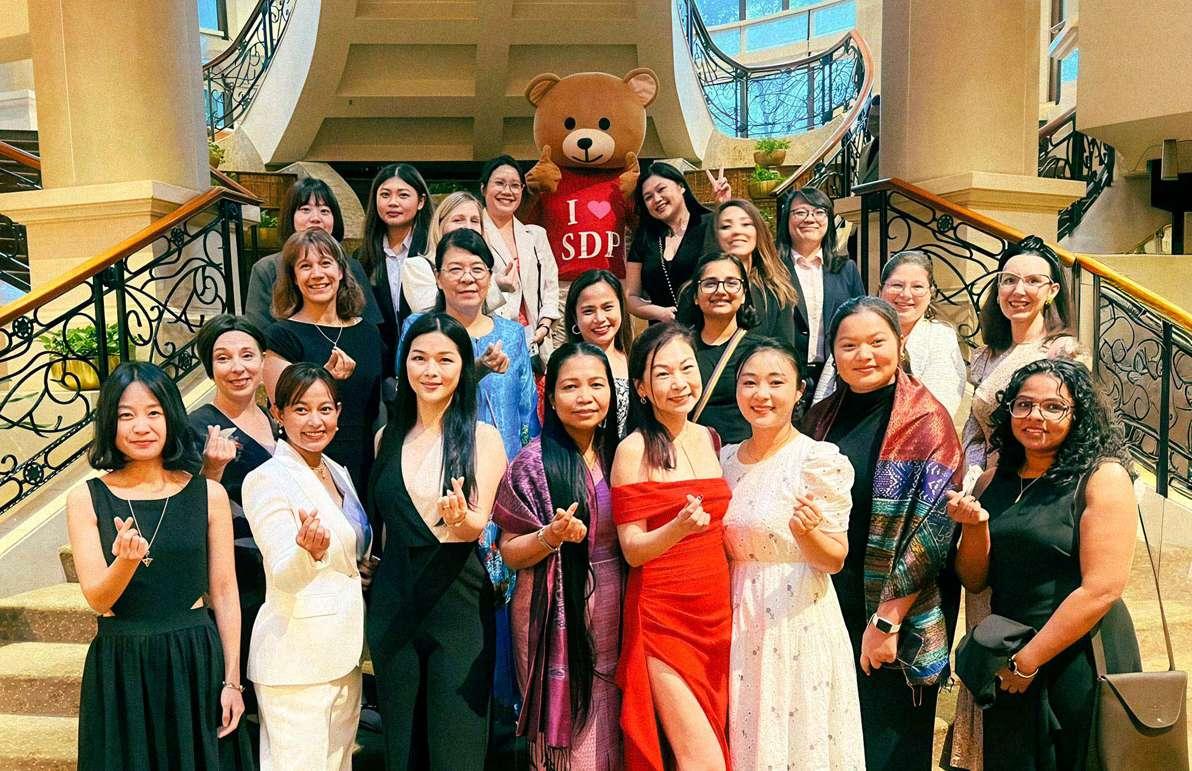
Module II was spearheaded by CALD Chairperson Mardi Seng and SDP Secretary General Chee Soon Juan. They tackled the key principles of liberalism and democracy and how these are observed or practiced in the Asian region. Enriching the discussion were inputs from youth Kai Pischke of the International Federation of the Liberal Youth and Calvin Nixon and Mats-Ole Maretze of Junge Liberale of Germany.
Emil Kirjas of Kirjas Global facilitated Module III, which focused on strategic communications. After discussing the changing face of the media and the profile of the electorate, he delved deeper into the key elements of strategic communication such as target audiences, messaging points, narrative construction, branding, and public speaking. These were then put into practice in group exercises with Singapore, Cambodia, and CALD Youth serving as case studies.
Networking was the topic of Module IV, which was ably facilitated by Scottish Liberal Democrats CEO Rachel Palma Randle and Democrats 66 (Netherlands) international officer Martine van Schoor. Randle and van Schoor first talked about networking theories and the importance of knowing one’s personality type, and how they can be harnessed for crafting networking strategies. The participants then had a
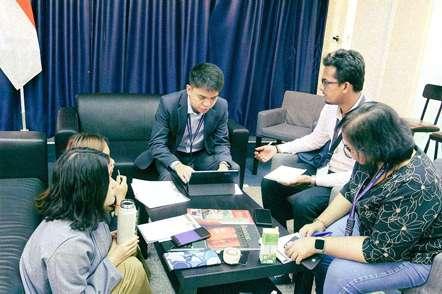
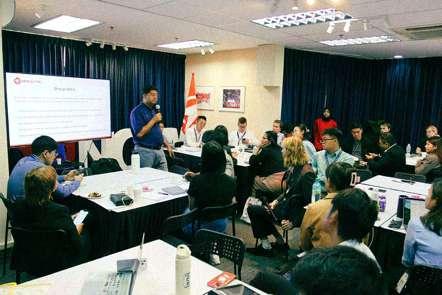
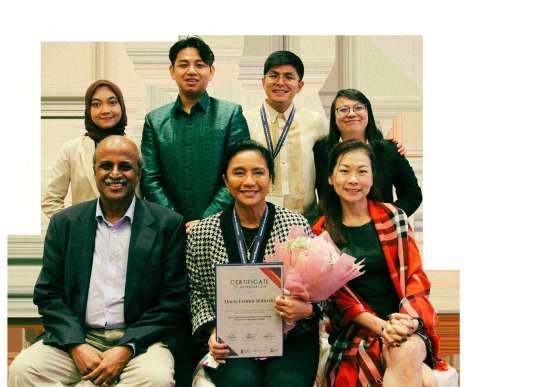
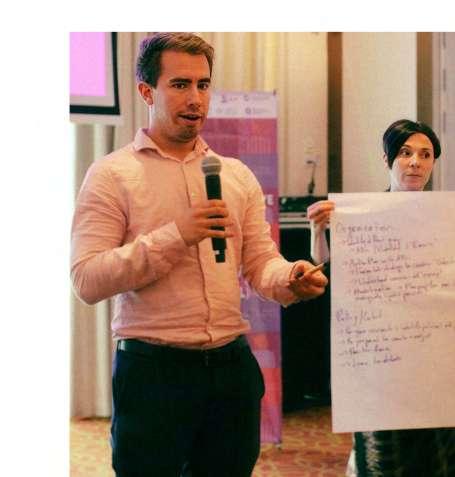
networking-in-action activity, where they practiced their networking skills.
Module V was on leadership. Participants were divided into two groups: women and youth. The women’s group was facilitated by Randle and van Schoor, while the youth group was put under Alexandra Charnock of Apollo Strategic Communications. The women participants learned about feminist-transformative-generative leadership and reflected on their respective leadership journeys. The youth participants, meanwhile, tackled digital issue advocacy, and were asked to come up with a specific digital advocacy campaign.
“CTADEL is a step in the right direction,” CALD Youth Chairperson Jeremiah Tomas later remarked. “The fight for liberalism and democracy is a fight that can only be won together. It has been a fruitful and transformative experience as we are able to bring together different leaders from the regional political youth wings, to the leaders of women caucuses, civil-society organizations, and other international partners who came together to discuss, share, and innovate how to champion democracy in their respective communities.”
“We can say that we have succeeded in this first step in bringing like-minded individuals from all walks of life together,” he added. “For impact can only happen at the speed of relationships, and
we hope that this event has been a reminder to everyone that we are not alone in this fight for liberalism and democracy.”
Outside the CTADEL program, the participants joined SPD members and supporters in celebrating the party’s 44th founding anniversary. In his moving speech, SDP Secretary General Chee Soon Juan challenged the attendees to be politically involved even when the circumstances are difficult.
“Ships are safer in the harbor,” said Chee. “But that is not what ships are built for. In the time that I have served the party, I have gone through much tumult and long dark periods. But I have not the slightest doubt in my mind that the indomitable spirit for freedom amongst us will spur this country to one day bring democracy to its shores.”
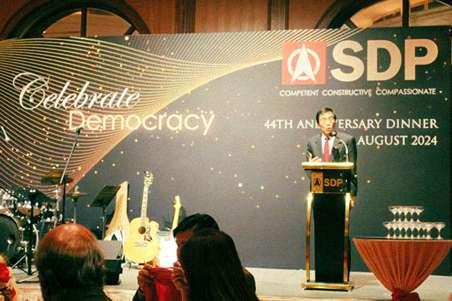
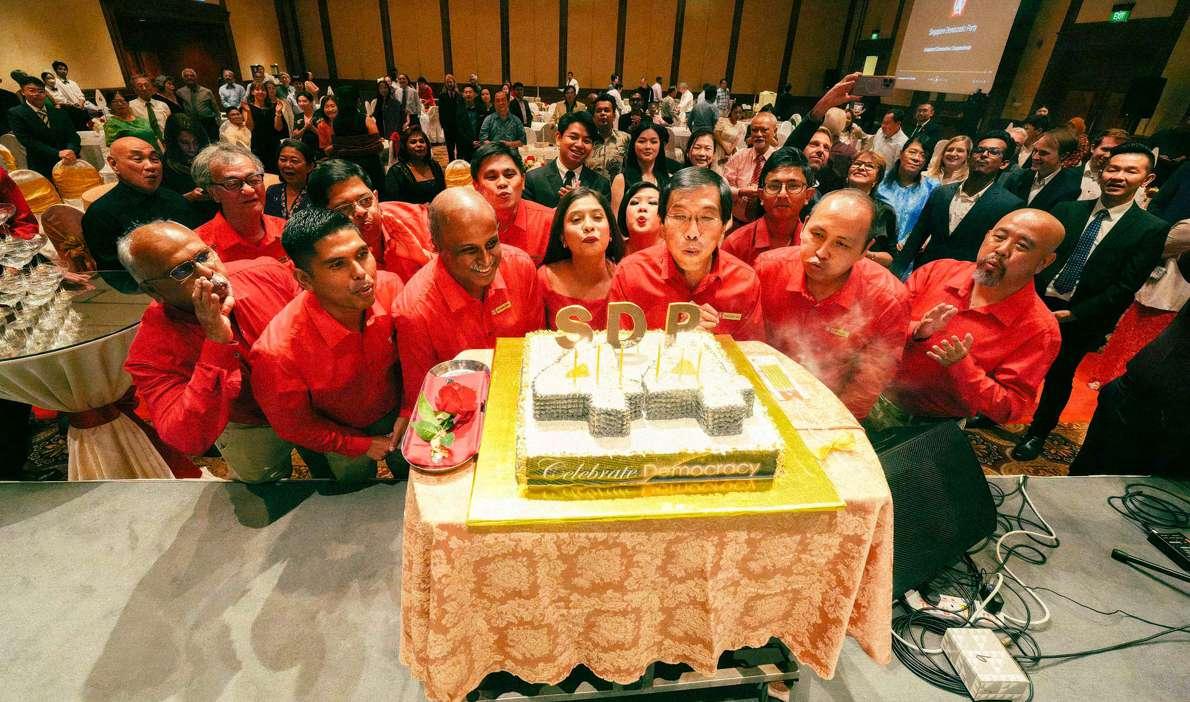
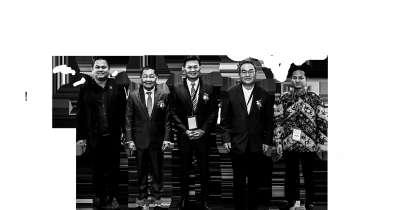
CALD Smart ConferenceMobility

Even good things must come to an end, but CALD wasn’t about to let go of its three-year Smart Mobility Project just like that. And so in October, it gathered a diverse group of stakeholders across Asia for a conference in Thailand that would enable them to explore innovative solutions for urban mobility.
Under the theme “Transforming Smart Mobility Ideas into Local Government Solutions,” the conference was hosted by the Democrat Party Thailand and supported by FNF. To get in the right mindset for the conference proper in Khon Kaen in northeast Thailand, the delegates visited Chulalongkorn University and King Mongkut Institute of
Technology in Bangkok. At these prestigious institutions, they discussed with urban-planning and transportation experts the Thai capital’s smart-city plan, as well as their own mobility and transportation initiatives.
In Khon Kaen, the conference opened with a comprehensive overview of the current state of mobility in Asia. Experts highlighted the growing challenges posed by urbanization, including traffic congestion, air pollution, and inadequate public-transport systems. Presenters from Indonesia, Thailand, and Taiwan emphasized that addressing these issues requires a paradigm shift from traditional car-centric models to more sustainable, people-centric approaches. Indeed, as cities continue to expand, the need for effective mobility solutions becomes increasingly urgent.
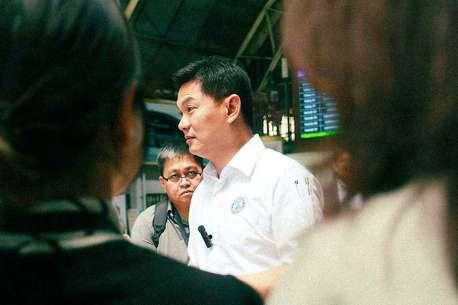
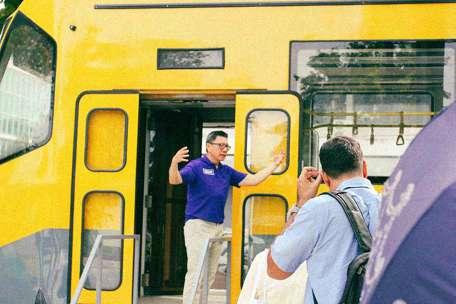
Session Two of the conference focused on the critical shift toward putting people first in terms of transport planning for cities. Panelists for the “Smart is Being Responsive” session discussed how prioritizing vulnerable groups such as pedestrians, cyclists, and public transit users over cars not only enhances urban livability, but also contributes to environmental sustainability.
Gonggomtua Sitanggang, Southeast Asia Director of the Institute for Transportation and Development Policy (ITDP) in Indonesia, for instance, noted that “streets are designed for machines, not people.” This is what needs to change, he said, adding, “We need to think on how we move people in our streets and design multimodal streets to accommodate public transportation, pedestrians, and cyclists. Streets should let people move and be able to access their needs.”
“If you build more spaces for cars, you will get more cars,” pointed out Silpa Wairatpanij, Committee Member of Thailand Walking and Cycling Institute Foundation. “But if you build more space for pedestrians, you will get more pedestrians, cyclists, and increase of local economies. If you plan for the most vulnerable road users, everyone wins.”
This was echoed by transportation engineer Kusuma Refa Haratama from the State University of Surabaya, who studies how to ensure women’s safety in transportation systems to address gender equality and promote sustainable community goals. He remarked, “I believe that our public transportation system must be flexible in responding to the needs of users especially female passengers. Digitalization helps us ensure their safety and security.”
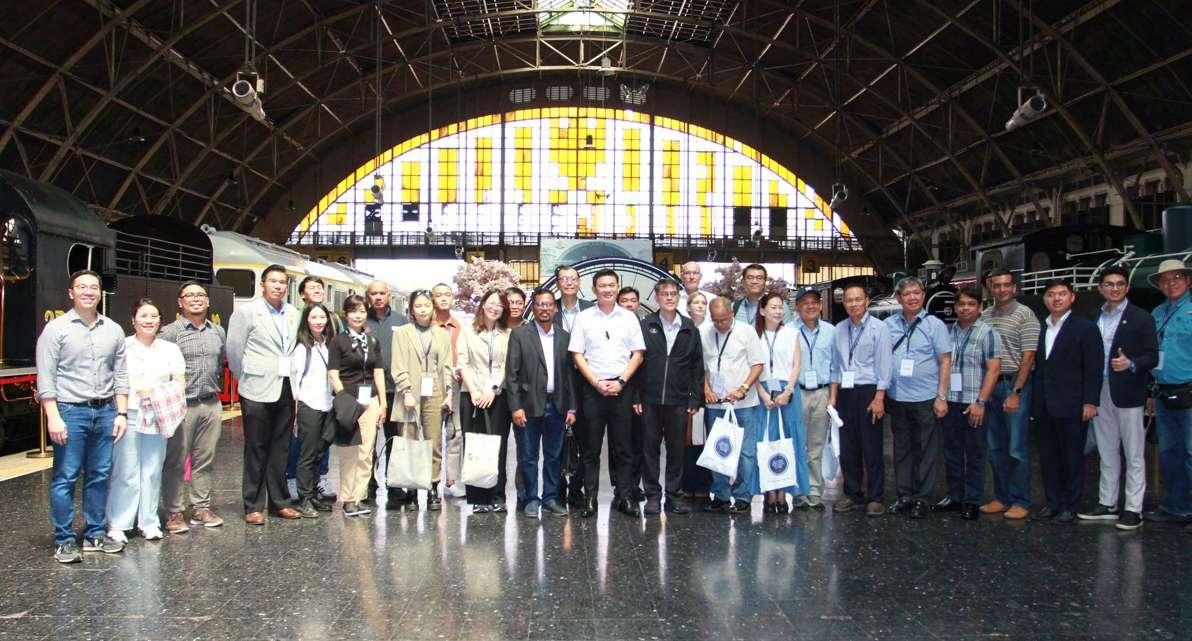
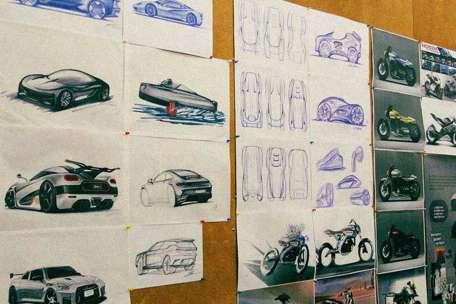
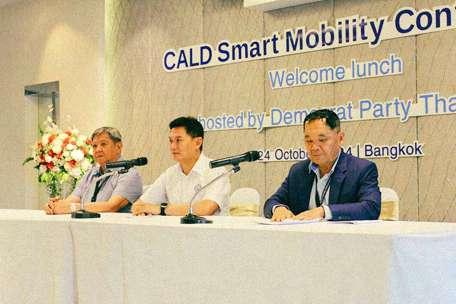
Yet another session underscored the importance of partnerships in driving mobility reforms. Panelists explored collaborative efforts between government entities, private sector stakeholders, and civil-society organizations. Successful partnerships were showcased as essential for developing innovative solutions, sharing best practices, and securing funding for mobility projects.
In her presentation at the session, Dr. Jeeyoung Bae, a research fellow of the Institute for Democracy of the Democratic Party of Korea, said that private sectors, including universities and start-ups, can boost the innovative capacities of cities. IDTP’s Sitanggang commented, “We need to do participatory planning and collaboration with actual road users. We need leaders who have strong commitment in supporting policies that focus on providing more livable cities.”
Although all these seemed like they would be
Indonesia illustrated diverse approaches, each tailored to local contexts –proving that there are solutions, but that there is no one-size-fits-all solution.
Trenggalek Mayor Mochamad Nur ‘Avin’ Arifin also emphasized the importance in nurturing trust in the community. He said that the people’s trust in local leaders can generate a big impact even if the initiatives themselves are small.
“The biggest thing that we need to do right now is how we convince our people that we can do more than what we did before,” Mayor Avin said. “If you want your city to be more inclusive, if you want to achieve low carbon emission development, you should make your people believe that there is a regenerative economy.”
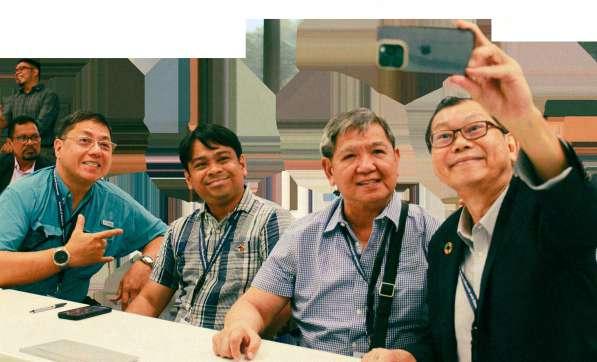

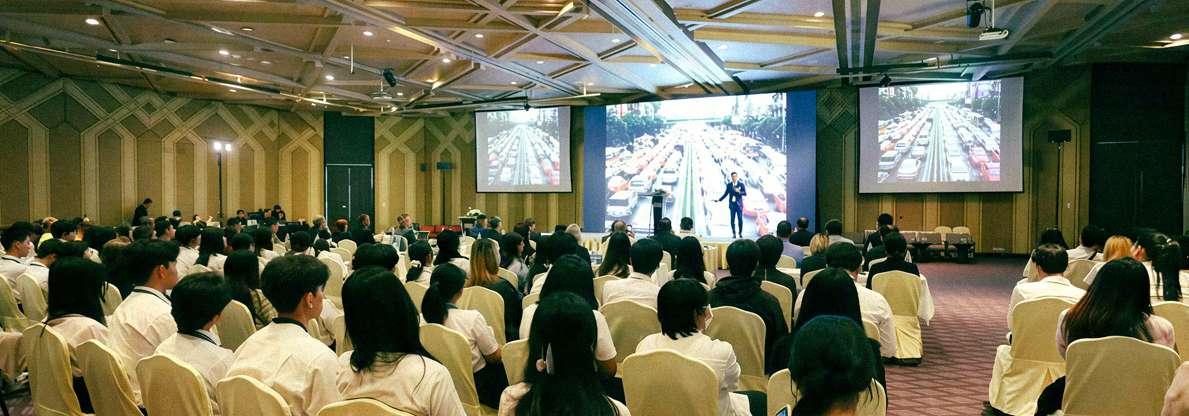
And then there was the site of the conference itself that ably demonstrated how smart-city plans can be made into reality. In truth, Khon Kaen’s innovative approach stands out as a participatory development project that minimizes dependence on central government funding. Said DP Deputy Leader Dr. Suchatvee Suwansawat: “Khon Kaen City is one of the successful cases for smart mobility in Thailand in terms of the participation of all sectors.”
A notable meeting with Khon Kaen Mayor Teerasak Teekayuphan allowed the conference delegates to delve into the city’s ambitious plans for integrated light rail transit—a private-led initiative aimed at enhancing connectivity for residents. The mayor articulated a vision for a robust transit network that integrates seamlessly with existing infrastructure, emphasizing the importance of public-private partnerships in realizing this vision.
Dr. Suradech Taweesaengsakulthai, Co-Founder and Chairman of the Khon Kaen City Development (KKTT), also welcomed the delegates at the Light Railway Construction Lab. Discussing the vision of the Khon Kaen smart-city model, he explained that it is based on Transit-Oriented Development (TOD), a concept that leverages mass transit as a catalyst for real estate and urban development. By focusing on creating vibrant, walkable neighborhoods around transit hubs, Suradech said, Khon Kaen aims to foster economic growth while improving residents’ quality of life.
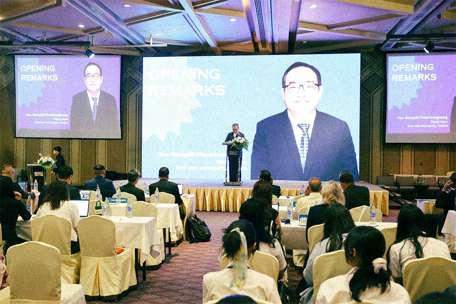
The discussion around the Khon Kaen model resonated deeply with the conference delegates, many of whom expressed interest in replicating its principles in their own cities. Many were also appreciative of the positive impact of CALD’s Smart Mobility Project. Jason Chang, professor of transportation engineering from the National Taiwan University, even suggested, “Leverage the resources that can support the activity in the past three years and also in the coming years in terms of the smart mobility and sustainable mobility –including funding, benchmarking of successful stories, and developing transportation information sharing platforms.”
As the conference concluded, CALD Secretary General and former Philippine legislator Francis Abaya reminded everyone that there is no real end to having smart-city ideas and innovations.
“Our hope is that our cities can still thrive and breathe amidst the rising urban challenges and provide quality and prosperous living for all of us,” Abaya said. “There’s no better time to start than now. There’s no better day than today.”

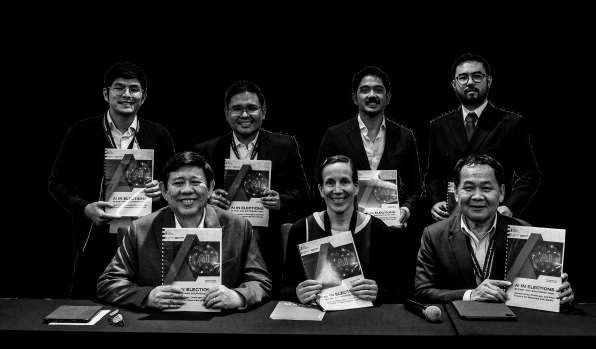
CALD AI Report Launch
The advancement of artificial intelligence (AI) technologies is reshaping various sectors worldwide, including democratic processes and institutions. In East and Southeast Asia, where political landscapes are diverse and dynamic, the use of AI in elections introduces both promising opportunities and significant challenges.
To end the so-called Year of Elections, CALD, in partnership with Manila-based polling and research firm WR Numero, released in December a policy paper on AI. The paper examines AI’s role in transforming political processes in East and Southeast Asia, and raises concerns over its impact on electoral integrity and democracy.
A formal launch of the paper, “Artificial Intelligence in Elections and Politics in East and Southeast Asia: Opportunities, Risks, and Ways Forward for Democrats and Liberals,” was held on 4 December in Quezon City, the former capital of the Philippines.


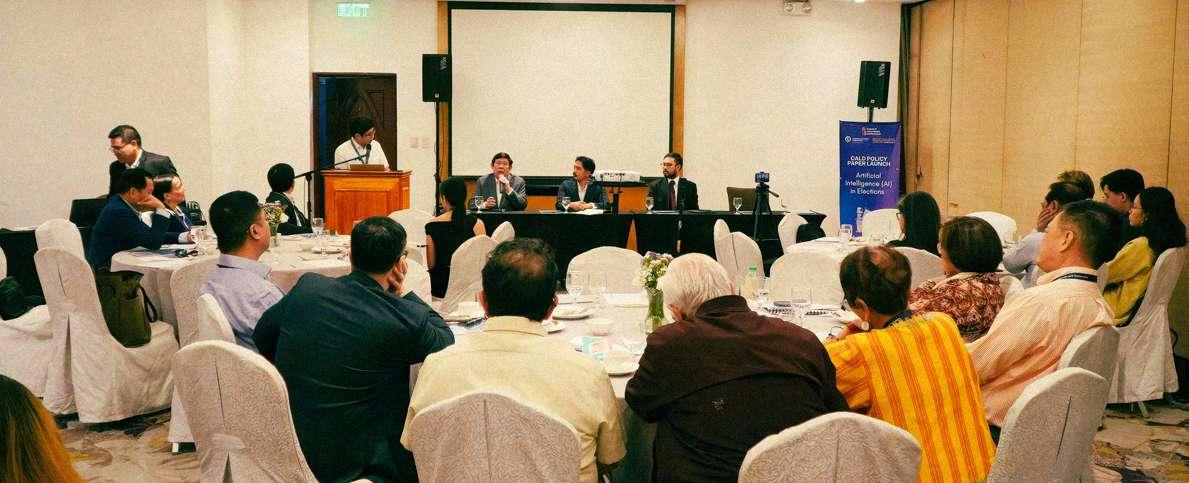
The paper identifies AI’s potential use in voter engagement, voter-data analysis, party mobilization, and election administration, but also warns of risks such as bias, misinformation, digital divide, and cybersecurity threats.
Drawing on election experiences in Indonesia, South Korea, and Taiwan, it notes that AI has been used for the efficient conduct of elections and creative voter engagements in these countries. But, says the study, AI has also been employed in widespread misinformation campaigns, particularly through deepfakes, which have eroded public trust in political candidates and the electoral process at large.
WR Numero CEO and President Cleve V. Arguelles, who presented the paper’s findings at the launch, remarked, “AI is revolutionizing elections and politics in East and Southeast Asia. It’s not just changing how campaigns operate, but is reshaping the entire electoral process. With these new opportunities come significant challenges we need to address.”
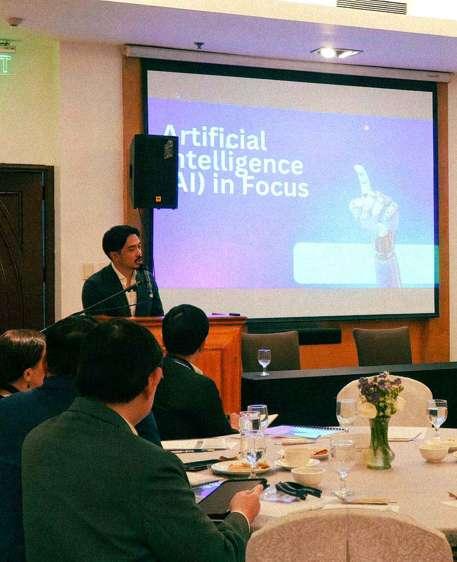
Dr. Julio Teehankee of De La Salle University Manila meanwhile pointed out, “The intersection of AI and politics offers a promising avenue to rejuvenate democratic processes through innovation and enhanced engagement. However, these advancements must not compromise the core tenets of democracy.”
Indeed, this is why the policy paper pushes for the development of comprehensive legal and policy frameworks, adoption of internal organizational guidelines, and collaboration between tech developers and independent auditors, while emphasizing AI explainability and sovereignty.
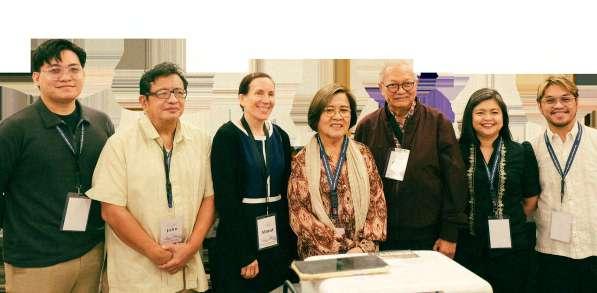
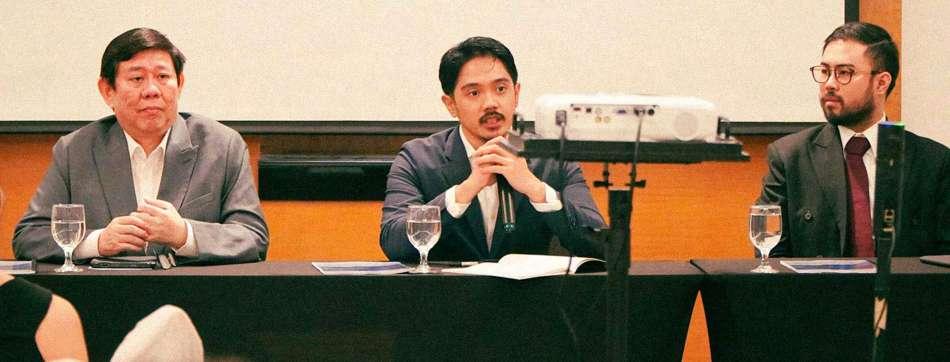
Alvin Carpio, founder of the online School of Social Justice, also put out this reminder: “When thinking about policy—as policymakers, as politicians and as people going out there—we need to think of the human side of artificial intelligence.”
CALD Chairperson Mardi Seng, for his part, acknowledged the risks that come along with the opportunities brought by AI in elections. Yet he also indicated that AI could not and should not be ignored, saying, “As liberals and
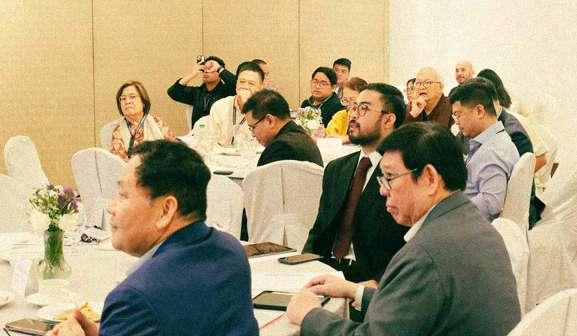
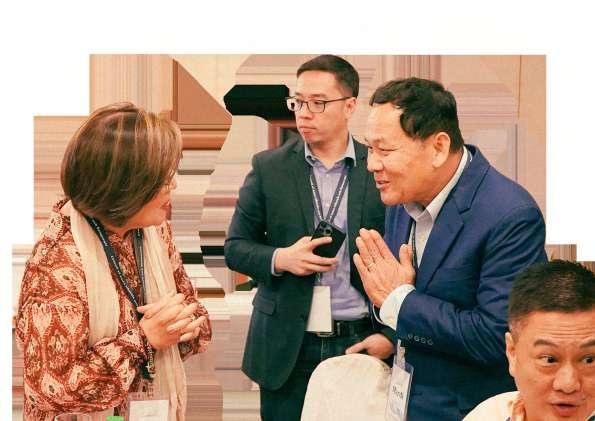

William Lai Elected as Taiwan President
Congratulations to William Lai of our member party, the Democratic Progressive Party (DPP), on being elected as President of Taiwan.
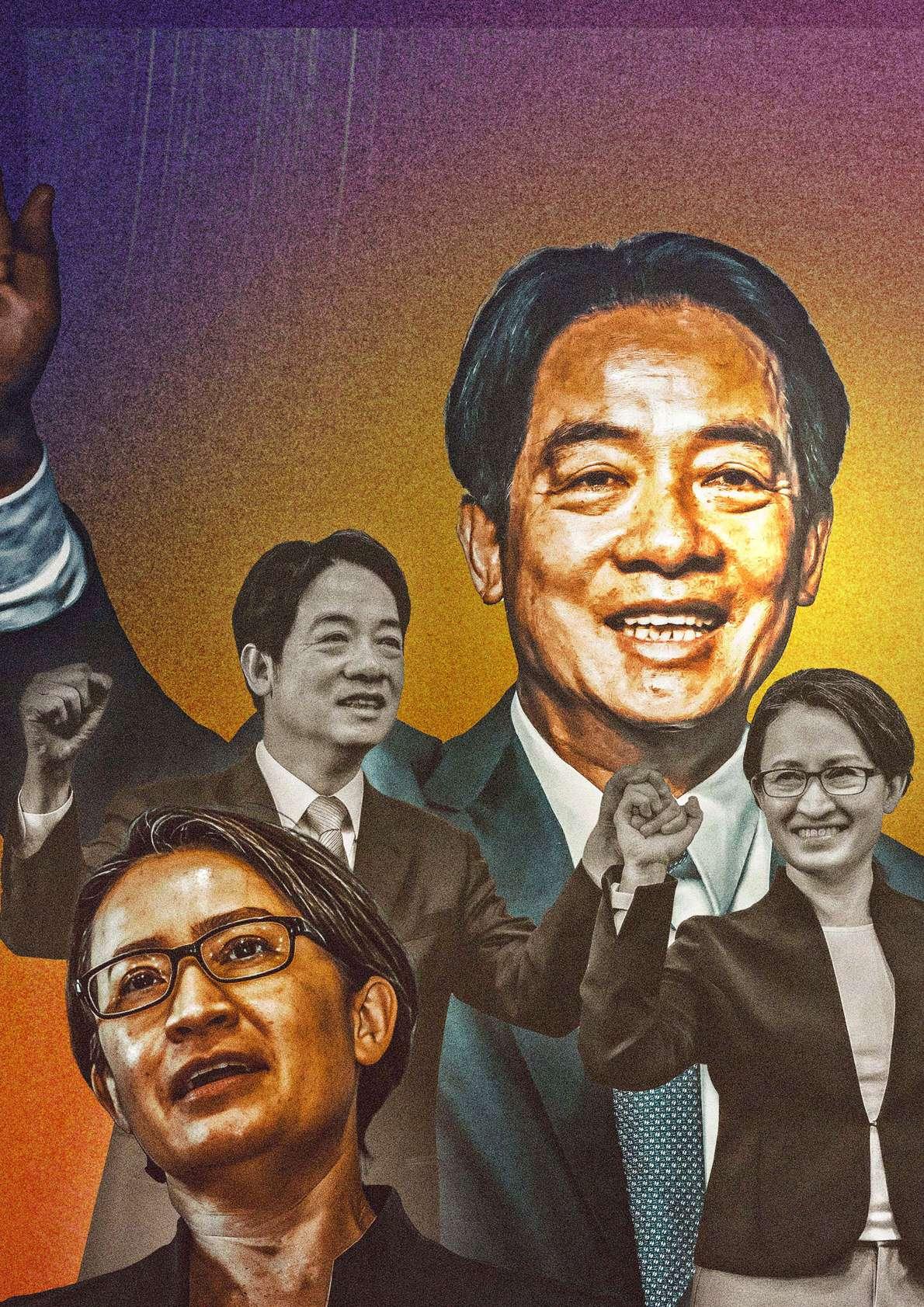
Bi-Khim Hsiao Elected as Taiwan Vice President
Heartfelt congratulations to former CALD Chairperson Bi-khim Hsiao of the DPP on her election as Vice President of Taiwan.
CALD Chair Mardi Seng Elected as Senator of Cambodia
We proudly celebrate the election of CALD Chairperson Mardi Seng of the Candlelight Party as a Senator of the Kingdom of Cambodia.
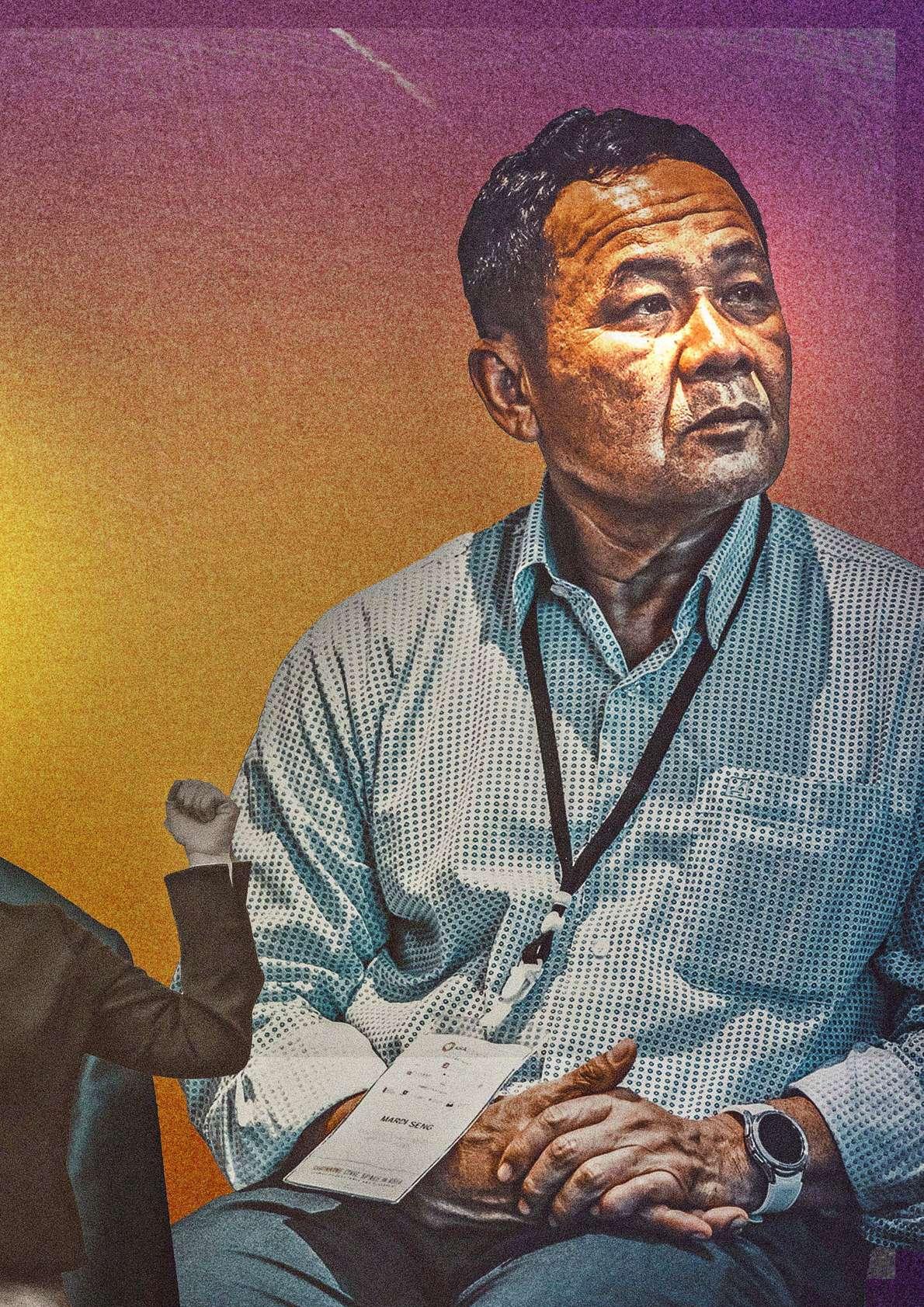
CALD Joins the Asia Democracy Network
We are thrilled to announce that CALD is now a proud member of the Asia Democracy Network, further strengthening our commitment to democratic collaboration in the region.
PDIP Wins Big in Indonesia’s Legislative Elections
Congratulations to the Indonesian Democratic Party of Struggle, our member party, for winning the most votes in Indonesia’s legislative elections.
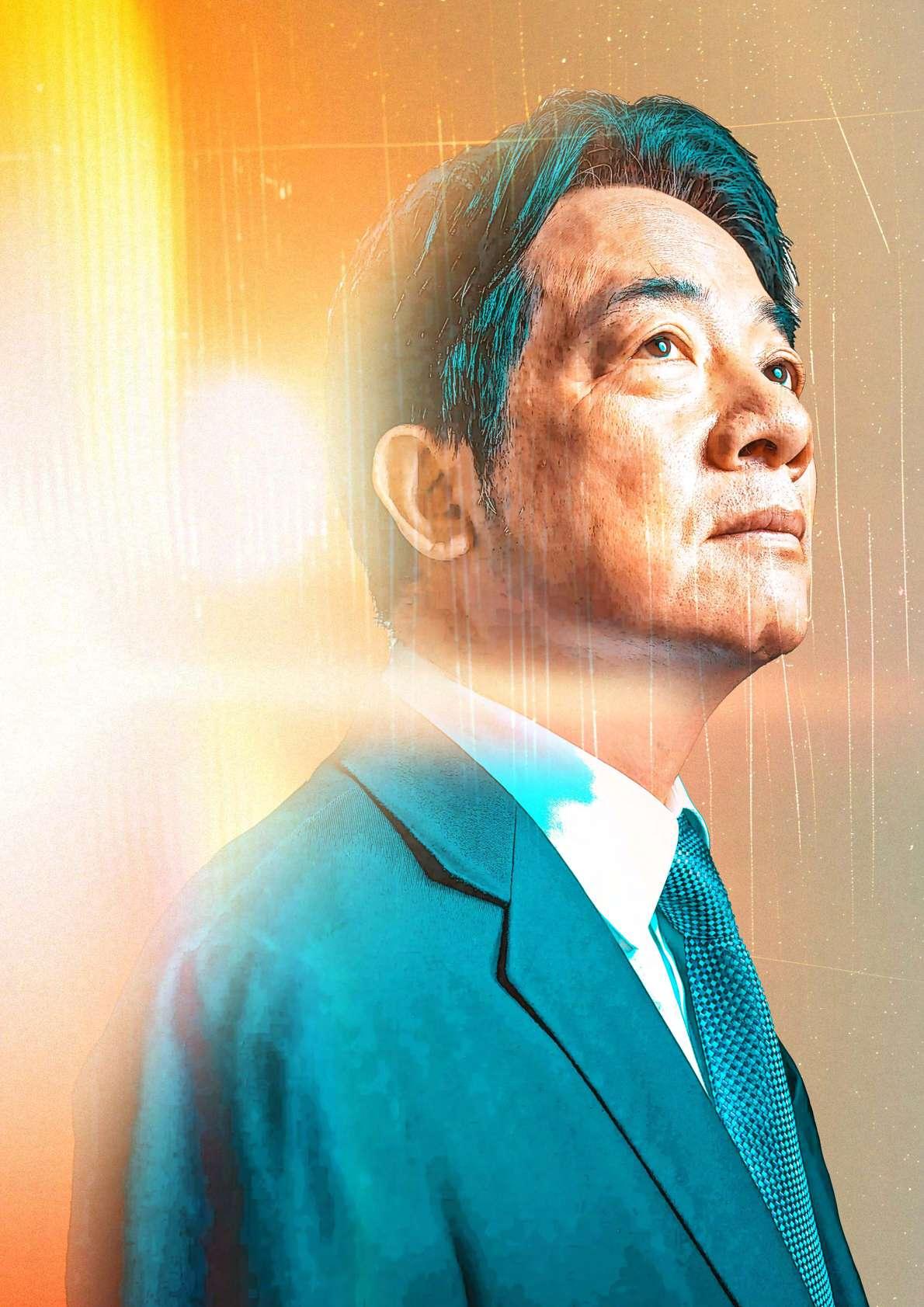
“Peace is priceless, and war has no winners.”
William l ai
Taiwan PresidenT
Building a Democratic, Peaceful, & Prosperous New Taiwan
Inaugural address delivered on 20 May in Taipei, Taiwan
When I was young, I was determined to practice medicine and save lives. When I went into politics, I was determined to transform Taiwan.
Now, standing here, I am determined to strengthen the nation. With an unwavering heart, I accept the responsibility the people have entrusted to me as the 16th-term president of the Republic of China. In accordance with the Republic of China Constitution system, I will take on that solemn responsibility of leading the nation bravely forward.
On this day in 1949, martial law went into effect in Taiwan, and Taiwan plunged into a dark era of authoritarian rule.
On this day in 1996, Taiwan’s first democratically elected president took the oath of office, conveying to the international community that the Republic of China Taiwan is a sovereign, independent nation in which sovereignty lies in the hands of the people.
On this day in 2024, having completed our third transition of political power, Taiwan officially commences, for the first time, the third consecutive term of the same political party in office. We also set sail into a new era that is full of challenges, yet also brimming with limitless hope.

This journey came about as a result of the valiant sacrifices and devotion of the many generations of people of this land. Although it was an arduous one, we made it through.
Now, we not only witness the beginning of a new administration, but also usher in another hard-earned victory for democracy.
Many people have interpreted my and Vice President Bi-khim Hsiao’s election victory as “breaking the eight-year curse,” referring to the fact that no political party has been able to remain in office for over two terms. But the reality is that in a democracy, the people have the final say. There is no such thing as a “curse” in any election. It is simply that the people put the ruling party under the toughest of tests, choosing the nation’s future in the most genuine way.
I want to thank former President Tsai Ing-wen, former Vice President Chen Chien-jen, and the administrative team for their hard work over these past eight years. You have all helped build a solid base for Taiwan’s development. Let’s give them a big round of applause!
I also want to thank my fellow citizens once again for your support, for refusing to be swayed by external forces, for resolutely defending democracy, for pressing
onward without turning back, and for turning a new page in Taiwan’s history.
Every day of my term, I will strive to prove myself as someone in whom you can trust and count on, by acting justly, showing mercy, and being humble, and by treating our people as family. The new administration will work tirelessly and to the best of our ability, as all the nation’s people put us to the test. We will also pursue continuous reform, shaping a new face for Taiwanese politics.
Coordination and cooperation between the executive and legislative branches to advance national policy
In February this year, a new Legislative Yuan was sworn in. This is the first time in 16 years that no party has an absolute majority. In the face of this new political landscape, some are feeling anticipation, while others are anxious.
I want to say to everyone that this new structure is a result of the people’s choice. Looking at it with a different frame of mind, a lack of absolute majority means that the ruling and opposition parties are now all able to share their ideas, and that we will be undertaking the nation’s challenges as one.
However, Taiwan’s people have high expectations for rational governance among political parties. Apart from
competition, parties should also believe in cooperation. Only then can the nation continue down a stable path.
The Legislative Yuan should observe procedural justice. The majority should respect the minority, while the minority accepts majority rule. Only then can we avoid conflict and maintain a stable and harmonious society.
In a democratic society, the interests of the people come first; that is the root of democracy. Likewise, national interests come before the interests of parties; that is the sacred duty of each political party. When ruling or opposition parties put forth legislation that conforms with our Constitution, when we uphold the spirit of “people above all” and “nation above party,” national policy will naturally and smoothly progress.
Premier Cho Jung-tai (卓 榮泰) will lead the Cabinet, and prioritize solving issues that benefit society and reflect consensus among ruling and opposition parties. He will respond to public opinion and address the issues people care about with proactive efforts and innovative thinking, and thus serve the people of Taiwan.
Today recovery work following the 3 April earthquake is still underway. I would like to once again express my sympathy and condolences to the victims and their families. I also want to thank all our citizens who have assisted in the earthquake response and reconstruction efforts, as well as the international community for their concern and support.
The central government has already drawn up plans to funnel NT$28.55 billion into reconstruction and industry stimulus. This will help the people of Hualien return to their normal lives as quickly as possible.
I have high hopes for the future of cooperation between the central and local governments, as well as coordination between the executive and legislative branches. I also hope to work hard alongside all the people of Taiwan to further entrench our democracy, maintain peace in the Indo-Pacific, and boost global prosperity.
Democratic Taiwan as a global beacon
My fellow citizens: Democracy, peace, and prosperity form Taiwan’s national roadmap. And they are also our links to the world.
As an important link in the global chain of democracies, a glorious era of Taiwan’s democracy has arrived.
Since Taiwan first held direct presidential elections, we have grown to become one of the world’s most vibrant democracies. We have continued to enhance human rights, and show the world our values of democracy and freedom.
“Taiwan is not just opening a door to the world — Taiwan is already on the world’s center stage.”

Taiwan was the first country in Asia to legalize same-sex marriage. Taiwan showed that democracy outperforms authoritarianism in fighting the pandemic. Whether in terms of democracy or freedom, Taiwan is consistently highly ranked among Asian nations. Democratic Taiwan is already a global beacon. And this honor belongs to all the people of Taiwan.
As we move forward, my administration will continue using Taiwan’s democratic vitality as a force for good, to promote national development and deepen international cooperation.
In terms of internal affairs, I will value meritocracy and uphold honesty and diligence. I will practice democratic governance and establish an open government. In the spirit of transparency and rule by the people, I encourage the populace to participate in public policy, and will continue to promote a voting age of 18. Together, we will fulfill our vision for our nation.
As for international affairs, we will continue working with other democratic nations to form a democratic community, and share our experiences across a range of fields. We will work together
to combat disinformation, strengthen democratic resilience, address challenges, and allow Taiwan to become the MVP of the democratic world.
Democratic Taiwan as a pilot for global peace
Peace is priceless, and war has no winners. Next year, we will mark the 80th anniversary of the end of the Second World War. As with other nations, Taiwan walked a difficult path for post-war revitalization, before getting to where we are today. No one wants these achievements to be destroyed by war.
Today Russia’s invasion of Ukraine and conflict between Israel and Hamas continue to shake the whole world. And China’s military actions and gray-zone coercion are considered the greatest strategic challenges to global peace and stability.
Taiwan is strategically positioned in the first island chain, and what affects us here affects global geopolitical development. Even as early as 1921, Chiang Weishui (蔣渭水) said that Taiwan is a frontline guardian of world peace. Now, in 2024, Taiwan’s role is even more significant. There is already a strong international consensus that peace and stability in the Taiwan Strait are indispensable to global security and prosperity.
To adapt to today’s complicated international landscape, countries around the world have been actively cooperating to maintain regional peace and stability. Just last month, the United States made into law the Indo-Pacific Security Supplemental Appropriations Act, 2024. This will provide the Indo-Pacific region with additional security and assistance, thereby supporting the peace and stability of the Taiwan Strait.
We thank nations around the world for their consideration and support for Taiwan. We would also like to declare to all that democracy and freedom are Taiwan’s unwavering commitments. Peace is the only option. And prosperity, gained through lasting peace and stability, is our objective.
The future of cross-strait relations will have a decisive impact on the world. This means that we, who have inherited a democratic Taiwan, are pilots for peace. Our government will uphold the Four Commitments, neither yield nor provoke, and maintain the status quo.
I also want to call on China to cease their political and military intimidation against Taiwan, share with Taiwan the global responsibility of maintaining peace and stability in the Taiwan Strait as well as the greater region, and ensure the world is free from the fear of war.
Taiwanese are a peace-loving people who treat others with kindness. I have always believed that if the leader of a country puts the people’s welfare above all, then peace in the Taiwan Strait, mutual benefits, and prosperous coexistence would be common goals.
Therefore, I hope that China will face the reality of the Republic of China’s existence, respect the choices of the people of Taiwan, and in good faith, choose dialogue over confrontation, exchange over containment, and under the principles of parity and dignity, engage in cooperation with the legal government chosen by Taiwan’s people. This can start from the resumption of tourism on a reciprocal basis, and enrollment of degree students in Taiwanese institutions. Let us together pursue peace and mutual prosperity.
My fellow citizens: As we pursue the ideal of peace, we must not harbor any delusions. So long as China refuses to renounce the use of force against Taiwan, all of us in Taiwan ought to understand, that even if we accept the entirety of China’s position and give up our sovereignty, China’s ambition to annex Taiwan will not simply disappear.
In face of the many threats and attempts of infiltration from China, we must demonstrate our resolution to defend our nation, and we must also raise our defense awareness and strengthen our legal framework for national security. This means actively promoting the Four Pillars of Peace action plan: strengthened national defense; improved economic
security; stable and principled cross-strait leadership; and values-based diplomacy. By standing side by side with other democratic countries, we can form a peaceful global community that can demonstrate the strength of deterrence and prevent war, achieving our goal of peace through strength.
Democratic Taiwan as a force for global prosperity
Taiwan needs the world, just as the world needs Taiwan. Taiwan is not just opening a door to the world—Taiwan is already on the world’s center stage.
As we look toward our future, we know that semiconductors will be indispensable. And the AI wave has already swept in. Taiwan has already mastered advanced semiconductor manufacturing, and we stand at the center of the AI revolution. We are a key player in supply chains for global democracies. For these reasons, Taiwan has an influence on global economic development, as well as humanity’s well-being and prosperity.
My fellow citizens: The future of the Republic of China Taiwan will be decided by its 23 million people. The future we decide is not just the future of our nation, but the future of the world.
We must walk on the right path, and our industries must make every effort, so that we may be a force for global prosperity. With every step forward that Taiwan takes, the world takes a step forward with us.
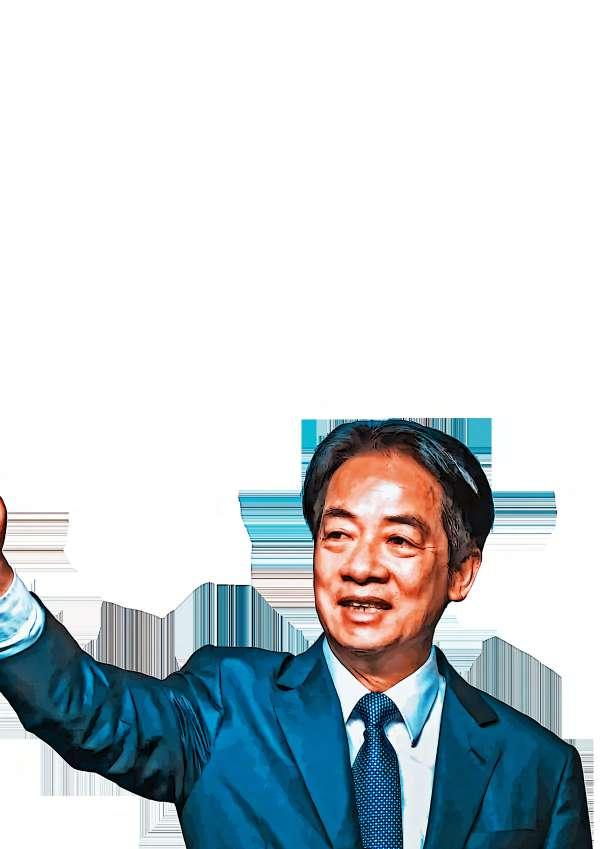
When I served as premier and vice president, I visited the various industries throughout Taiwan. I know well what our industry needs, and also what it is capable of. So, going forward, the government, working closely with the private sector, will take a threefold approach to further Taiwan’s development.
The first is having a clear view for our future, and making Taiwan smart and sustainable.
As we face the dangers of climate change, we must be resolved in our transition to net-zero emissions by the year 2050. As we meet the global challenges of adopting more and more smart technologies, we in Taiwan, a “silicon island,” must do all we can to expedite Taiwan’s transformation into an “AI island.” We must adapt AI for industry and step up the pace of AI innovation and applications. We must also adapt industry for AI and use AI’s computational power to make our nation, our military, our workforce, and our economy stronger.
It is similarly crucial that we develop an economic model driven by innovation. Through our two-pronged approach of promoting digital transformation and net-zero transition, we will assist small and medium-sized enterprises (SMEs) as they upgrade and transform, and we will seek inclusive growth, so as to create a new Taiwan that is smarter
and more sustainable—a second Taiwan Miracle.
While we invest in innovation and nurture the next hidden champions, we must also make bold investments in quantum computing, robotics, the metaverse, precision medicine, and other advanced technologies, thus giving our young people the opportunity to pursue their dreams and solidifying Taiwan’s leading position in the future global landscape.
The second is setting our sights on the space industry while further developing our strengths as a maritime nation.
Our sights are set on making Taiwan the Asian hub of UAV supply chains for global democracies, and developing the next generation of medium—and low-orbit communications satellites, bringing Taiwan’s space and aerospace industries squarely into the international sphere. At the same time, we will also explore and develop our strengths as a maritime nation, deepen our connections with the ocean, and invest more in marine science and technology research, thereby driving the development of our maritime industries. Altogether, this will make Taiwan a much stronger nation, and it will open up new horizons for the development of Taiwan’s economy and industry. The possibilities are truly limitless.
The third is to help our enterprises expand their presence and market internationally.
Taiwan has officially applied to join the Comprehensive and Progressive Agreement for Trans-Pacific Partnership (CPTPP), and we will continue to engage actively in regional economic integration. We will endeavor to sign bilateral investment agreements with other democracies around the world and further deepen our trade partnerships. We will also work to resolve the carbon tax issue and thus open the path for further industrial development.
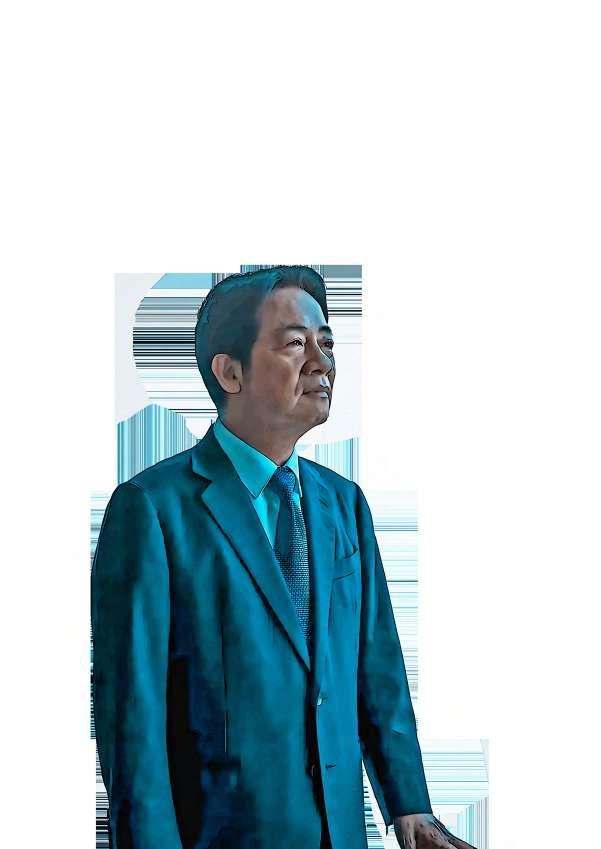
Taiwan must hold firm its key position in the global supply chain and seize the business opportunities that come as a result of geopolitical changes. We aim to develop Five Trusted Industry Sectors, namely semiconductors, AI, military, security and surveillance, and next-generation communications. We also aim to improve the investment environment, welcome Taiwanese businesses abroad to come back and invest in Taiwan, and encourage local firms to expand their investments and set even deeper roots here in Taiwan.
Here today, I want to assure our friends from all different sectors: Just as you all are committed to be the best in your respective areas, the government is also committed to providing assistance so that you can expand your global presence and international markets from a solid base here in Taiwan.
Taiwan is eminently capable of being a thriving global economic powerhouse. Wherever the sun shines around the world, there are Taiwanese companies stimulating local development, while also enriching the livelihoods of the Taiwanese people.
Sympathizing with the joys and the concerns of the people
It is my firm belief that the fruits of economic development ought to be enjoyed by all the people of our nation. In the coming days of my presidency, I will launch the National Project of Hope and expand investment in society, through which I aim to shape a Taiwanese society with more love and moral courage. It will be a society in which young people have a vision of hope, people in their prime have the means to realize their dreams, the elderly can enjoy their days in happiness, and the disadvantaged can find the care they need. A society in which all people, at every stage of life, will be able to receive from the government the support they need.
Childcare, long-term care, and social-housing services will continue to be expanded. Prices of commodities and housing, as well as the wealth gap, will be addressed. The safety and security of our food, our roads, our schools, and our social safety net will all be enhanced. And our reform efforts in education, the judicial system, and transitional justice will continue.
I understand the concerns and expectations of the people of Taiwan. As to the issues you are concerned with and the reform society needs, the
government will do its utmost to achieve solutions.
Everyone is working hard for higher pay. I will work to drive industrial upgrading and create an even better wage environment.
Everyone is hoping for more effective public safety. I will crack down on corruption and organized crime, guns, drugs, and fraud.
Everyone is wanting a stable supply of electricity. I will initiate our second energy transition, push for the development of more forms of green energy and smart grids, and help to make our electrical power generation system more resilient.
Everyone is concerned about the financing of labor insurance. I repeat here today: Labor insurance will not fail under our government.
Everyone is stressing the importance of transportation safety. I will help create a human-friendly transportation environment, putting an end to Taiwan’s bad reputation as a “pedestrian hell.”
Everyone is hoping that the government can help lighten the load for family caregivers and work to solve the labor shortage issue. I will do my utmost to arrive at solutions.
All of us, as we walk into the future, want a more resilient Taiwan: a Taiwan that can respond adequately to such crises as infectious disease and natural disasters, a Taiwan that can quicken the pace of urban renewal and the repair of dilapidated and dangerous old buildings.
All of us are also hoping for a healthier Taiwan. With my own expertise in medicine, I hope to bring together the strengths of other fields to beat cancer. I will establish a ministry of physical education and sports development to bring sports and athletics more into the lives of the people. I will also ensure that our National Health Insurance system remains sustainable, which will help our people live longer and healthier.
The Taiwan of tomorrow will preserve its diverse ecosystem, its diverse ethnic culture, and achieve sustainability, to create a better nation.
The Taiwan of tomorrow will have a more diverse innovation economy, a more widespread use of digital technology applications. It will be more competitive and bilingual. It will have a stronger public support service system. It will be more respectful of gender equality. It will
ensure that the people are guaranteed their rights.
The Taiwan of tomorrow will allow each municipality to develop out of its own unique characteristics and promote revitalization of local industries. We will achieve the goal of a Taiwan with balanced development where all can live and work in peace and happiness.

“Democracy and freedom are Taiwan’s unwavering commitments. Peace is the only option.”
With greater solidarity, we become stronger as a nation
My dear compatriots, each and every one of you contributes a necessary part to our future development. In this era of globalization and wide-ranging competition, no one country can go it alone. And no society, if it is divided within, can successfully meet these challenges.
If we are united, we can walk with more confident strides. And when we support one another, our steps will take us further. For our nation to endure and progress, I will bring us together through the strength of democracy, for greater solidarity and a stronger nation.
I think it is apparent to us all: We have a nation insofar as we have sovereignty. Right in the first chapter of our Constitution, it says, “The sovereignty of the Republic of China shall reside in the whole body of citizens,” and that “(p) ersons possessing the nationality of the Republic of China shall be citizens of the Republic of China.” These two articles tell us clearly: The Republic of China and the People’s Republic of China are not subordinate to each other. All of the people of Taiwan must come together
to safeguard our nation. All our political parties ought to oppose annexation and protect sovereignty, and no one should entertain the idea of giving up our national sovereignty in exchange for political power.
As more countries around the world publicly express their support for Taiwan’s meaningful international participation, there is increasing proof that Taiwan is a Taiwan of the world, that Taiwan is a worthy and reliable force for global peace and prosperity.
So long as we identify with Taiwan, Taiwan belongs to us all—all of the peoples of Taiwan, regardless of ethnicity, irrespective of when we arrived. Some call this land the Republic of China, some call it the Republic of China Taiwan, and some, Taiwan. But whichever of these names we ourselves or our international friends choose to call our nation, we will resonate and shine all the same. So let us overcome our differences and stride forward, with our shared aspirations, to meet the world.
Taiwan greeting a new world, the world greeting a new Taiwan
As Taiwan engages more closely with the rest of the world, we welcome the world to come closer to Taiwan. Many new residents and foreign nationals have come and made Taiwan their home, writing a new chapter in Taiwan’s story. To all of you, I give my sincere thanks and respect.
Here today are many friends who have come quite a long way from their countries to join us. And many overseas compatriots are also here showing their support with their presence. So, why don’t we let them all know how much we appreciate their support? Please give them a round of applause!
Tonight we will be welcoming our distinguished guests at a state banquet in Tainan, the city where 1624 marked Taiwan’s links to globalization. Now, as we stand here 400 years after that historical moment in Tainan, we in Taiwan must all demonstrate confidence and bravely set course for the new world, so that the world may embrace a new Taiwan.
On that note, I want to ask each fellow citizen to praise our mother Taiwan, the land that nurtures and supports us all, and to work together to protect her, honor her, let the world embrace her, and allow her the international respect she deserves as a great nation.
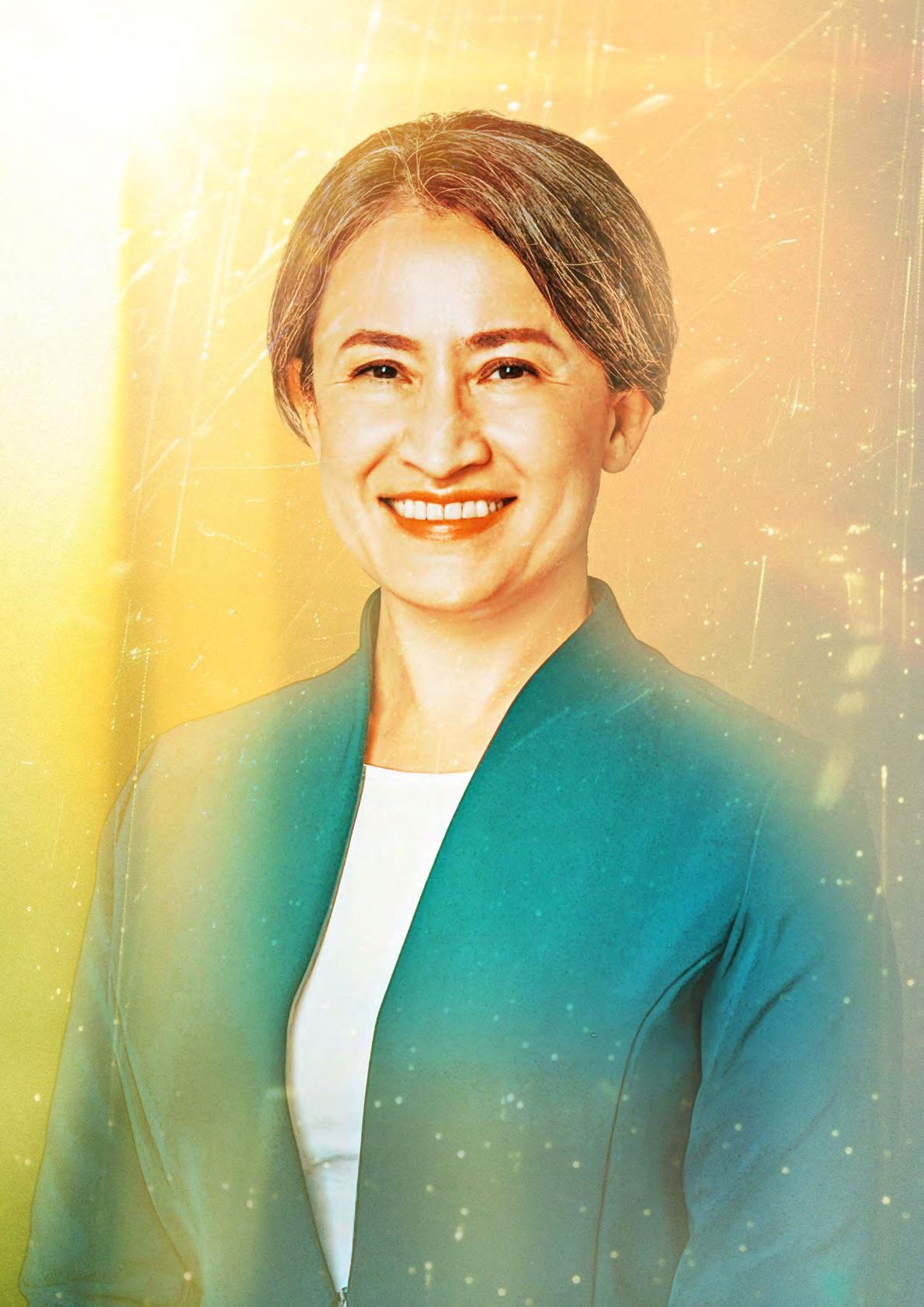
“Not only can Taiwan help, but Taiwan can lead.”
Can Taiwan Play aRoleLeadership in the Asia Pacific?
Closing keynote speech given on 6 May at the CAPRI 2024 Annual Forum in Taipei, Taiwan
I want to thank CAPRI Chair Shirley Lin for inviting me to address this annual forum. And more importantly, I also want to express my admiration for her leadership in founding CAPRI. non-partisan, Taiwan-based international think tank. Since its founding, CAPRI has already established close and much-needed partnerships with renowned research institutions around the world to ensure that the voices and interests of Taiwan are not left out in critical international discussions.
I’m honored also to address this audience, along with Ambassador James Gilmore III, whose staunch and unwavering support for Ukraine and its defense against aggression is admirable. Two weeks ago, the supplemental appropriations bill for Ukraine, Israel, and Taiwan were approved by Congress and immediately signed into law by President Biden.
I’m grateful to all who have advocated tirelessly for security assessment assistance. This bill demonstrates the continued commitment of the United States to supporting allies and partners in the face of geopolitical challenges. It is also a solid demonstration of the U.S. global leadership in the fight to defend democratic values and a rules-based international order. But beyond thanking our international friends for their support, it is important that as Taiwanese, we invest in building our own strengths first, through our own efforts in building a resilient Taiwan. We must have the confidence that Taiwan is worthy of galvanizing international support and that the success of Taiwan is also important to the world.
For today’s event, I was asked to address the rhetorical question of whether Taiwan can play a leadership role in the Asia Pacific. Of course, I’d say yes, Taiwan can lead.

Not only can Taiwan help, but Taiwan can lead. I must also say that not only can Taiwan play a leadership role, but Taiwan’s leadership is important to the world.
Why do I believe that Taiwan can play a leadership role?
First of all, Taiwan is an island of resilience, a society that has overcome hardship. Second, by overcoming hardships and challenges, Taiwan has built unique characteristics and strengths that put Taiwan squarely in the limelight as a beacon of global progress. Third, by making such progress, Taiwan’s success and prosperity are closely woven into global interests.
Taiwan has become an important contributor to the world in many ways and in multiple domains far beyond our borders. Let me elaborate on these points. In our 2022 10/10 address, President Tsai Ing-wen made a pledge to transform Taiwan into an island of resilience. Over the past two years, efforts across ministries and sectors have produced achievements in Taiwan’s economic, social democratic, and defense resilience.
Last year, Premier Chen Chien-jen came to this CAPRI Annual Forum, also addressing Taiwan’s resilience. We highlight the word “resilience,” and I like to use that a lot because Taiwan’s emergence is a journey against all odds. Taiwan is an island very much familiar with typhoons and earthquakes, mudslides, and droughts. We have not been endowed with the types of natural resources that have dominated the past century of global energy production, and the densely populated island has very little spare land for agriculture and industry.
Until recently, Taiwan’s people had survived the world’s longest one-party martial law system and centuries of governance by rulers transplanted from abroad. At
this moment, Taiwan is bombarded with cyberattacks, disinformation, and political interference, in addition to near-daily military incursions into our vicinity, all aimed at coercing and crippling the public will to safeguard our free and democratic way of life.
Against all these odds and long overshadowed by our larger neighbors, Taiwan’s remarkable story of perseverance and determination has propelled it onto the world stage. Despite facing numerous challenges, including diplomatic isolation, limited natural resources, and intense geopolitical pressures — and in addition to all the challenges that I just listed — Taiwan has forged a path to global leadership driven by its unwavering spirit and unrelenting pursuit of excellence.
Taiwan’s against-allodds journey is a testament to the power of human ingenuity, adaptability, and the spirit of collaboration. As we look closely at Taiwan’s evolution, it becomes clear that this underdog story is not just a tale of survival, but a blueprint for success and leadership in an increasingly complex and interconnected world. I believe that Taiwan’s leadership in the Asia Pacific can be highlighted in a number of areas, parallel to areas of resilience that the president ties.
“Taiwan’s against-allodds journey is a testament to the power of human ingenuity, adaptability, and the spirit of collaboration.”
As we strive to counter the evolving challenges of disinformation and political interference, the process of refining our own democracy and strengthening our institutions has not been easy, and we continue to build resilience on a path fraught with hurdles and dangers. It’s like one of those traditional Mario Brothers gaming roots. We’ve been navigating deadly traps and obstacles while at the same time withstanding punches and attacks from all sides with scars and wounds of frustration. Our democracy continues to move forward, steadily recharged with energy from a population determined not to go back to authoritarianism, and with hopes and expectations that we are not alone on this path.
Let me talk about Taiwan’s social leadership. Our political transition historically has opened doors to social activism. Taiwanese have
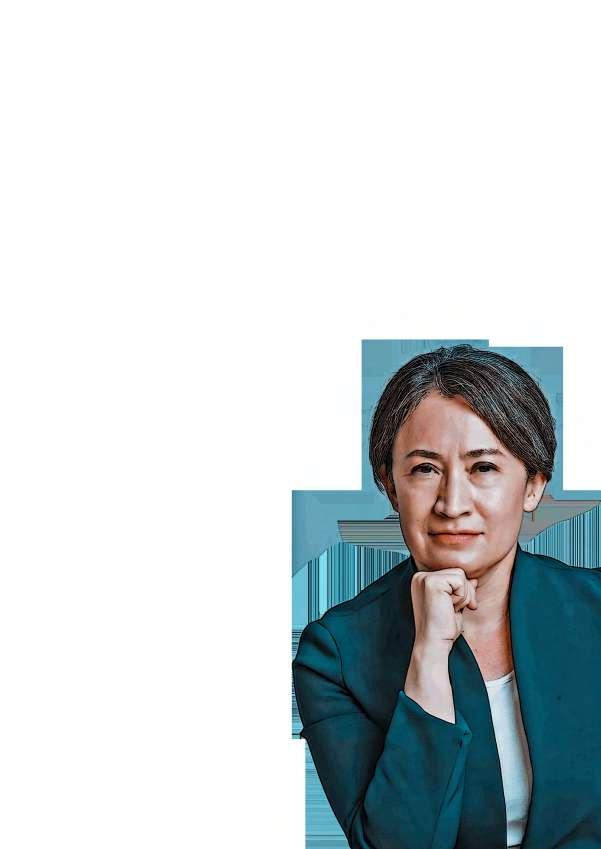
The administration has promoted political, social, and economic leadership. Let me first talk about Taiwan’s political leadership. And I’m not referencing politicians; I’m referencing Taiwan as a society and the leadership role that we as a people can play in the region. Our democratic transition is broadly recognized. Many of you are familiar with the international statistics that put Taiwan at the very top in this region in terms of political freedoms, basic human rights, free speech, and media. Since 1996, we the people of Taiwan have become masters of our destiny by choosing over and again our own domestic political leadership through free and fair elections. And despite the fierce domestic political competition, the Taiwanese people have persisted in ensuring that the political process is mostly peaceful and inclusive, intending to play a broader leadership role in the region.
Taiwan has also made itself a home base for an increasing number of international NGOs, think tanks, and media organizations that require a free political environment to function. Taiwan has taken the lead as well in sharing with others in workshops and exchanging practices for building media literacy.

also become leaders in social progress, as our government has endorsed the spirit of dialogue or diversity. Equity, inclusiveness, and accessibility—our society has also advanced to embrace social injustices that empower and make Taiwan a regional leader. Though far from reaching ideal standards, Taiwan’s advances in universal healthcare, accessibility, gender equality, LGBTQ rights, and labor rights inspire others in this region. And while we are so proud of Nymphia Wind winning a global drag queen competition, this is proof that Taiwan’s societal progress provides the best nutrients for both communities and individuals to thrive and shine, no matter who they are in the realm of societal resilience.
I also want to highlight Taiwan’s abilities in disaster response. We just heard in the last session some discussions on living among typhoons and earthquakes. We’ve been compelled to develop responses across the board in sheltering, search and rescue, water and power supplies, and recovery. We have built a model of public– private collaboration in preparedness units of our society — from volunteer firefighting and rescue organizations to religious charity groups — which have, together with different levels of government, formed an effective lattice network that is the foundation of stability and security in Taiwan.
Every challenge and threat along the way compels us to be constantly on alert and consistently improving ourselves and beyond better securing our people’s safety. The Taiwanese people also lead the region in being one of the most generous suppliers of humanitarian assistance and charity—from donating PPE around the world during the COVID-19 pandemic to providing hot meals to natural disaster-affected zones across the region.
Wherever there is a disaster or humanitarian need, there will be some form of Taiwanese help, either public or private, or both. Most often, despite the hard reality of our international isolation, Taiwan has managed to lead in our soft power as a force for good, extending the influence of kindness and humanity across the region.
Now let me talk about the third area of economic leadership.
Taiwan was once synonymous with low-cost, high-volume production, but we have reinvented ourselves as a hotbed of high-tech innovation, leveraging our strengths in research and development, and design engineering to create a thriving ecosystem of startups and entrepreneurs. This pivot has been instrumental in propelling the island to the forefront of the global economy, driving growth, creating jobs, and fostering a culture of innovation that is increasingly being recognized on the global stage.
While international headlines tend to focus on the highly accomplished tech sector and the giants in our IC industries, I want to point out that Taiwan’s strengths remain in our highly innovative and nimble small and medium-sized enterprises, which together form an ecosystem of growth. This growth is fueled by a combination of government initiatives, strategic investments, and deep-seated commitment to education and workforce development.
As a result, Taiwan has emerged as a magnet for international talent, attracting not only entrepreneurs, but also those who cherish the free and open environment in which innovation can take place. At the same time, the spirit of always striving to be better is innate in the character of many Taiwanese people. It compels us to identify and cope with existing challenges, too, such as the equity of growth in other services and traditional sectors, addressing wage and income gaps, demographic challenges, affordable housing, and accessibility to new digital and AI tools. On this front, Taiwan seeks to lead through innovation, but is also open to learning from others.
Let me conclude by saying that as the world grapples with the complexities of the 21st century, Taiwan’s story of resilience and adaptability has fueled its self-confidence to lead by example, offering inspiration to other nations seeking to overcome their own hardships and challenges.
At its core, the Taiwan template is built on a foundation of resilience forged in the crucible of adversity and shaped by our precarious existence in the shadow of a giant neighbor. This resilience has enabled Taiwan to navigate the treacherous waters of global politics, to adapt to and be ahead of the shifting tides in the global economy, and to innovate in the face of uncertainty.
It is a template that emphasizes the importance of human capital and investing in education and skills to create a highly adaptable and entrepreneurial workforce. It is a model that recognizes the value of social cohesion, promoting a sense of shared purpose and collective responsibility that has enabled Taiwan to build an inclusive and equitable society.
Looking ahead, President Lai and I are committed to leveraging these assets as we work to forge stronger partnerships with like-minded societies around the world.
I thank you for your interest in our vision, and I thank you for your interest in molding a path forward for Taiwan as a leader in this region. I look forward to continuing collaboration not only with CAPRI, but with all the forces of our society who are present here today, as well as with our international partners.
Twists, Turns, and Triumphs
maria leonor ‘leni’ roBredo
Former Vice PresidenT oF The PhiliPPines
Keynote speech given on 3 August at the “Growing Your Network” session of the CALD Transformative Academy for Developing Empowered Leadership (CTADEL) held in Singapore
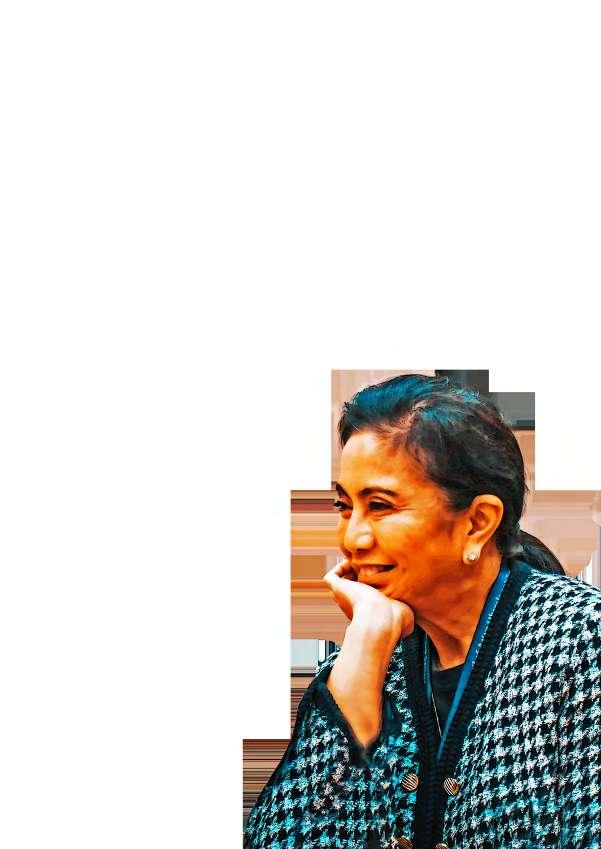
My assignment this afternoon is to share with you my journey as a woman, and political leader in the Philippines. But more importantly, to share with you tips on how we were able to manage networking when I was a member of Congress and when I was vice president.
I ran for vice president under the Liberal Party of the Philippines in 2016. I was already a member of the Council of Representatives. I served for a term but I was not actually a card-bearing member of the Liberal Party. It was my husband who was a long-time member of the Liberal Party. It was my husband who was a politician in my family. In all the years that my husband was a politician, I was a human-rights lawyer.
Right after passing the Bar, I became a public attorney. After that, I switched to civil society. I became a lawyer for a nongovernment organization called Sentro ng Alternatibong Lingap Panligal. It’s actually a nongovernment organization of lawyers, serving the most marginalized sectors of society: farmers, fisherfolk, informal settlers, women and children, indigenous people. That was my life’s work for a long time.
At the time that I was a human-rights lawyer, my husband was serving as mayor of our city in the Philippines. The name of the city is Naga; it’s about 400 kilometers South of Manila. My husband became mayor for six terms. Three consecutive terms first, then he took a break, and then another three consecutive terms. In the Philippines, there’s a limit of three consecutive terms at a time for politicians.
When my husband was mayor, there was no plan at all that I would one day take his place. In the Philippines, political dynasties are very prevalent. Most local government units in the Philippines are being run by family dynasties. But there was no such plan for our family. I was very much content with the kind of life I was leading as a human-rights lawyer.
Then in 2010, after his sixth term as mayor, my husband was appointed by then President Benigno ‘Noynoy’ Aquino III as Secretary of Interior and Local Government. But on his second year as a member of the Aquino Cabinet, my husband perished in a plane crash. He was then was on his way home from an official event in the south of the Philippines.
My husband passed away as our country was preparing for elections. He was the leader of the local chapter of the Liberal Party. When he suddenly passed, the party was suddenly in shambles. They had already planned who would be running for which position, but after my husband died, a lot of them suddenly didn’t want to abide by the decision of the party. There were positions where several party members already decided to run against each other. It was a very, very important election, especially in our district, because we were fighting a huge political dynasty. This clan had been ruling our province for the longest time — even until now. And that particular district was an opportunity for us because the clan’s patriarch, who was the incumbent, was finishing his term and he was asking his wife to take his place.
We all had already agreed on a candidate. But on the last day of filing for certificates of candidacy, our designated nominee suddenly called a press conference and announced that he was withdrawing
his candidacy and endorsing me instead. There was no plan for me to run. It was the last day of filing for certificates of candidacy, but suddenly I found myself a candidate just before our local commission on elections closed.

“Most of the time, difficulties are actually opportunities.”
I was not ready at all. Our district was our city plus 10 other towns. My husband never ran outside of our city, so there was no political organization outside of it. The political organization was only in our city and I had to start from scratch for that beyond it. But I guess I benefited from all the goodwill that my husband garnered; even if we were running against a well-oiled political machinery, against the very strong political dynasty, I won by a landslide.
So that’s how I became a representative of the third district of Camarines Sur, the province where I come from. I won over the matriarch of the political dynasty. In the Philippines, the terms of office are only for three years for local officials and for members of the House of Representatives. I told our candidate who was supposed to run instead of me: “I am here only for one term so you have to prepare that you will be the next candidate because I am not cut out for this. I want to go back to what I was doing before.”
At the time I was thinking that I would pass bills that would
further the legacy left behind by my husband. I was fighting for a lot of bills on anti-corruption. I was fighting for bills on transparency of government, accountability of public officials, and empowerment of the people. It was a very difficult time for me because that was when I realized that there were so few of us who were pushing for those kinds of bills.
As I was finishing my time in Congress and planning to go back to private life, I was endorsed by the Liberal Party to run for the vice presidency. Just like when I ran for the House of Representatives, I found myself as a vice-presidential candidate at the last minute.
There were six of us vying for the post, and I was the lone female. I was running against five incumbent senators. My main rival then is now our president. I beat him by a hairline after a very controversial election in 2016.
One thing that is different about our system is that in the Philippines you elect the president and the vice president separately. Our constitution provides that the vice president is elected directly by the people, as is the president. There have been several instances in the Philippines when the truly elected president and vice president come from different political parties. And even in such a case, our constitution allows the President to have the vice president take on a Cabinet position, aside from being second in command.
Rodrigo Duterte won the presidency in 2016. I don’t know if all of you are aware of who President Duterte is, but he was one of — if not the most — authoritarian presidents the Philippines ever had. The tradition in the Philippines is there is a joint inauguration for the President and the Vice President. We were already preparing for a joint inauguration, but a week before the event, we were told, “The President does not want you in the inauguration.” So in that last week before the inauguration, we had to scamper to plan for a simple, separate vice presidential
inauguration. That for me was the best signal that the next six years were not going to be easy for me.
Initially, the President did not want to talk to me. I had been asking to pay him a courtesy visit. The plan was to offer the President my cooperation as his partner in governance, but I was never given that time. When I chanced upon the President at a military event, I told him, “I have been asking for time to see you but until now I haven’t been given that time.” And lo and behold, he said, “Okay.” He called his special assistant and he said, “Schedule her.” So I was able to see him. During that visit, he offered me a Cabinet post, and I became the Housing Secretary.
In the Philippines, Cabinet members are the President’s alter egos, and you are expected to do what the President tells you to do. At the time, the president’s bloody drug war was already ongoing. Many people were being killed in the name of the war against drugs. As Vice President and Cabinet member, I started speaking up and making known my opposition against the drug war. That didn’t sit well with the President. I was soon at the receiving end of a lot of harassment from the government. I became the most trolled public personality in the Philippines because the President had a huge disinformation machinery. I was also at the receiving end of a lot of persecution from the President himself. The Filipinos here can attest that in his speeches, the President would call me stupid. He would make very sexist remarks about me. At one point, you could even say that he wanted to see me dead. My daughters have also been at the receiving end of a lot of sexual harassment from the president’s supporters. That was how my six years of being vice president was like. But because I already had an inkling of the things to come my way right at the start, I was prepared for the eventuality that my office would not have the support of the government.
The Office of the Vice President of the Philippines has one of the smallest budgets of the entire bureaucracy. Its budget is only for salaries of the employees and operations of the office. If the sitting vice president would like to do projects of his or her own, help from the president is needed for the office to have a piece of the budget pie. But because the President hated me, I was already very sure that I would not have anything from the government. But it turned out to be the biggest blessing for us that we didn’t have to depend on the government. Because we were able to set up an anti-poverty program that we call Angat Buhay.
“The message is that the fight didn’t end with the elections. The fight is still here.”

“Angat Buhay” is a Filipino term that means “uplifting lives”. When we decided to roll out Angat Buhay, we wanted to do a lot of things for the marginalized sectors because that was where I was comfortable with. We wanted to work on education, on health, on welfare and development, on nutrition, on food security, on housing of women and children — but the problem was we didn’t have funds for it. So we conceptualized Angat Buhay in such a way that the Office of the Vice President would just be a bridge between communities needing help and organizations wanting to help.
The very first day that we rolled out Angat Buhay, we did a sort of “developmental speed dating,” where
we asked the communities that we chose to help, to pitch projects, and we asked our partners to go around and adopt these communities as their project beneficiaries. That was where our networking started, because we were partnering with a lot of communities, we were partnering with a lot of corporations and organizations who wanted to help. That was how Angat Buhay became bigger and bigger, such that, after my term as vice president, we decided to convert the program into a non-government organization. Angat Buhay is a nongovernment organization and we have thousands– hundreds of thousands — of volunteers all over the country. Angat Buhay may yet become the biggest volunteer network in the Philippines.
Because I was heavily trolled the six years I was vice president, we never expected that something would come out of my presidential candidacy in 2022. We were just trying to create a unified opposition ticket, but everyone was afraid of the President and didn’t want to join us. Yet there had to be a genuine opposition fighting the administration. So when we had no candidate who wanted to fight it out, I became one.
When I filed my candidacy, I was number six or number seven in the surveys. I was only at three to seven percent, so I thought there was never going to have any chance, much less an equitable chance. But because of what we started with Angat Buhay, the campaign turned out to be a huge movement, such that our rallies had millions of participants. It was the first ever campaign where we didn’t have to spend so much because people were just pitching in whatever they could to help. It was so unexpected that after the elections, even if we lost — we knew that we would lose — we were able to start something really big. Today we are two years into Angat Buhay, and every time that we mobilize our forces, it has been so easy to do so.
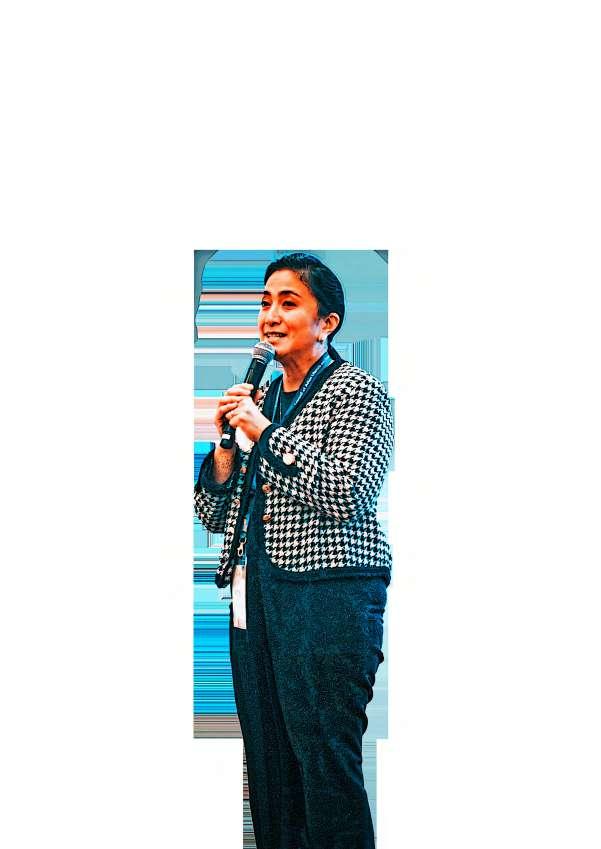
Two years ago, there was a typhoon. It was the first big flood after the elections. It only took a few Facebook posts to mobilize our supporters and everyone was there. We were able to set out to help with a huge network of volunteers who had responded to Angat Buhay’s call.
So what are the lessons?
Topmost would be that most of the time, difficulties are actually opportunities. It was what happened to us. We worked with very, very young people. My contemporaries were warning me that it would be difficult working with young people because they’re hard to manage. Well, all the staff that you hear about are young people. I was one of the few old people in the office and I depended on the young people to do all the work. We had always been credited with a lot of innovative and creative projects, but those weren’t by me. They were all by and from the young people we were working with. They were very frustrated with the kind of treatment that we were getting from the President and the rest of the administration when we were starting, but I told them that we had to look at it as an opportunity because we didn’t have a choice. And now, with the benefit of hindsight, I know I’m indebted to them. Also, if everything had been easy for us, perhaps we would not have performed in the way that we did. And the reason why we performed the way that we did was that, because we were all very competitive, we wanted to show certain people that even without your help, we would succeed.
Building trust is also important. To convince people and institutions to partner with us in our programs, we had to show that our office can be trusted. During my first year in office, we aspired for the Office to get an ISO certification. The reason for that is because we wanted to show people that we were serious in the work we do. We wanted to professionalize the Office. In the Philippines there are not a lot of government offices that apply for ISO certification because it’s a very tedious process. But we were able to do
it in our very first year. After getting the ISO certification, we wanted to excel as far as government audit was concerned. By my second year in office and until the very end — until my last year as vice president — we were getting the highest marks in government audit. We were able to show other government offices that it can be done. Not a lot of government offices get this kind of audit awards but we were able to. So again, sometimes adversity is our push to keep excelling in the things that we do.
Two years after I left office, we have been able to develop a lot of partnerships with government agencies, partnerships with nongovernment organizations, and partnerships with corporations. The groups that we were able to organize before are now helping us in all the things we are doing for the community. We are benefitting from the networking that we started during my term as vice president. The community is benefiting from these partnerships. We are doing a lot of capacity building, we are doing a lot of work on education, health, climate action, arts and culture. During the 2022 campaign, we had a lot of artists who were volunteering their efforts. Even after the elections they told us, “We will continue to volunteer.”
The message is that the fight didn’t end with the elections. The fight is still here. We are still a long way off from having the country we aspire to have. But we are very hopeful that if we are empowered as an assembly, we can do it.
Liberal-Democratic Values as Sources of Strength
leila
de lima
Former PhiliPPine JusTice secreTary and senaTor
Keynote speech at the “Knowing Your Values” session of the CALD Transformative Academy for Developing Empowered Leadership (CTADEL), held on 2 August in Singapore
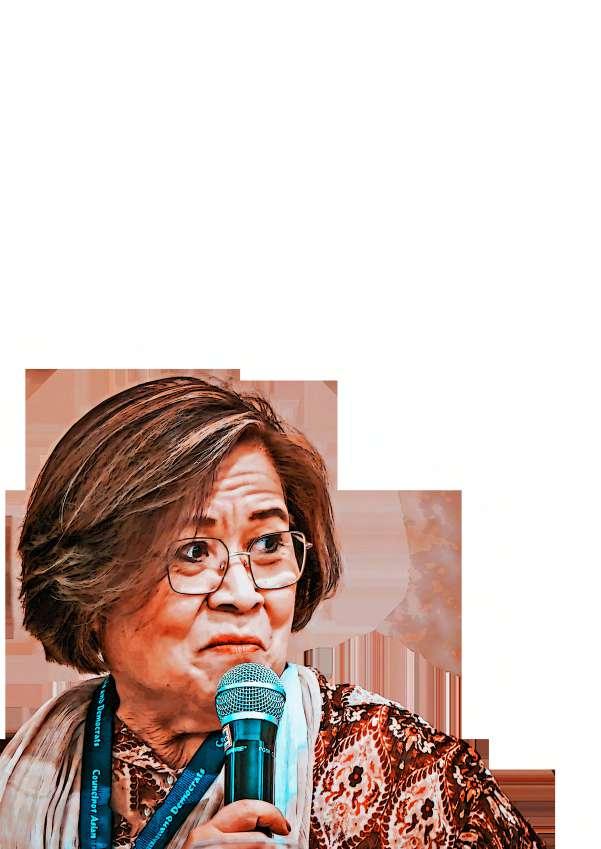
First of all, may I express my regrets for not attending this event in person. I am still preoccupied with getting my life back on track after almost seven years of imprisonment on trumped-up charges filed by the past Duterte administration.
As you all know, the past Philippine president had me imprisoned to silence my opposition to the drug war that was killing an average of 20 to 30 Filipinos daily at the time — most of them from poor families living in major urban centers. A total of four criminal cases —three of them drug cases — were filed against me. The last of them were dismissed only last 24 June, although I had been already released on bail in November of last year.
Today is my 36th day of unconditional freedom. I would like to thank all of the officials and members of the Council of Asian Liberals and Democrats, as well as Liberal
International, for supporting me all throughout my ordeal in prison. Your support and constant reminder to the world of my plight and my fight for the cause of human rights in the Philippines truly kept me alive and hopeful for the future.
Being a prisoner of conscience was not an easy experience. I was still a sitting senator while I was in jail, but I could not fully discharge my mandate as such since I was not allowed to attend Senate plenary deliberations and committee hearings. I also missed many personal and family milestones. Up to now, I still pinch myself to make sure that the present is true and that I am really free. All that gave me hope during those times were the messages and statements coming from all over the world calling for my freedom and for speedy justice in my cases.
Finally, that day came, due largely in part to the exit of Mr. Duterte as president and the start of the new administration, which had no real interest after all to keep me in jail. The only problem was that the new administration also had no interest in setting me free immediately. As a result, the cases dragged on for another year and four months before the court proceedings finally ended up granting my motion for bail, simply because Duterte’s evidence was not credible. They were not credible because they were manufactured and fake evidence.
persecution is no longer used as a tool by one politician or leader against another. And that is why the liberal-democratic platform of government remains relevant in our people’s struggle for political modernization, where political beliefs and advocacies can compete equally and without violence in a free and open market of ideas.

entitlement in an invented and exploited social polarity which in the end only bred aggression and violence in a place of diversity and tolerance.”
A large part of the autonomous actions of a critical and engaged citizenry came from the women and the youth of my country. Women and youth groups were at the forefront of the Filipinos’ fight to put an end to the nightmare of the pointless social cleansing that killed thousands of our countrymen. Women’s groups were also behind me, staunchly defending me against the onslaught of massive black propaganda, character assassination, and misogynistic attacks unleashed against my person.
“We believe in these values so we fight for them— sometimes even it costs us our own freedom, when fighting against those who think themselves above the law.”
Your experiences and lessons in your own countries may not be as dire and extreme as those that we have undergone. For this, we should be thankful. But we should not grow complacent if we are to prevent this experience from being repeated anywhere else in our region of the world.
In my story of persecution, perseverance, hope, and liberation lies the story of the liberal — democratic belief in the spirit of freedom, equality, and justice. We believe in these values so we fight for them — sometimes even it costs us our own freedom, when fighting against those who think themselves above the law.
In many parts of Asia, we have not yet attained that level of political maturity where political
Let me paraphrase from a speech that I recently delivered at the graduation ceremonies of youth and women community organizers and social workers of the premier state university in the Philippines:
“Nothing illustrates the importance of the autonomous actions of the critical and engaged citizenry more than the struggle that we have undergone in the six years of the past administration.
During this period, we tried to put an end to the abominable notion that social progress can be achieved through a program of social cleansing. We fought against a widespread but completely false belief that gave the majority a sense of natural
And in this, the women and the youth have a large role to play, as they did in my country. We have lessons to share and stories to tell from the Philippines, and I hope that they become part of the teachings that you will learn in this training workshop of CALD Youth and Women leaders.
Thank you very much to all of you, for everything the liberal-democratic movement all over the world has done for me and my country. And I wish you all a fruitful and productive endeavor in the following days.
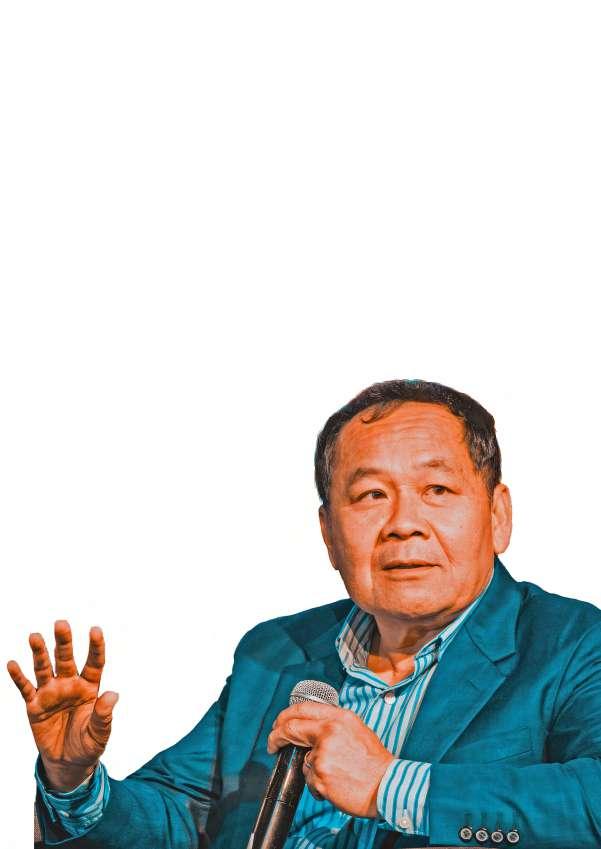
Readying for Trump 2.0 mardi seng
CALD ChAirperson
Speech given on 28 November at the Panel on the Recent U.S. Elections, a part of the global political workshop “In Defense of Liberal Principles” organized by RELIAL with FNF support in Santiago, Chile
It gives me great pleasure to represent the Council of Asian Liberals and Democrats (CALD) in this distinguished panel on the recent U.S. elections. CALD, as you may be aware, is a regional network of liberal and democratic political parties in Asia. We currently have 10 member-parties across Southeast, East, and Central Asia. In a way, CALD can be considered as RELIAL and Africa Liberal Network’s (ALN) counterpart in the Asian region, although I believe both RELIAL and ALN have greater numbers and diversity in your membership.
I have been invited to this panel to share the issues and expectations of Asia regarding Trump’s electoral victory — which took place in the context of a world increasingly being defined by geopolitical tensions, democratic recession and economic uncertainty.
In Asia, headlines such as “How is Asia bracing for Donald Trump 2.0?”, “How are America’s Asian allies trying to Trump-proof their policies?”, “How is Asia preparing for the Trump curveball?” reflect the uncertainties that Asian policymakers and observers are feeling after Trump’s decisive electoral victory.
There are two schools of thought regarding what to expect from the incoming Trump administration:
The first, more optimistic, perspective is the so-called “adults in the room,” claiming that Trump’s worst policy instincts could still be checked and frustrated by well-meaning officials/technocrats left within the administration.
The second, scarier view, is that the incoming administration could usher in a “Trump unhinged” — meaning the president, emboldened by election results, control of both houses of Congress, and unburdened by reelection concerns (given the twoterm limit), could do whatever he wants with minimal restrictions or restraint.
First, Trump would most likely continue the Indo-Pacific strategy, which had its beginnings during his first term and retained by Joe Biden. This strategy seeks to ensure that the region is “free and open” to all amidst China’s increasing influence and assertiveness. It is focused on countering China, and includes the strengthening of alliances and partnerships throughout the region.
turn may be detrimental to its allies like Taiwan and the Philippines.
Fourth, Trump could potentially heighten divisions in the region by forcing Asian countries to choose sides in the U.S.-China superpower competition. This could put Asian countries in a difficult position, as they may have to choose between their security and economic interests.
Fifth, Trump may unwittingly spur an arms race in Asia. If allies in the region are fearful of Trump unilaterally dropping protections, they may think that they should rely on themselves more. South Korea and Japan already pledged to increase their defense spending, for example. Worse, if countries in Asia cannot trust the U.S. nuclear umbrella, they might explore having their own nuclear deterrent.
“Trump’s leadership style, and his prioritizing of economic growth over democratic principles, could embolden Southeast Asian dictators and right-wing populist movements.”
Politically, Asia may have to brace for the following:

As much as I want to be optimistic, I am afraid that the second Trump administration will be more unpredictable and transactional than the first — with significant repercussions for security, political and economic outlook in Asia and elsewhere.
For this reason, it may be a useful exercise for us to anticipate what possible issues may come up during Trump’s second term on the security, political, and economic fronts, and how should we respond to them.
In terms of regional security in Asia, the following could be expected from the incoming Trump administration:
Second, Trump would demand more from its Asian allies — whether it is Japan, South Korea, or Taiwan. Despite the possible continuation of Indo-Pacific strategy, Trump has a strong belief that the mutual defense treaties that rely on U.S. military power are unfair. For example, he stated that he would demand South Korea to pay US$10 billion annually to host U.S. troops in the country.
Third, Trump may not give a high priority on the South China Sea disputes or Taiwan Strait tensions despite a tough line on China. This is because of his transactional leadership style, which may put a premium on avoiding U.S. involvement in potential conflict by striking a deal with Beijing, which in
First, given Trump’s transactional leadership style, he would most likely veer away from values-based diplomacy. Having a transactional approach means that the priority should be U.S. national interest, not promoting values such as democracy and human rights. On his first term, Trump engaged with authoritarian leaders like North Korea’s Leader Kim Jong-un and Russian President Vladimir Putin. We can expect Trump to revive these ties in his second term.
Second, Trump’s leadership style, and his prioritizing of economic growth over democratic principles, could embolden Southeast Asian dictators and right-wing populist movements. Myanmar’s generals and Cambodia’s elite, for example, would welcome the prospect of a U.S. president less focused on democracy and human rights. This could deepen and lengthen Asia’s
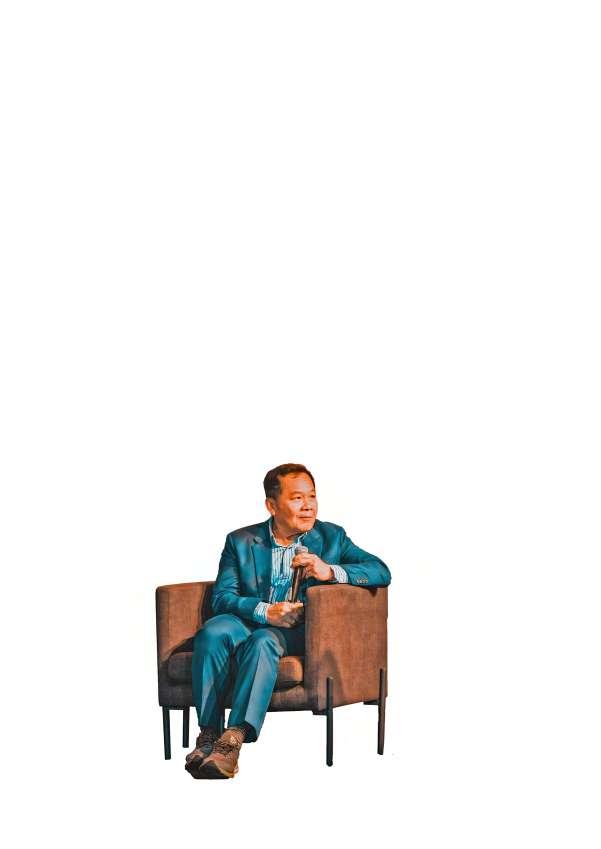
democratic recession, and result in a much more difficult operational environment for opposition leaders and democracy activists.
Finally, in terms of the economy, Asia can anticipate the following:
First, Trump would consider China as his main target, but his economic policies could also have a deep impact on other Asian countries. During his first term, he launched a trade war against China, placing tariffs on hundreds of billions of dollars worth of Chinese goods. For his second term, he vowed to double down on tariffs on China. While China is the primary target, other Asian countries — most of which have close economic ties with China — will also be affected. Asian economies that benefited from the previous trade war may suffer this time around as Trump is expected to balk at U.S.-China trade flows simply being rerouted through other countries. Vietnam, in particular, could be negatively affected because of its trade surplus with the United States, which is now the fourth largest in the world.
Second, Trump would most likely impose tariffs on both enemies and allies alike. He calls himself the “Tariff Man,” and trade levies are the centerpiece of his economic platform. For one, he proposed to have a 60-percent levy on all Chinese imports and 10 to 20 percent across-the-board tariff on other countries. These tariffs could result in inflation, trade tensions, and long-term economic instability. According to estimates, U.S. imports from the region would fall by three percent and exports to it by eight percent because of
these tariffs. Highly trade-dependent economies of Asia will be severely hit by these, and political destabilization within the region will be the inevitable consequence.
Third, Trump would favor bilateralism over multilateralism in terms of trade agreements. He believes that the United States can better leverage its strength and size by working bilaterally. During his first term, he immediately showed a dislike of multilateralism by withdrawing from the Trans-Pacific Partnership (TPP), a trade deal involving many Asian states. While campaigning for his second term, he also said that he would junk the Indo-Pacific Economic Framework (IPEF) between the United States and 13 other countries, many of which are also in Asia. In replacement of these multilateral frameworks, Trump may push for bilateral trade agreements instead.
In summary, my sense is that Asia will be facing several issues, problems and uncertainties on the security, political and economic fronts under the second Trump administration.
We are now witnessing the specter of Trumpism–a unique blend of economic nationalism, nativism, and strongman approach to leadership — and its repercussions would reverberate not only in Asia, but also in other parts of the globe. As democracy advocates and open-economy supporters, I think we have a very bumpy road ahead of us under Trump 2.0. Still, we persevere, and we continue doing what we are doing.
Because, like everything else, this, too, shall pass.
Navigating &Challenges Embracing Opportunities
Celito arlegue
cald execuTiVe direcTor
Opening speech given on 14 March at the CALD panel discussion at the Asia Global Democracy Coalition Forum held in Seoul, South Korea
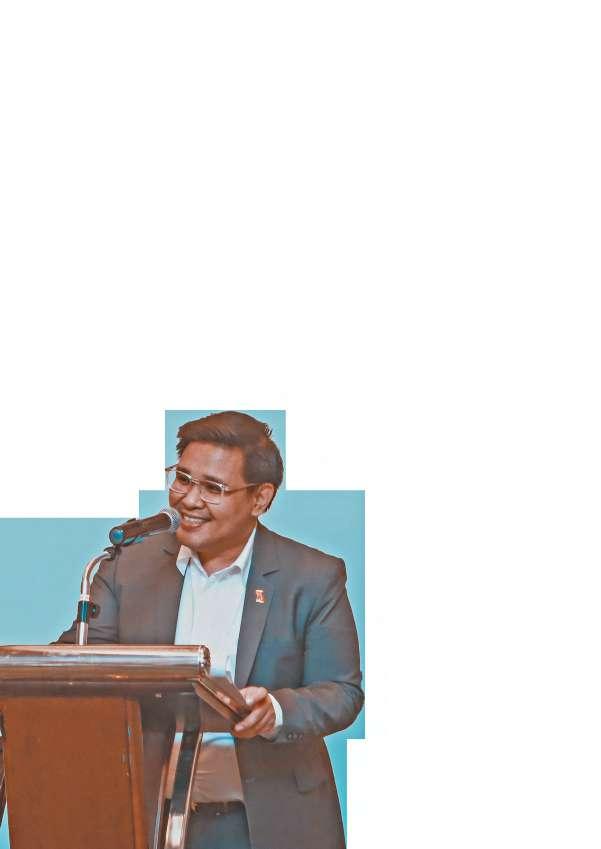
Please allow me to begin by introducing the organization that I represent. I am from the
Council of Asian Liberals and Democrats (CALD),a network of liberal and democratic political parties in Asia founded 30 years ago with then Thai Prime Minister Chuan Leekpai, Deputy Foreign Minister (later ASEAN Secretary General) Surin Pitsuwan, and South Korea’s opposition leader (later President) Kim Dae Jung.
We currently have 10 member political parties from Southeast, East and Central Asia, of which only two are currently in government: the Democratic Progressive Party of Taiwan and the Indonesian Democratic Party of Struggle. Soon, only Taiwan will remain given that Indonesia will have a new government by October.
The rest are in the opposition — although some of them still have some presence in the national legislature or state / local governments.
The state of our member-parties, to a certain extent, indicates the continuing
challenges to democracies in Asia today.
I have been asked to share my thoughts on what I consider to be the key challenges, as well as opportunities that democracy advocates and supporters can seize on. From my perspective, looking at the experience of East and Southeast Asia, three challenges are particularly worth mentioning:
First, the threats to democracy in Asia do not only come from China’s Xi Jinping, but also from democratically elected leaders who then use the power of their office and popularity to undermine democracy gradually. We can see these in the Rodrigo Duterte of the Philippines and Joko Widodo of Indonesia, among others. These types of leaders “coopt or weaken institutions of horizontal accountability — the courts, legislatures and oversight agencies — with seemingly innocuous modifications that, when accumulated over time, end up degrading free and fair elections and transforming democracies into competitive authoritarian regimes.” This is what Filipino Nobel laureate Maria Ressa once described as democracy’s death by “a thousand cuts,” or more recently by a Journal of Democracy article as “slow-motion democratic breakdown.” This is considered by many as a more formidable enemy as there is still a democratic façade while institutions and processes of democracy are being eroded.
Second, the challenge to democracy is also related to its real or perceived failure to improve the lives of the people.
In a research published by Cambridge University analyzing the political sentiment of more than four million people from 154 countries between 1995 and 2020, it was pointed out that global dissatisfaction with democracy reached a record high. During the 25-year period, the number of individuals dissatisfied with democratic politics around the world rose from a third to more than half.
“Given Asia’s size, geopolitical importance, and economic clout, the fate of democracy in this region will have significant global implications.”
politics. Why does the military in Thailand or Myanmar intervene in politics? Why are political dynasties or political families widespread in countries like the Philippines, Indonesia, or Cambodia? Why is corruption rampant in both the public and private sectors in South Korea, Malaysia, and others? It is because military, political and business elites have economic interests to protect, and they look at politics as a means to protect those interests. As noted by International IDEA in its “2023 Democracy in Asia and the Pacific Outlook Report,” “politics remains a pathway to personal enrichment, continuing to motivate political and military elites to maintain power by suppressing people’s rights.” It added: “Unequal access to resources drives human rights abuses and is often a fundamental barrier to more democratic politics.”

Moreover, this dissatisfaction with democracy appears to be true in both mature and new democracies alike. Recent surveys done by the Pew Research Centre also show that “for many, democracy is not delivering; people like democracy, but their commitment to it is often not very strong; political and social divisions are amplifying the challenges of contemporary democracy; and people want a stronger public voice in politics and policymaking.”
Finally, the weakness of democratic institutions and processes appears to be strongly connected with the role of money in
Taking into account these three challenges, please allow me to dwell now on the opportunities. Allow me to cite two, in particular.
First, while authoritarian and democratically elected-turned-authoritarian leaders are disregarding institutions of horizontal accountability, and elections alone are not that effective in ensuring vertical accountability, the strength of the youth and broader civil society in Asia has been proven effective in enforcing diagonal accountability, as seen most recently in the Sunflower
Movement in Taiwan, Candlelight Protests in South Korea, and Civil Disobedience Movement in Myanmar. Regionally, the Milk Tea Alliance, a loosely organized online political and social movement that originated in Asia — particularly in Thailand, Myanmar, Indonesia, the Philippines, Hong Kong, and Taiwan — is also a very promising demonstration of the power of cross-cultural/regional solidarity among democracy activists.
Second, while dissatisfaction with democracy is at an all-time high globally, it must be noted that in the latest Global Democracy Perception Index 2023 published by Latana and Alliance of Democracies shows that Asia is bucking the global trend. Here are some of the trends revealed by the Index:
• Despite the 17th consecutive year of decline in global freedom according to Freedom House, the vast majority of people worldwide consistently say that democracy is important to have in their country (84 percent). This has been the case in the past five years (2019-2023).
• While only about half of those surveyed (57 percent) think their country is democratic — the top three countries that garnered the “most democratic” ranking from their citizens are all located in Asia: India (78 percent), Taiwan (77 percent) and South Korea (74 percent).
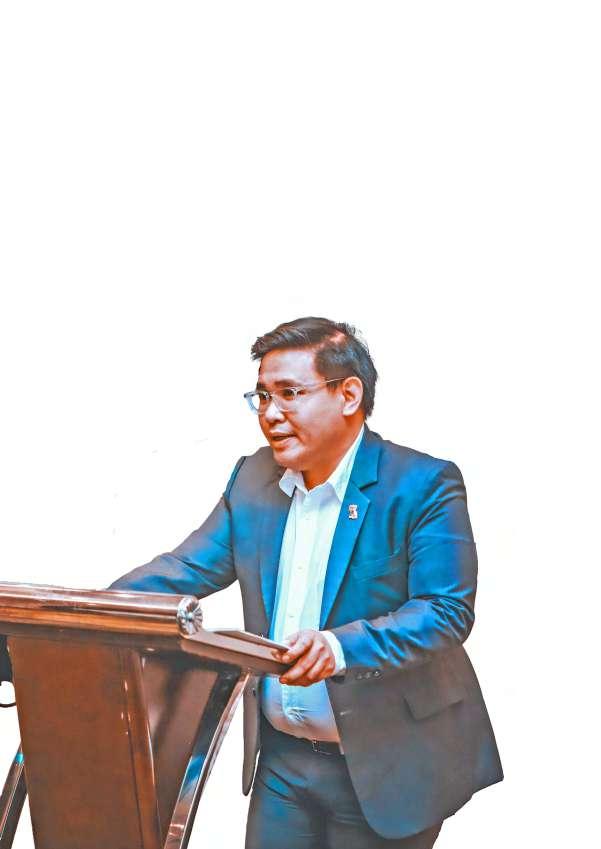
• Finally, among the regions of the world, the feeling that there is “not enough democracy” is lowest in Asia (30 percent). In contrast, it was 55 percent in Latin America and 42 percent in Europe.
After discussing these challenges and opportunities for democracies in Asia, what can we say then about the region’s democratic prospects?
I don’t think there is an easy answer to that question — as it would certainly depend on how we navigate the challenges and embrace the opportunities as democracy supporters and activists.
What I can say with certainty is this: Given the geographic size, geopolitical importance and economic clout of Asia, the way democracy flourishes or flounders in this part of the world would have significant implications for the future of democracy globally.
In Praise of Taiwan & the DPP
k arl heinz Paque
liberal inTernaTional dePuTy PresidenT & FnF chairPerson
Welcome address at the 10 January welcome dinner in Taipei for the CALD-LI Election Mission to Taiwan
It is a great pleasure and honor to be here in the last three days of the election campaign, and it’s wonderful — wonderful to feel this warm welcome that you give us as guests to this great event.
The elections in this wonderful country receive a lot of attention in the place where I come from, in Europe, in Germany. We as Liberal International have for the first time put together a little group of Bureau members — Hendrik from Denmark, Phil from Britain, and Leonard from Holland and myself — to visit you in friendship, deep friendship, and support you in the last few days.

lot of younger people involved. I sometimes wish that in our countries — and in particular my own country, Germany — we would have the same enthusiasm and support across generations.
“We will return home on the wings of the victory of the DPP and its presidential candidate.”
I say support, but let me say that I am always left impressed by you. Of course, I read about it in the press, but I’m deeply impressed by how professionally you organize your election campaign, the Team Taiwan. There is a lot of enthusiasm, a
You’re not only an extremely important country in a region that is of growing importance to the world, and which has problems and dangers, geopolitically. We watch very carefully what China is doing in the face of a Taiwan that has become a shining example of a society moving from a traditional base into a very modern economy. A modern society, an open society, which they don’t like that much in Beijing. But they have to get used to it. And the more successful elections with a strong DPP, a strong voice for open society, for the rule of law, for democracy and the market economy — the stronger the signal is, the better.
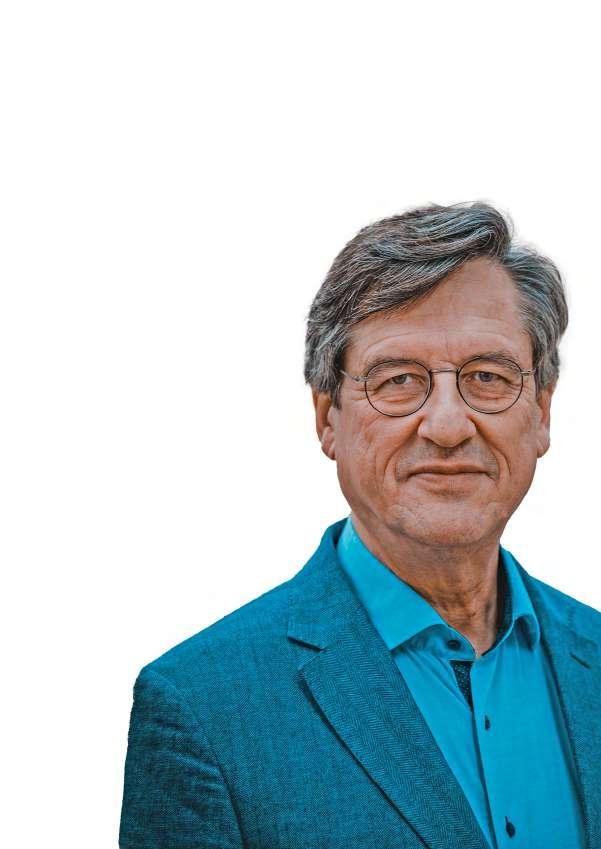
As liberals, we are, of course, optimistic that things will work out nicely in the presidential and the parliamentary election. It is wonderful that our friends from CALD put so much effort into the organization of the regular visits like this, to the elections in Taiwan. We are extremely happy that CALD puts in this work. Let me also say a word of thanks to the DPP. You have more important things to do than welcoming friends from all over the world at the moment, because this is an extremely important election for the future of your country. Nevertheless, you supported this visit, you organized it together with CALD. We thank you very much on behalf of our delegation, and on behalf of the whole of Liberal International. Our president, Hakima el Haite, sends the best regards to you. Thanks very much for all your efforts. We will enjoy the meeting, and we will return home on the wings of the victory of the DPP and its presidential candidate.
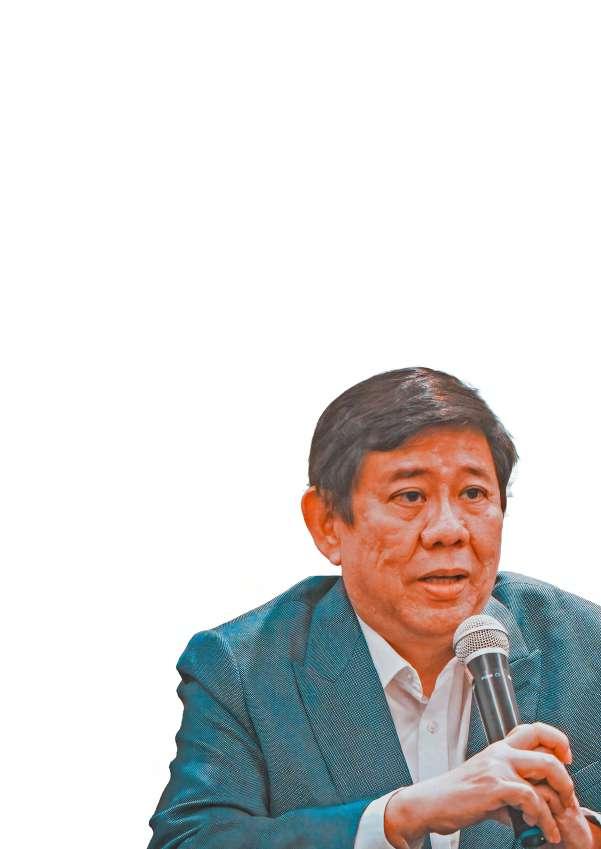
Who’s Afraid of AI?
Julio teehankee
Speech given at the 4 December launch of CALD’s policy paper on AI, held in Quezon City, Philippines
Artificial intelligence or AI offers both opportunities and challenges, and its role in politics is becoming increasingly significant. Today AI’s presence is palpable in election campaigns, significantly enhancing strategic planning and engagement with voters. In Indonesia, for example, AI has empowered community organizations to act as influential brokers during elections.
AI’s capability extends to sentiment analysis, which dissects social-media data to tailor campaign messages and chatbots that provide real-time responses to voter queries, thereby enriching voter interaction. Looking ahead, AI is set to become even more central in political strategizing. Predictive analytics powered by AI will enable campaigns to foresee voter turnout and adjust their tactics in real-time. However, this shift brings forth the possibility of fully automated campaigns being driven more by algorithms than human insight, the unintended consequences of which will be populism on hyperdrive, as we have already been witnessing around the world.
The integration of AI in politics is not without ethical challenges.
AI’s ability to influence voter behavior through personalized messages raises questions about voters’ autonomy and potential manipulation.
Misinformation and deep fakes have become more technologically advanced.
Full ProFessor & PoliTical science research Fellow de la salle uniVersiTy, manila
I myself was a victim of deep, deep faking early this year, when one of my interviews on “TV Patrol” (a local news show) was manipulated. It looked like me. It sounded like me. Those were my lips moving. But I was supposedly endorsing a survey that had a particular senator as the favorite for 2028. Of course, I did not say that, but that TikTok video went viral on Facebook and TikTok and other social media channels. The TV station ABS-CBN and news anchor RG Cruz even had to demand that TikTok take it down. So even a public intellectual or political analyst is now being deep-faked. That’s how bad it is.
Transparent AI applications, strong data-privacy measures, and bias mitigation are critical to maintaining electoral fairness. Thus, the development of regulatory frameworks to balance innovation and democratic integrity is indispensable in terms of intra-party democracy, which is another potential application for AI.
AI promises to revolutionize internal political party dynamics by facilitating data-driven decision-making. AI enhances intra-party democracy, offering avenues for broader member participation and transparent leadership selection processes. The Pirate Party in Iceland exemplifies AI’s constructive role in political parties by utilizing AI for sentiment analysis. They have enhanced member engagement and aligned party strategies with grassroots perspectives, thus promoting transparency and participation.
The Pirate Party was originally from the Netherlands. It was a party composed of ordinary people and geeks who pirated music, videos, and movies online. They formed a political party that became successful during the mid-2000s, together with the Podemos from Spain and the Five Star Movement in Italy. All of these parties represented the rise of the socalled “digital parties.” These are parties that are not organized in the traditional manner. They are parties that have embraced not only technology, but also the philosophy of non-linearity and virality. That is the source of their success.
In the Philippines, we have yet to see any local political party that has embraced the principle of an open, digital party-building. But we have seen it in Thailand with the Move Forward Party.
AI adoption in political processes varies
across Asia and is influenced by diverse political climates and technological advancements. South Korea and Japan are pioneering AI-based strategies, while countries like China utilize AI primarily for governance rather than electoral processes. Cultural norms significantly impact AI integration in politics. In societies highly open to technology, AI adoption is more seamless. However, varying perceptions of privacy and political participation norms require tailored approaches for effective AI integration in political spheres.
“Democracy not only survives but thrives alongside technological innovation.”

The intersection of AI and politics offers a promising avenue to rejuvenate democratic processes through innovation and enhanced engagement. However, these advancements must not compromise the core tenets of democracy. I urge political entities, tech developers, and citizens to collaborate in leveraging AI responsibly, educating ourselves about its role, and ensuring that these innovations enhance rather than undermine our democratic institutions.
Let me offer some recommendations. First, regulatory frameworks: We should develop comprehensive guidelines for the ethical use of AI in political environments, ensuring transparency and accountability. It’s not just a question of regulation or banning, because it’s about people, right? We need to balance the need to protect by regulation and the need to give the freedom for people to develop in the Amartya Sen way: Becoming. Being.
Second, public awareness: We should educate citizens about AI’s role and implications within electoral processes to foster informed participation and engagement. One of the first steps in combating misinformation and disinformation is for us to start listening to each
other again and communicate face-toface instead of doing it online. There has been a disconnect, which has led to one of the mistakes of liberals and democrats in the past electoral cycles: having a condescending attitude.
Third, collaborative governance, which promotes partnerships among political entities, technology developers, and regulatory bodies to ensure responsible AI technology. Inclusive technology development ensures diverse perspectives. Perspectives are included in AI development and prevent biases and promote fairness. Ethical innovations prioritize ethical guidelines and practices in the deployment of AI to avoid misuse and ensure equity in political processes.
I used to be cynical about artificial intelligence. In fact, I was more of an alarmist. I belonged to the alarmist crowd, those thinking that “I will start hearing Arnold Schwarzenegger, the Terminator, and the robots will become self-aware” and all that. I’ve switched off Siri for the longest time, but now there’s no escaping it, because if you go to Microsoft, there’s Co-pilot. If you go to Apple, there’s Apple Intelligence. Google also has its own. Now Chat GPT is being integrated into all of these applications.
When Wikipedia was introduced, we said, “Oh, our students will plagiarize.” But eventually we adopted the use of Wikipedia, and then Google, and now everyone’s Googling. It’s the same with artificial intelligence; we will adopt and adapt.
I’m slowly opening my mind to the use of AI, despite being a deep-fake victim. There is a lot of potential, especially in education. That’s also where we can inoculate the citizenry, by emphasizing the ethical use of AI. Because if their philosophical foundation about the use of technology is sound, then we don’t have to worry 10, 20, 30, 40 years down the line.
Lastly, sustainable progress: Balance technological adoption with sustainable democratic practices to maintain democratic integrity and inclusivity. These strategies aim to balance innovation with the core values of democracy, ensuring AI enhances rather than undermines the electoral processes.
I remain optimistic about the future where democracy not only survives but thrives alongside technological innovation. Let us continue to navigate this digital age with thoughtful strategies and ethical foresight. And as a final disclosure, this speech was co-written with AI.

All Smarted Up
In 2022, CALD launched the Smart Mobility Project, a three-year program designed to showcase innovative smart mobility solutions in Asia and support local government units (LGUs) — including cities, municipalities, and provinces — in developing their smart mobility plans.
In October 2024, the Project concluded with a landmark regional conference in Khon Kaen, Thailand. Yet while it ran for just a few short years, the Project was able to rack up a significant number of accomplishments.
The vision of CALD’s Smart Mobility Project was to help LGUs assess the mobility needs of their constituents, address management challenges, explore the use of technology and data, and consider alternative transportation options. The ultimate goal was to create comprehensive mobility plans that would serve as blueprints for improving transportation systems.
As part of the Project’s pilot activities, two workshops were held: one in Tagaytay, Philippines (April 2022), and another in Bangkok, Thailand (September 2022). These workshops led to the establishment of the CALD Smart Mobility Network, a coalition of experts, organizations, and political parties committed to providing strategic and technical guidance for transforming mobility across the region.
From 2023 to 2024, CALD intensified its efforts to empower select LGUs to adopt transformative approaches and reform their transportation strategies. These initiatives were aimed at ensuring public access to safe, inclusive, and efficient transportation systems. CALD also published The Mobility Handbook, a guidebook for those who are interested in transforming mobility in local communities, and Emerging Smart Mobility
in Asia, which summarizes CALD workshops with transportation experts and leaders implementing smart mobility projects. In addition, it produced the CALD Smart Mobility Video
Among the highlights of the 2024 Smart Mobility conference in Khon Kaen were the experiences of CALD’s three partner LGUs in the project in transforming their smart-mobility ideas into reality. In truth, although the LGUs faced unique challenges, their leaders shared a common commitment to improve mobility for their communities and to continue educating the public toward a more people-centric approach to urban planning and governance.
Also inspiring was the smart-mobility story of Khon Kaen, the site of the conference, with its leaders emphasizing community involvement in planning and development as a crucial factor for success. The conference delegates themselves noted that engaging local citizens not only ensures that projects meet community needs, but also fosters a sense of ownership and pride among residents. As Dr. Sirisak Laochankham, Dean of the College of Local Administration at Khon Kaen University, remarked, the local government, the business community, the academe, and the people of Khon Kaen are all “eager to raise their voices, their needs, and capacity to do something with their local community with minimal support from the central government.”
It was also a strong community spirit that helped the CALD Smart Mobility Project have significant achievements in just three years. “It takes a village to get us to this point,” CALD Chairperson Mardi Seng said at the Khon Kaen conference. He added that CALD “could not thank enough the partners from local governments, the academe and civil society for being part of the journey.”


MOBILITY FOR ALL
A Manifesto for Change by the People
Our Duty for the Welfare of All BUILDING SUSTAINABLE CITIES
We, the people, are committed to the advancement of our collective welfare and development. We strive to build cities and communities where we can live safely, healthily, and happily, and to achieve this, we recognize the crucial role of mobility. We believe that every person is entitled to accessible, inclusive, safe, efficient, equitable, and sustainable transportation options in order to enjoy quality and prosperous lives in the city. We therefore declare mobility as an essential public good.
Urgent Action for Mobility for All
We acknowledge that our cities today continue to face challenges stemming from unequal access to mobility; a pressing concern of everyone as our cities grow and become denser. We also acknowledge that many other social and urban issues are deeply intertwined with mobility. Addressing present mobility gaps will help improve people’s access to vital basic services, employment, and other social opportunities. Consistent with the United Nations Sustainable Development Goal 11, we call for urgent radical reform of our transportation systems toward building more sustainable cities and communities.
Mainstreaming Mobility for All OUR CALL TO ACTION
To that end, we believe in building urban and rural mobility systems that put people at the heart of the solution. We will make this a reality by taking the following actions:
MOBILITY HANDBOOK





Closing Statement

Mobility as a Right
We declare mobility as a right of each and every individual, our right. We assert that mobility is integral to other policy areas such as climate change, housing, and inclusive economic development.
Environmental Sustainability and Decarbonization
We will support urban and rural mobility initiatives that move towards lesser use of fossil fuels and overall lower carbon footprints.
Public Transportation as a Backbone of Mobility Services
We believe public transportation should be prioritized and governments should allocate the necessary space, resources, and legal and fiscal support to provide quality services for the people.
Building Safe and Walkable Residential Neighborhoods
We support the development of vibrant neighborhoods that promote walking, cycling, and other non-motorized modes. We call on governments to invest in the necessary infrastructure and amenities towards this end. We commit to take steps to reduce dependency on private automobiles and motorcycles to improve air quality and reduce traffic fatalities.
Judicious Use of Digital Technology
We shall use digital technology responsibly towards improving our mobility systems and make transaction platforms more inclusive.
We will, in whatever way we can, commit to ensuring that this 5-point action plan is heard by our leaders, and that concrete and contextualized policies, programs, and investments within our communities are made. We commit to guarantee that we, the people, are part of the process of change, and that we will proactively engage the process of improving our cities and communities.
We believe progressive cities are ones where people from all walks of life are afforded access to high-quality public transportation and not cars. Only then can we truly achieve Mobility For All.
The ABCs of AI in Elections
In a rapidly digitalizing world, artificial intelligence is emerging as a game-changer in electoral processes. Yet as a policy paper released by CALD in December points out, AI poses pressing risks even as it offers significant opportunities, such aas enhancing campaign efficiency and improving voter outreach.
Artificial Intelligence in Elections and Politics in East and Southeast Asia: Opportunities, Risks, and Ways Forward for Democrats and Liberals was prepared by polling and research firm WR Numero for CALD with FNF support. It explores AI’s role in shaping voter engagement, data analysis, party mobilization, and election administration across East and Southeast Asia. Among the risks the paper lists as due to AI in elections are algorithmic bias, misinformation, cybersecurity threats, and the widening digital divide.
With real-world insights from Indonesia, South Korea, and Taiwan, the publication provides a roadmap for the ethical and effective integration

of AI in democratic processes. It stresses that the experiences of these three countries show the need for clear and enforceable laws to regulate AI use in elections; partnerships between governments, technology companies, and civil organizations for leveraging collective expertise and resources; and plain and simple transparency.
Former Philippine Senator Leila de Lima has highlighted how the policy paper can help candidates like her navigate the country’s evolving digital and political landscape. De Lima will be running as a party-list candidate from Mamamayang Liberal in the Philippines’ 2025 midterm elections.
“Fake news and deepfakes are beginning to hurt us,” she said at the paper’s launch in December. “I think it will get worse come elections, so we need to be enlightened about the dangers and how it is being propagated.”
MEET CALD’S
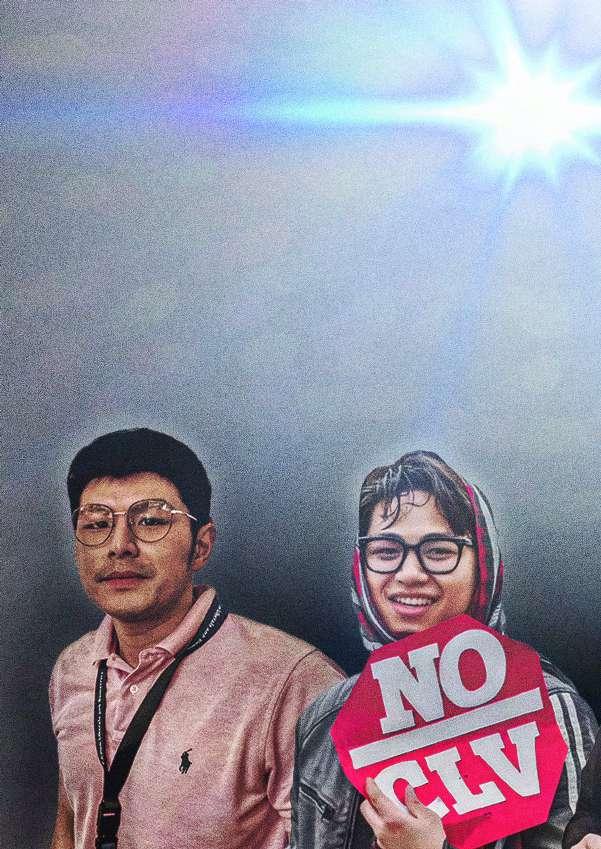
Jeremiah Tomas CALD YOUTH CHAIR
As Chair of CALD Youth, Jeremiah has been a dedicated advocate for youth empowerment across Southeast Asia. He has played an active role in various NGOs in the Philippines, including as Director for the Anvil Business Club and Play it Forward. Jeremiah has represented CALD Youth at international events such as election observations in Indonesia and Taiwan, and as part of the panel at the 3rd Summit for Democracy. He also serves as the Regional Representative for Asia at the International Federation of Liberal Youth and participated in the Global Leadership Summit in Sweden. Through his work, Jeremiah continues to inspire and shape a generation committed to democratic values and leadership.
Samady Ou CALD YOUTH VICE CHAIR
Samady played a key role as one of the organizers of a massive 20,000-person protest in Seoul, aimed at pressuring Hun Sen to back down from the CambodiaLaos-Vietnam Development Triangle Area project. This movement, known as the Krama Movement, drew its name and symbolism from the traditional Khmer scarf, the krama, which protesters wore on their heads and used to cover their faces. The krama is more than just a piece of fabric—it is a powerful emblem of Khmer identity, resilience, and defiance. In the face of Hun Sen’s authoritarian rule and ongoing efforts to silence dissent, wearing a krama transforms into an act of nonviolent resistance. It serves as a reminder of Cambodia’s shared heritage, its people’s strength, and their unwavering commitment to freedom.
Jobelle Domingo CALD YOUTH SECRETARY GENERAL
Jobelle demonstrated her commitment to youth empowerment through various significant initiatives. As the Secretary General of the ML Partylist, the multi-sectoral wing of the Liberal Party of the Philippines, she led the organization of chapters nationwide, building a strong base of advocates for liberal democracy in preparation for the upcoming elections. She also took a stand against disinformation and polarization through her critical work with BUILD Pilipinas to promote truth and open society. She helped several youth organizations and coalitions across the Philippines in their strategic-planning workshops, thereby helping shape their three-year direction and ensuring their sustained efforts in protecting and promoting democracy. Through such efforts, Jobelle continues to champion youth and civic empowerment, fostering a new generation of active and empowered citizens committed to democratic progress.
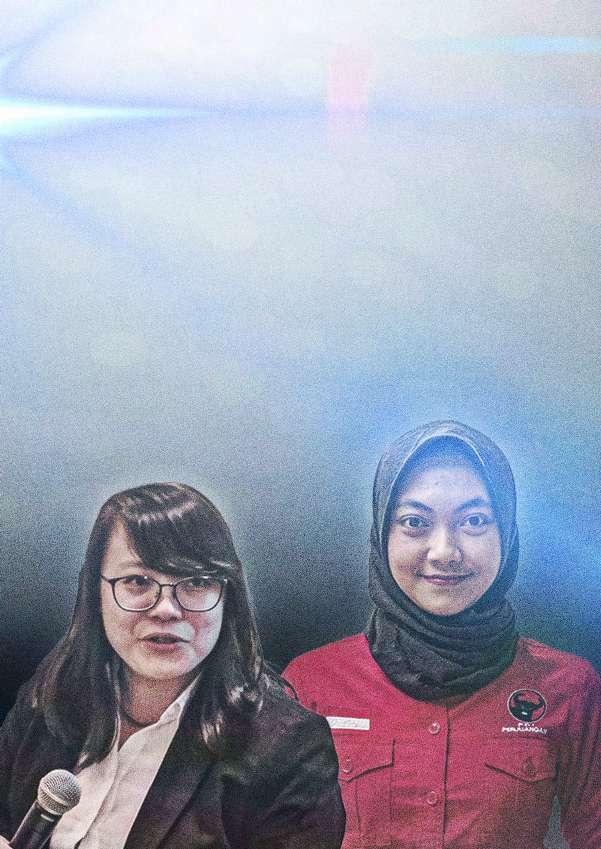
Esti Marina CALD YOUTH PUBLICITY OFFICER
Esti showcased her commitment to youth empowerment by actively participating in the Indonesia Regional Elections and supporting her party, the Indonesia Democratic Party of Struggle (PDI-Perjuangan). From September to November 2024, she played a vital role in various campaign activities across Jakarta and East Nusa Tenggara. Her dedication to fostering civic engagement highlights the crucial role of young voices in driving democratic progress and ensuring inclusive representation in governance.
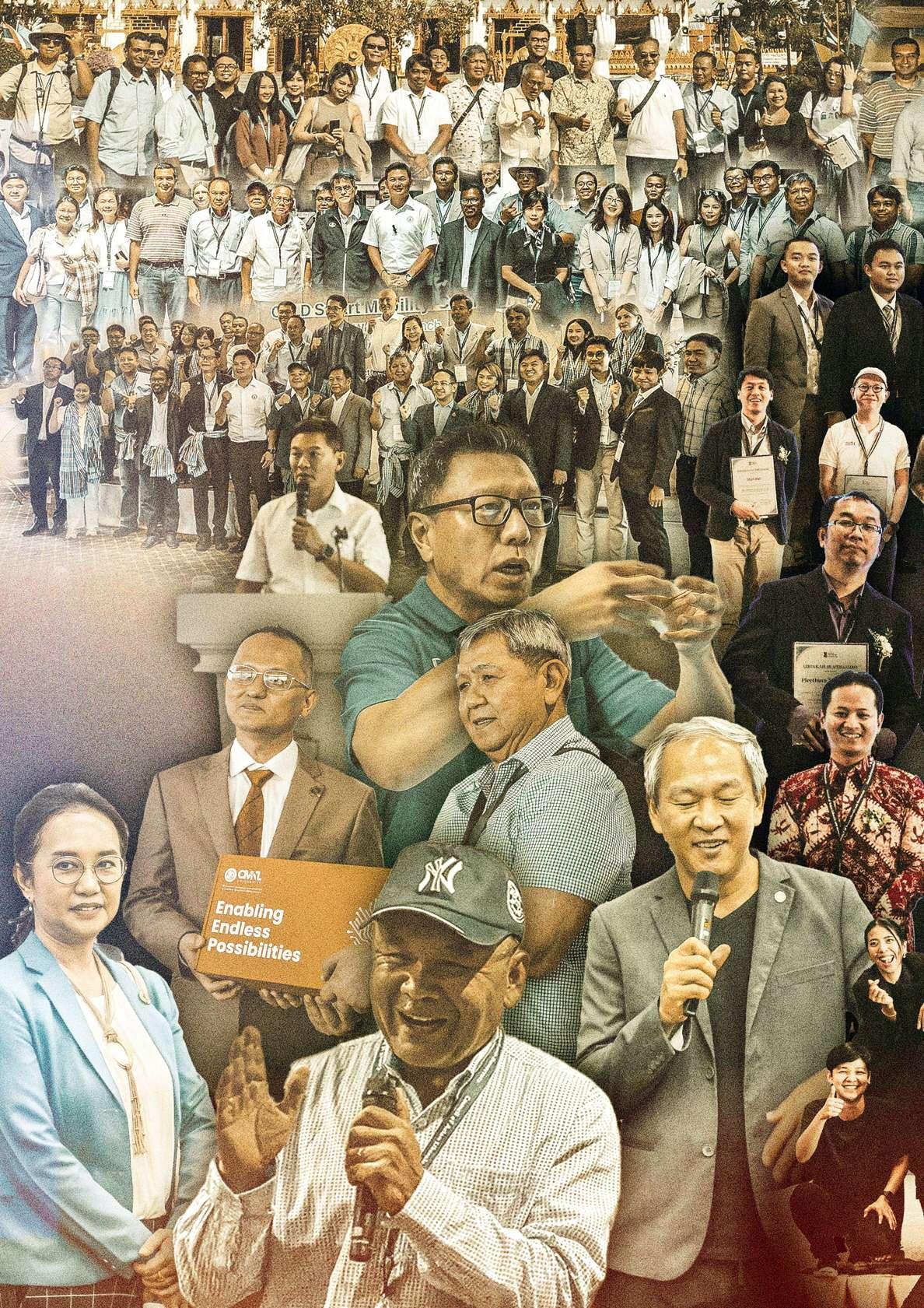
CALD SMART MOBILITY CONFERENCE
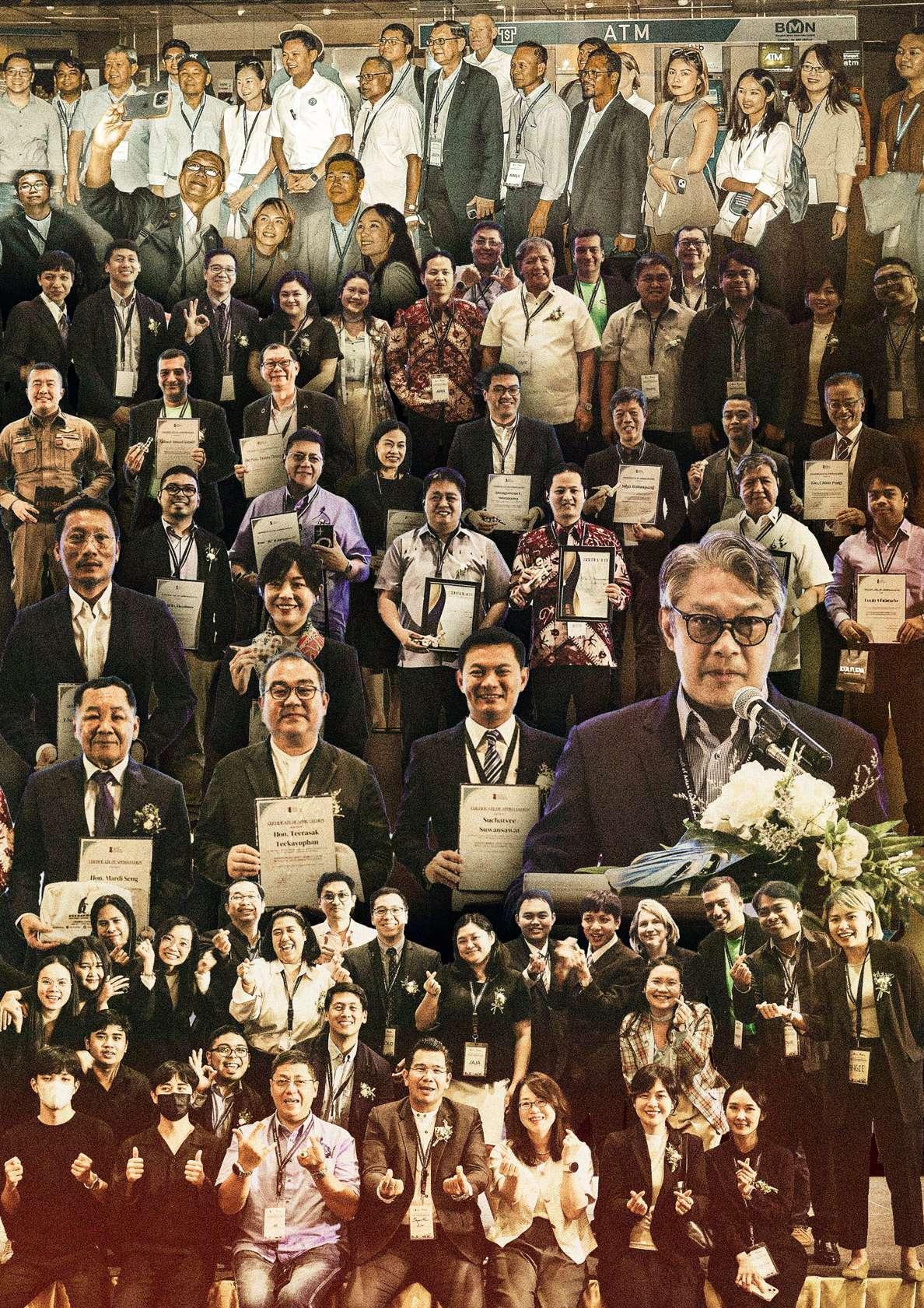


STATEMENTS & LETTERS
CELEBRATIONS, BUT ALSO GROWING CONCERNS

The year 2024 was not exactly great for democrats and liberals across the world, but there were significant events involving the CALD family that had it occasionally breaking in celebration. Indeed, most of the letters CALD sent in 2024 were congratulatory ones for election wins.
democracy” and “goes beyond the borders of Taiwan.”
On 14 January, just a day after the presidential and legislative polls in Taiwan, CALD was already busy sending out letters of congratulations to Presidentelect William Lai and Vice President-elect Bi-Khim Hsiao of the CALD member Democratic Progressive Party.
In its letter to Lai, CALD noted the “unprecedented victory” achieved by the people of Taiwan and the DPP. It wrote, “The election result is a testament to the efforts of the DPP and President Tsai Ing-wen are on the right direction, and
that your victory is a crucial step toward the fulfillment of Taiwan’s vision of achieving lasting peace and stability in the region. We are optimistic that under your leadership, crossStrait issues can be a subject of more constructive and meaningful dialogue, not just with China, but also with other neighboring nations.”
CALD also praised Lai, saying, “Your determination as you rose from the ground in your political career is an inspiration to the liberal family. You have proven –time and again – that hard work and heart for service can bear fruit in terms of people’s trust.”
In its letter to Hsiao, CALD said that DPP’s victory “highlights the vibrancy and positive impact of
CALD expressed confidence that what President Tsai had started would be sustained and expanded through the leadership of President-elect Lai Ching-te, with Hsiao by his side. It also told its former Chairperson: “We are truly proud of you, Bi-Khim. We’ve seen how you’ve fought against the powers that be to defend the rights of the people and how you’ve skillfully integrated international cooperation and solidarity into the mantle of effective policies and public service.”
It added, “Your victory will serve as an inspiration to CALD members, particularly those who continue to struggle against authoritarianism.”
JAN 15
CALD took pen to paper as well for a letter of thanks to DPP Deputy Secretary General Andrea Yi-Shan Yang for the time and effort the party had spent hosting the CALD election
observation delegation. In its 15 January letter to Yang, CALD said that even if DPP had “a lot more important things to focus on” during that critical stage in the campaign, “we still felt the warm hospitality and generosity of your team.”
“The members of CALD as well as the LI delegation are not just happy because of the turnout,” CALD wrote, “but also because of the peaceful and honest conduct of elections. They’re also happy to learn from the way DPP addressed disinformation and threats from external forces. Hopefully, we can further learn from this campaign and integrate the discussion to some of our CALD workshops.”
the still challenging political environment in your country.”
“Your election is a speck of hope amidst the worsening situation in Cambodia,” CALD said. “With the impending return of Hun Sen in politics as senate president, and with his sons Hun Manet and Hun Many serving as prime minister and deputy prime minister respectively, it appears that Cambodia has turned from a one-party state to a one-family state. Given this appalling concentration of political power, the opposition needs to maximize all available spaces for dissent—and we see your new position as one possible avenue to check all the powers that be.”
“With you as leader of the opposition,” CALD said, “we have confidence that the CDP would be in a better position as the party prepares for the upcoming general elections. We in CALD believe that Japan, as a supposedly mature democracy, should have a competitive party system where multiple parties can realistically win elections and assume governmental power. With you as CDP president, we sincerely hope that Japan can again witness the victory of an opposition party against the dominant Liberal Democratic Party (LDP) in the polls.”

Just a few weeks later, no less than CALD Chairperson Mardi Seng was receiving a congratulatory letter from CALD for his victory in Cambodia’s 25 February senatorial polls. In its 27 February letter, CALD sent Mardi Seng its best wishes as he “assumed this new role amidst
Earlier that month, CALD had been visiting CDP as the party was in the midst of its internal elections, as well as preparing for Japan’s general elections. In a 16 September letter addressed to MP and CDP International Bureau Director General Kentaro Gemma, CALD expressed deep appreciation for the hospitality and generosity shown by CDP to the Council’s delegation. It also said that it FEB 27 SEPT 24 SEPT 16
A CALD congratulatory letter dated 24 September also made its way to Japanese MP and former Prime Minister Yoshihiko Noda, who had then just been elected president of the opposition Constitutional Democratic Party.
was hopeful that CALD and CDP could “further deepen our cooperation on the issue of democratizing political space and preventing one-party dominance.”
“Moreover,” CALD wrote, “we share your concerns on the worsening situation in Myanmar…. On this and other issues relating to democracy, human rights, and the rule of law, we have no doubt that CALD and CDP can achieve more together.”
CALD said that it looked forward to the “possibility of working more closely with CDP as CALD full member in the future.”
SEPT
16
CALD, though, also reached out to Japanese House of Councillors member Hiroshi Yamada of the LDP, who had also extended valuable assistance to the CALD delegation during its September visit to Tokyo. In a letter also dated 16 September to Yamada, CALD said that the political meetings the veteran politician arranged were “most useful” for the delegation “to understand the complexities of Japan’s political party dynamics and the prospects for the upcoming general
elections.” CALD Chairperson Mardi Seng also took the opportunity to thank Yamada for the meetings with his fellow Cambodians that “provided a space for us to update each other not only of political developments but also of our personal circumstances, in a safe and secure environment.”
DEC

supporting and empowering liberal parties, and reinforcing our shared commitment to human dignity resonates deeply with all of us who believe in the transformative capacity of liberal values. It is with great anticipation that we look forward to the progress LI will make under your leadership, ensuring that liberal democracy remains a beacon of hope in the face of rising global challenges. Once again, congratulations on this remarkable achievement.”
3 APR
CALD’s last congratulatory letter for the year travelled beyond Asia. Dated 3 December, the letter was addressed to Dr. KarlHeinz Paqué, who had been elected as President of Liberal International.
CALD lauded Paqué’s” steadfast commitment to the ideals of liberalism as an elected member of the Federal Executive Committee of Germany’s Free Democratic Party (FDP) and as Chairman of the Friedrich Naumann Foundation for Freedom have consistently demonstrated your deep dedication to human rights, freedom, and democracy.”
Among other things, CALD also told Paqué: “Your strategic focus on strengthening the international liberal movement, building bridges across continents,
4
There was, however, one letter that CALD wrote with great sadness and concern. Addressed to Taiwan, the 4 April letter extended CALD’s “heartfelt support to the Taiwanese people as they reel from the impacts of the 7.4 magnitude earthquake” just the day before.
“Amidst the loss of lives and property,” CALD said, “we remain in solidarity with Taiwan during this difficult time. CALD believes that Taiwan will rise up from the shadows of this tragedy and remain on course in rebuilding the nation.”

CALD’s two statements in 2024 meanwhile covered a liberal’s legal triumph in one country and democratic regression in another. On 26 June, CALD released its first statement for the year, which welcomed the dismissal of “all the drug-related cases against Leila de Lima, former Philippine senator and now spokesperson of the Liberal Party of the Philippines, a CALD full member-party.”
“The dismissal of all the charges against de Lima proved that human rights organizations and activists have been correct all along – that the cases filed were fabricated and politically motivated,” CALD said. “Through the years, CALD has released a number of resolutions and statements calling for de Lima’s immediate and unconditional release as the charges were clearly part of the Duterte administration’s political vendetta against her.”
But it pointed out, “While the dismissal of all cases against de Lima should be celebrated, this should also be a reminder to exact accountability from all those who conspired to put the former senator behind bars on trumped up charges. This is to prevent the weaponization of the justice system against
political opponents in the future, and for the rule of law to be free from the political whims of the incumbent.”
CALD then called on the Marcos administration “to cooperate fully with the ongoing investigations of the International Criminal Court (ICC) on drug war-related killings – an issue that cost de Lima her freedom for seven years.”
Asserted CALD: “De Lima’s vindication would not be complete unless the victims of the drug war also get the justice that they so rightfully deserve.”
DEC
3
The second – and last – statement of CALD for the year was released on 3 December and revealed the Council’s growing concern over the “deteriorating state of democracy and rule of law in Indonesia.” In the statement, CALD said that it was alarmed over “moves to circumvent the law to benefit the personal interests of the few seriously compromise the hard-won democratic rights of the Indonesian people.”
“Indonesia has made significant strides in strengthening its democratic institutions and
processes since the fall of Soeharto,” CALD stressed, but actions “by the Jokowi and Prabowo administrations in recent general and regional elections erode the fundamental principles of democracy, violate the rule of law, compromise fair electoral competition, and prevent the genuine expression of the Indonesian people’s will.”
CALD called on Indonesian state institutions and personnel, including those in the police forces, to maintain independence and neutrality and resist moves that would make them instruments in advancing the interests of only those in power. It also lauded the Indonesian Democratic Party of Struggle for sanctioning Joko Widodo, “his son, and his son-in-law by dismissing them from the party, and for being the voice of the opposition amidst the government’s attempts to centralize political power.”
Moreover, CALD commended the Indonesian civil society and the general public “for their ardent defense of democracy and the rule of law, as seen most recently in the August 2024 protests.”
The Council implored the international community “to be cognizant of democratic backsliding in Indonesia, and to take the necessary measures to assist the country in preventing further democratic decline under the Prabowo administration.”

A MEETING OF LIKE MINDS
CALD usually has several items to tick off its list whenever it goes somewhere, and its joint election observation mission with Liberal International in Taiwan in January was no different. On 16 January, after the successful conclusion of
territories across the globe to make political systems fairer, more inclusive, and more accountable. Taiwan is one of the most recent additions in the list of places where WFD operates.
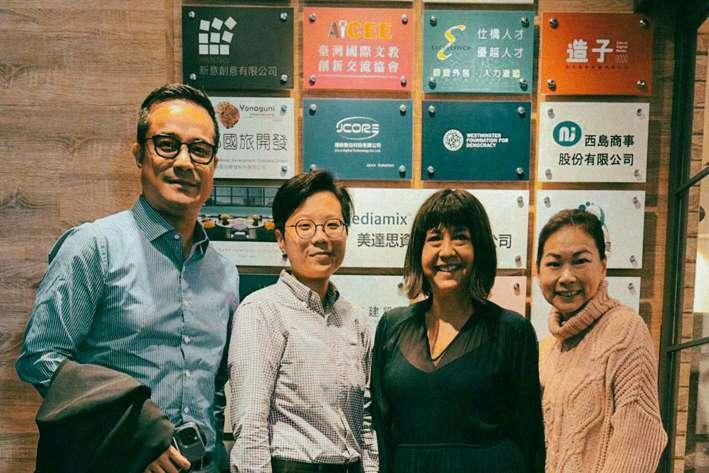
the mission, CALD Secretary General Francis Abaya and CALD Women’s Caucus Chairperson Jaslyn Go met with officials of the Westminster Foundation for Democracy (WFD) in Taipei.
WFD is a U.K. public body that has spent the last three decades working to strengthen democracy around the world. It is currently operating directly in more than 30 countries and
The CALD officials were received by Naomi Barnard, WFD senior program manager in East Asia and the Pacific, and Nai-chia Chen, WFD program coordinator. Apart from discussing the results of the Taiwan elections, they also talked about the work of the WFD in the region, and particularly in Taiwan.
Abaya and Go expressed CALD’s interest to collaborate more with the WFD. Go recalled how impressed she was with the workshop on violence against women in politics that WFD had conducted on the sidelines of the 2023 Bali Civil Society and Media Forum. Go had attended the workshop, which she said was very insightful. She also said that she would incorporate her learnings on both the process and content of the workshop in future CALD Women’s Caucus events. For instance, she told WFD, she planned to have a special session on sexual harassment, promoting awareness of the code of conduct amongst participants, and designating personnel to ensure that all CALD events remain to be a safe space.
“As liberals and democrats, we put premium on creating an environment where all people, regardless of race, ethnicity, religion, gender, or inclination can exercise their freedoms and realize their full potential,” said Go. “In the CALD Women Caucus, we want to realize this first by ensuring that the content and process of our events do not make anyone feel uncomfortable or unsafe. We hope that the WFD can partner with us in taking this initial step, so that we can be of greater assistance in making the region safer and more inclusive.”
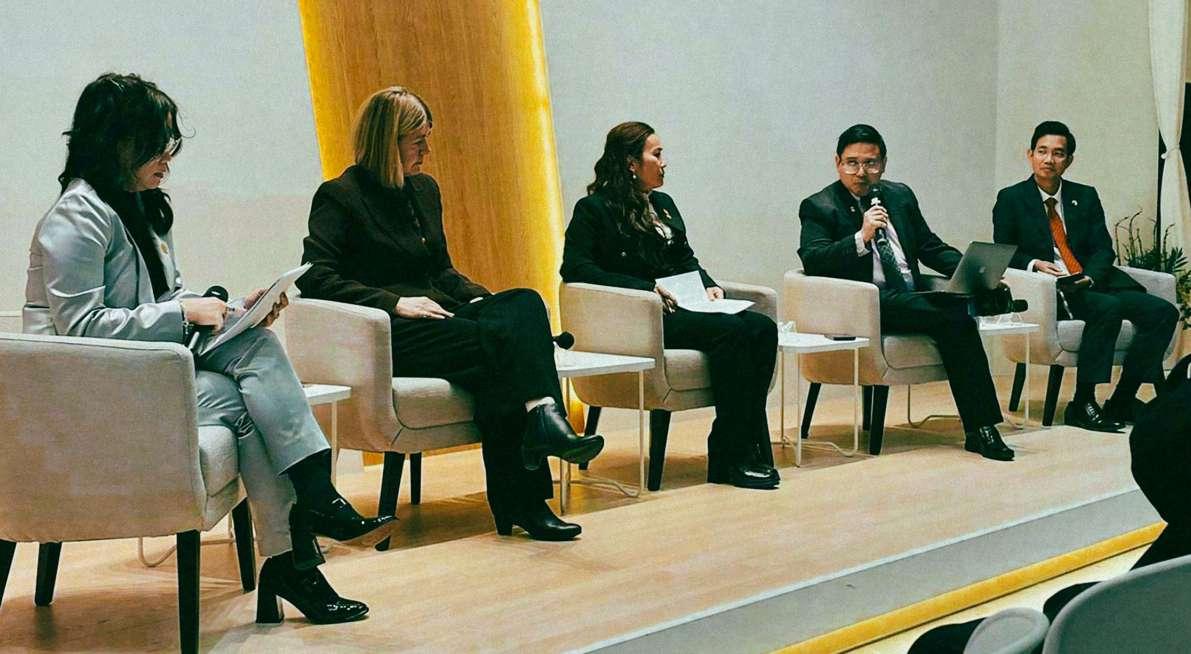
Many challenges, but also many opportunities
The CALD family has spent the last decade or so pondering over why democrats and liberals have been finding themselves in increasingly slippery slopes across the world. Many of its friends and partners have been doing the same. In March, one of them, the Global Democracy Coalition (GDC), invited CALD to do the pondering together, but with an Asian focus.
Held in Seoul, South Korea on 14 March with the theme “Asia’s Democratic Landscapes: Navigating Challenges and Embracing Opportunities,” the forum delved into perspectives on democracy in Asia, as well as the challenges, opportunities and future directions for democratic governance in the region.
CALD Executive Director Lito Arlegue spoke in the first panel with Vanna Hay of Khmer Movement for Democracy, Elise Pham of the Vietnamese Nationalist Party, Wen Lii of Democratic Progressive Party of Taiwan (via video message) and Leena Rikkilä Tamang of International IDEA. Hay and Pham tackled the immense challenges faced by democracy activists in the face of autocratic regimes in their respective countries. Lii meanwhile highlighted Taiwan’s democratic achievements while still recognizing the threats coming from its giant

neighbor. Tamang took a regional perspective, citing common challenges in Asia such as the role of armed forces and political dynasties, restricted civic space and curtailed elections, and the exclusion of minority groups, women and the youth in politics.
Like Tamang, Arlegue also looked at the issues from a regional standpoint, noting that the challenges to democracy in Asia come from both authoritarian and democratic-turned-populist leaders. He pointed out the people’s dissatisfaction with democracy and the corresponding failure to advance the democratic narrative, as well as the role of money in politics.
“Why do the military in Thailand or Myanmar intervene in politics?” asked Arlegue. “Why are political dynasties or political families widespread in countries like the Philippines, Indonesia or Cambodia? Why is corruption rampant in both the public and private sector in South Korea, Malaysia and others? It is because military, political, and business elites have economic interests to protect, and they look at politics as a means to protect those interests.”
The second panel focused on the narratives and strategies for democracy in Asia, with its speakers including Ian Walker of the New Democracy Foundation; Anil Verma of the Association for Democratic Reforms; James Gomez of Asia Centre; and Seonhee Kim of the East Asia Institute. After their presentations, there were short group discussions that aimed to synthesize the key points so they could be organized and presented, first in the GDC Global Forum (15 March), and eventually, to the 3rd Summit for Democracy (18-20 March).
Despite the gravity of the democratic challenges in Asia, the forum ended on a positive note by emphasizing the opportunities that democracy activists and supporters can harness. Among these are the power of elections to bring about political change; the increasing importance of countervailing institutions; the use of new and clever ways of expressing dissent; the continuing public confidence on democracy despite its perceived failure; and the strength of the youth and broader civil society in the region.
“Given the geographic size, geopolitical importance, and economic clout of Asia, the way democracy flourishes or flounders in this part of the world will have significant implications for the future of democracy globally,” Arlegue noted in his presentation.
“Asia’s democratic prospects still depend on how we navigate the challenges and embrace the opportunities as democracy supporters and activists,” he also said. “In this process, what we can be certain of is that we have the people on our side, and they are counting on us to make democracy work and succeed for the future of the region.”

A CALL FOR SYNERGY & SOLIDARITY
“The times call for cooperation, not for conflict or competition.”
This was the key message in the panel discussion organized by CALD on 19 March in Seoul, South Korea as part of the 3rd Summit for Democracy. With the theme “Building Synergy and Intergenerational Solidarity: Asian Political Parties and Civil Society for Democracy,” the CALD panel discussion had these as premises:
• In Southeast and East Asia, recent elections— particularly those held in the Philippines, Thailand, Taiwan, and Indonesia (and even the upcoming elections in South Korea)—appear to reflect a growing gap between democratic political parties and the youth/broader civil society.
• This worrying trend is happening in the context of democratic backsliding (both globally and regionally), which is marked by continuing restriction of civic space, tightening grip of authoritarian/populist leaders, and exercise of sharp power of hegemonic authoritarian states.
The CALD event was a nice fit for the summit’s theme, “Democracy for Future Generations.” Hosted by the South Korean government, the 2024 Summit for Democracy was the first of its kind to dedicate a full day for events organized by the cohorts, civil society, and the youth.
The CALD panel discussion, held in cooperation with Asia Centre, was part of the “Partners for Democracy Day,” an initiative of the Global Democracy Coalition (GDC) “to provide a platform for civil society, international organizations, academic institutions, think tanks, philanthropic organizations and the private sector that want to make their voices heard in the Summit for Democracy discussions and the global democracy debate.” Both CALD and Asia Centre are members of the GDC.
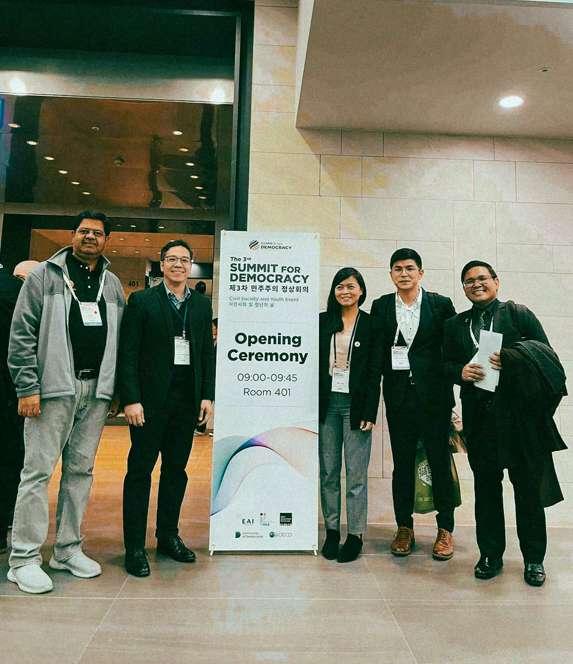
International IDEA provided support for the CALD panel discussion, which had CALD Executive Director Lito Arlegue as moderator. To ensure the discussion would be dynamic and full of interesting insights, CALD took care to have an intersectoral, intergenerational, and gender-balanced panel.
Among the panel members were: James Gomez, regional director of Asia Centre with over 25 years of experience working for various INGOs, IOs, universities, and think tanks; Alysa Wenli Chiu, international affairs deputy director of the Democratic Progressive Party of Taiwan, with experience in electoral campaigns, both in Taiwan and the United States; Jeremiah Tomas, chairperson of the CALD Youth and Student Affairs Coordinator of the Youth Wing of the Liberal Party of the Philippines; and Jieun Jeong, graduate student and researcher at Korea University, with interests in human rights, gender equality, migration, and climate justice, among others.
The discussion yielded these as among the possible causes of the widening gap between democratic political parties and the youth/civil society:
• Failure of democratic political parties to adopt a progressive agenda or to advance the issues of the youth and civil society when they were in power;
• Fear on the part of the youth and civil society to cooperate with political parties as the latter were perceived negatively by the general public; and
• Inability of mainstream political parties to adapt to rapidly changing technology, resulting in difficulties in engaging the youth.
The panel members then made these recommendations to bridge the divide between these democratic forces:
• Form an inclusive pan-Asian democratic collaboration led by Asians and catering, in particular, to the unique democratic challenges in this part of the world;
• Examine the role of parents in facilitating youth political engagement;
• Take into account the different historical contexts of different generations in assessing their support (or lack of it) for democracy;
• Reform the elitist and “establishment” image of mainstream political parties; and
• Take steps in organizing genuine intersectoral/intergenerational dialogues to build trust and facilitate understanding among democratic actors.
The Summit for Democracy was initiated by the United States under the Biden administration “to renew democracy at home and to confront autocracies abroad.” The inaugural summit was held virtually in 2021, while the second summit in 2023 was conducted in hybrid format and had the governments of Costa Rica, the Netherlands, Republic of Korea and Republic of Zambia co-hosting with the United States.
The three-day Seoul edition of the summit also included a ministerial conference and a virtual plenary with heads of state and government.
From Germany, with lessons.

Gaining new skills, as well as fresh perspectives, is always welcome in CALD, which is why CALD Program Officer Chelse Racar Caballero hied off to Gummersbach, Germany in mid-April. The International Academy for Leadership (IAF) was holding a seminar, “Moderation: Facilitation and Program Design,” there from 14 to 26 April, and Caballero was among the program managers and staff from across Asia, Africa, Europe, Latin, America, and the Middle East invited to participate.
The seminar aimed to create a space where participants could experience and engage with liberal values not just through discussions but through the very design and feel of the event. This was ably delivered by facilitators Marike Groenewald and Clinton du Preez from South Africa-based Anew, a renowned organizational and leadership development consultancy.
Groenewald and du Preez’s expertise and innovative approach guided participants through an immersive learning experience even as they discussed the primary aspects of facilitation. First, the participants explored their personal facilitation styles, focusing on purpose, values, empathy, relationship-building, and self-awareness. Next, they were given hands-on practice on how to design and implement engaging and meaningful events. They experimented with different facilitation methodologies, navigated the full event design cycle, used empathy-based tools to understand participant perspectives, and addressed challenging facilitation situations.
The participants also enjoyed special sessions in Berlin, where for three days they engaged in workshops on visual facilitation, trends in learning and gatherings, and moderation in action. Additionally, a day trip to Cologne offered cultural exploration and enabled participants to further network among themselves.
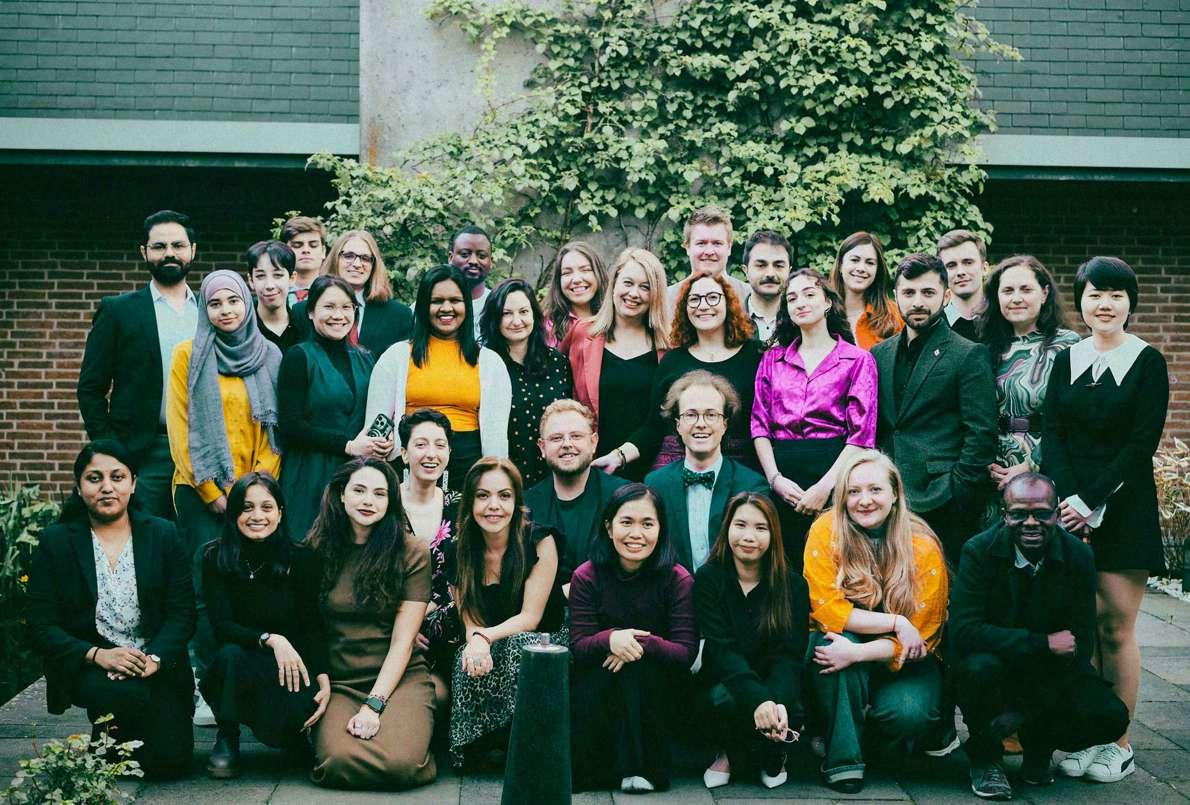
At the seminar’s close, Groenewald said that she was at a loss for words to describe how great everything turned out.
“How do you capture 12 amazing days spent with a group of 29 facilitators and event organizers from around the world, in words?” she asked. “It’s so difficult to accurately convey the moments of joy, reflection, realization, curiosity and wonder. To do justice to the deep connections that were formed between former strangers from divergent cultures and languages in such a short amount of time. To express adequate gratitude for the trust and generosity that this group has shown us in allowing us to be their facilitators for this experience. And for them to co-facilitate that magic so beautifully with us.”
For her part, CALD’s Caballero said she had a renewed sense about the importance of meaningful communication and resolved to incorporate what she learned at the seminar into CALD’s programs.

“In our journey, we’ve learned that oftentimes, we equate speaking with power,” said the CALD program officer. “But sometimes power lies in silence. And the only thing worse than not speaking is speaking with no substance.”
Caballero said that she was thankful for being able to attend the seminar. “I am grateful for the opportunity that CALD, FNF and IAF has given me,” she said. “Thank you also, Marike, Clinton and the rest of the delegation, for helping us not only appreciate the silence in between, but also learn how to be in tune with our inner voices; not only voicing out directions but also turning that voice into power. Thank you for this transformative experience that provided us tools and knowledge toward reflective and intentional programs at CALD.”
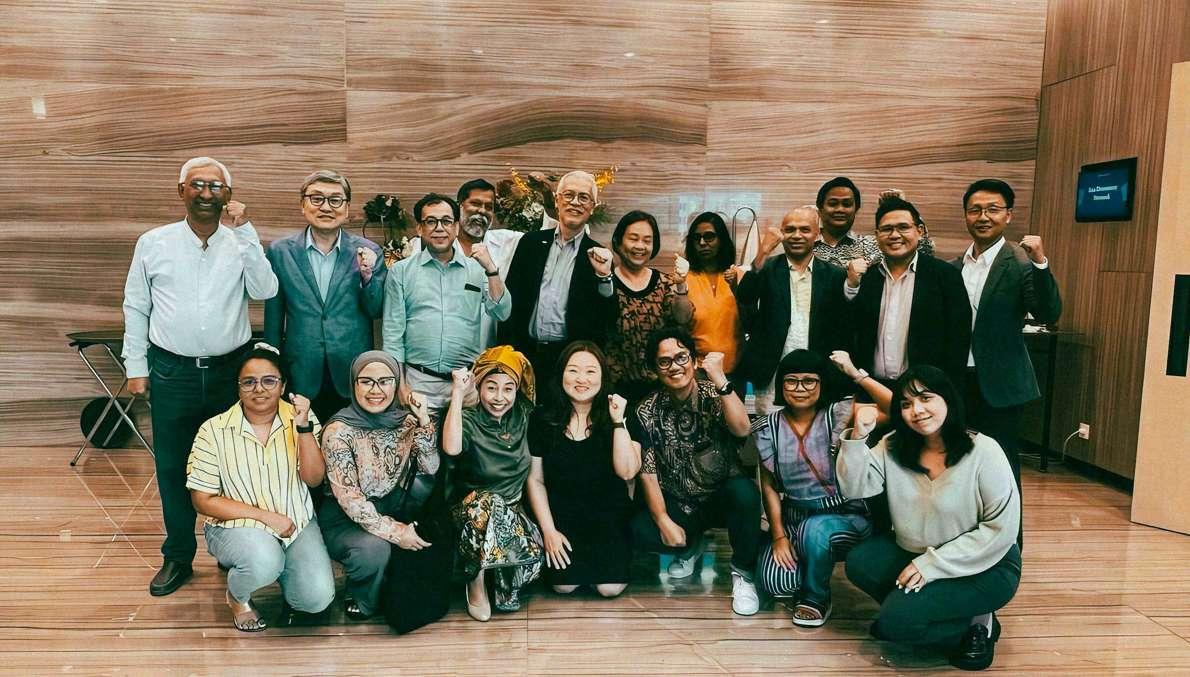
CALD joins ADN
CALD officially became an associate member of Asia Democracy Network (ADN) during the latter’s 4th General Assembly and 14th Governing Council Meeting in April.
Officially launched in 2013 in Seoul, South Korea, ADN describes itself as “an umbrella network of diverse regional networks and national organizations specializing in various themes and issues in Asia, all with the aim to promote and defend democracy in the region.”
Its vision is “to promote and advance democratization and democratic governance at all levels of society through effective solidarity and cooperation among civil society organizations and democracy advocates in Asia.” Its goal meanwhile is “to build a stronger regional democracy network and movement engaged effectively
in international advocacy and engagement with governments, inter-governmental organizations and other stakeholders in Asia and beyond.”
Jakarta, Indonesia was the site of ADN’s 29-30 April events. Apart from CALD, ADN also welcomed the ASEAN SOGIE Caucus and Asian Indigenous People’s Pact to its growing family.
In CALD’s application to ADN, then CALD Chairperson Francis ‘Kiko’ Pangilinan said that CALD “believes that unity and solidarity among democratic forces are needed during these critical times when anti-democratic actors are working together to undermine democracy, fundamental freedoms and the rule of law.”
“CALD believes that our membership in ADN can be a mutually beneficial relationship in terms
of knowledge transfer, political advocacy and network-building,” he added. “At this critical juncture in Asia’s democratic development, such partnership is needed so we can be in a better position to address the challenges of authoritarianism, illiberalism, populism, among other democratic threats.”
CALD was represented at ADN’s Jakarta events by Executive Director Lito Arlegue. “On behalf of the CALD Executive Committee, I welcome the decision of the ADN’s Governing Council to grant an associate member status to CALD,” Arlegue said. “This membership is also in line with the vision of the current CALD leadership to forge cooperation and solidarity with other democratic actors. We in CALD are excited to work with the ADN on programs that advance democracy and uphold human rights in the Asian region.”
CALD BASKS IN TAIWAN’S TRIUMPH

After witnessing the Democratic Progressive Party’s three-peat victory in Taiwan’s presidential poll in January, there was no way that CALD was going to miss the inauguration ceremonies for the country’s newest president and vice president.
On 20 May, CALD delegates watched in person what many of them would later describe as “democracy’s finest moment.”
“We bore witness to an exquisite ceremony marking the peaceful transfer of power from one administration to the next,” said CALD Secretary General Francis ‘Blue’ Abaya. “We watched thousands of people cheer as William Lai and Bi-khim Hsiao took their oath as the next president and vice president of Taiwan. It was a beautiful sight, and it reminds us why we continue to fight for democracy at whatever cost.”
In his inaugural address, President Lai described his and Vice President
Hsiao’s journey to Taiwan’s highest posts as a “hard-earned victory for democracy.” He thanked the Taiwanese people for their resolute defense of democracy amidst attempts of external forces to subvert election results.
Describing Taiwan’s democracy as a global beacon, Lai also said, “Democracy, peace, and prosperity form Taiwan’s national roadmap. And they are also our links to the world. As an important link in the global chain of democracies, a glorious era of Taiwan’s democracy has arrived.”
He then called on the people of Taiwan to defend its existence and way of life: “All of the people of Taiwan must come together to safeguard our nation. All our political parties ought to oppose annexation and protect sovereignty, and no one should entertain the idea of giving up our national sovereignty in exchange for political power.”
In true CALD fashion, of course, the Council delegation packed the trip to Taiwan with other to-dos. While the inaugural ceremonies were the highlight of their visit, another important event attended by the CALD delegates was the “Countering Authoritarian Influence in Southeast Asia” forum on 21 May.
CALD had actually organized it with the FNF Global Innovation Hub and the DPP’s International Affairs Department. The forum speakers included FNF Southeast and East Asia Regional Director Moritz Kleine-Brockhoff, CALD Founding Member and Former Philippine Secretary (Minister) Florencio ‘Butch’ Abad, CALD Executive Director Celito ‘Lito’ Arlegue, and Taiwan-Asia Exchange Foundation’s Executive Director Alan Yang.
Kleine-Brockhoff provided a regional overview by dividing Southeast Asia’s recent history into two periods: 1998-2005, and 2006 onward. He observed that from 1998 to 2005, democracy in the subregion was
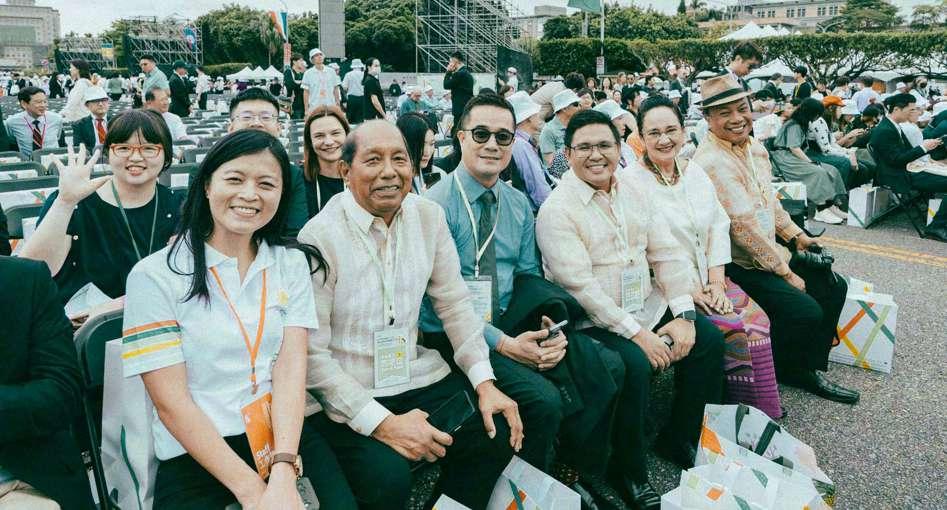

on the rise, reflecting global developments. Yet beginning from 2006, he said, democracy had been seemingly on decline, not only in Southeast Asia, but also in the rest of the world.
Abad’s presentation meanwhile was a deep dive into Philippine political history. He argued that recent political developments in the country can be rooted to its colonial history and the resulting structural inequities it fosters. In particular, Abad noted how Spanish and U.S. colonization preempted the development of the Filipinos’ sense of nationhood, and raised the specter of political elites by tapping them to serve in the colonial administration. As a result, he said, political dynasties persist to this day, and Filipinos seem to be trapped between choosing to perpetuate either the Marcoses or the Dutertes.
Arlegue took an organizational approach by looking at the experience of CALD, particularly its work in Myanmar, Cambodia, and Taiwan. Arlegue said that CALD’s unique brand of party-to-party diplomacy in these countries became an alternative route for political engagement whenever the official/governmental channels were too restrictive. He then enjoined democracy defenders to learn and support each other, embrace their fear, stand up to bullies, and prepare for the long haul by taking care of each other.
Yang’s main argument was that China weaponized interdependence against Taiwan by using the socalled “5Ms”: money, media, misinformation-information warfare, mooching (cultivating local compradors), and
manipulation. In order for Taiwan to counter these, he proposed the “3Es”: ensuring the diversification of national security, enlightening the population about authoritarian practices, and empowering the youth.
The CALD delegation also took time to unwind a bit, courtesy of a full social calendar. On 19 May was the welcome reception for delegations to the presidential inauguration hosted by the Ministry of Foreign Affairs. The next day was a tour of prominent liberal thinker Prof. Hai-kuang Yin’s residence, and then a meeting with the DPP Acting Secretary General Andrea Yi-shan Yang, Youth Department Deputy Director Shung-wen Huang, and International Affairs Department Deputy Director Alysa Wen-Li Chiu on 21 May.
Some delegation members paid a courtesy call with Vice President Bi-khim Hsiao on 22 May as well. The visit provided an opportunity to briefly discuss common security threats between Taiwan and the Philippines, and to reminisce about the times when Hsiao served as CALD chairperson and secretary general.
“What Taiwan has become in terms of having a developed economy, open society and engaged citizenry is an inspiration for many of us in Southeast Asia,” CALD Secretary General Abaya said. “So thank you, Taiwan, for reminding us what our countries could look like under a working democratic system.”
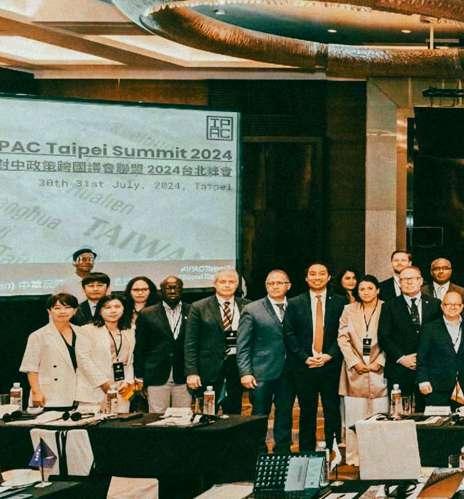
ONE WITH TAIWAN
IPAC’s Fourth Annual Summit was packed, and was even touted as the largest gathering of lawmakers that Taiwan had ever hosted yet.
With 49 lawmakers from 24 legislatures across five continents, it was at the very least one of the most important international events to be held in Taiwan in 2024. Representing CALD at the 30-31 July Summit was Secretary General Francis ‘Blue’ Abaya, himself a former legislator.
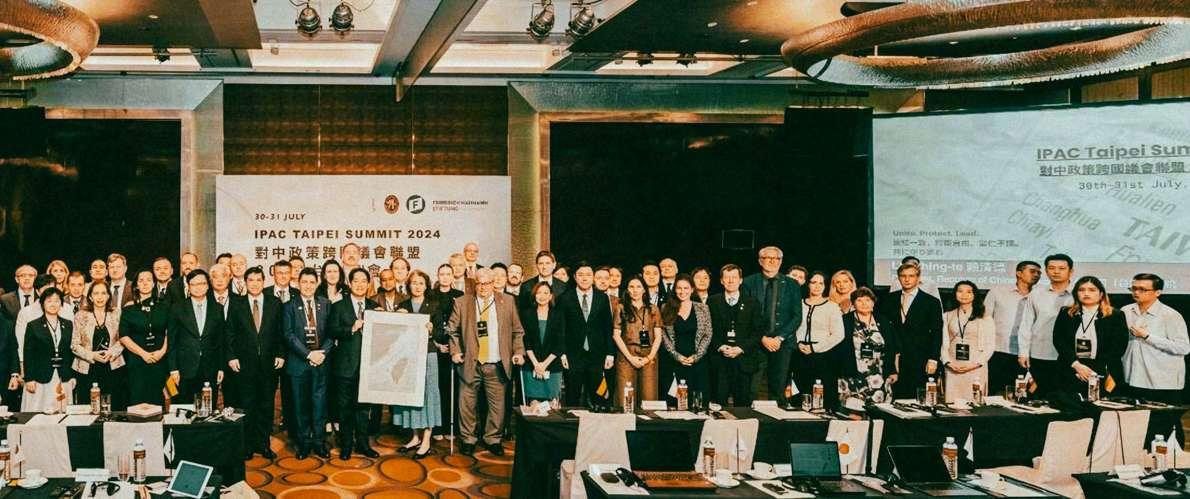
IPAC is the acronym of the Inter-Parliamentary Alliance on China. At its 2024 summit in Taipei, no less than Taiwan’s President Lai Ching-te, Vice President Hsiao Bi-khim and Deputy Foreign Minister Tien Chung-kwang were among its distinguished guests. The event thus received significant media coverage not only in Taiwan but also across the world, with the Summit activities being reported in six continents.
“Your presence here is at a very important moment as we strive to make Taiwan much more resilient in our own self-defense, and also resilient in our democracy, resilient in our society, and resilient in our economy,” Vice President Hsiao told the legislator-delegates in her welcome remarks. She also spoke of a “common and shared agenda of ensuring democracy, peace and prosperity,” a theme that was repeated by President Lai in his keynote address.
“Taiwan needs the world, just as the world needs Taiwan,” said Lai. “Advancing democracy, peace, and prosperity is our common goal.”
Taiwan aimed to achieve this, he said, by taking as a guide the Four Pillars of Peace action plan, which includes strengthened national defense; improved economic security; enhanced cooperation with other democratic countries; and stable and principled crossstrait leadership.
Listening to the inspiring speeches of Lai and Hsiao, however, was not the only thing CALD’s Abaya was able to do at the summit. As a guest of IPAC, he also witnessed the lightning talks on transnational repression and encryption regulation that were given at the summit. In addition, he attended the lunch session with UN Nobel Peace Prize laureate Maria Ressa, as well as the presentation of the legal team of Hong Kong media owner and political prisoner Jimmy Lai.
Other summit activities that Abaya participated in included the briefing on the history and legal status of UN General Assembly Resolution 2758, which recognizes the government of the People’s Republic of China as the sole legal government representing the whole of China. This briefing
also touched on the importance of Taiwan to global and regional economies, as well as the impact of a possible blockade in the Taiwan Strait.
The CALD secretary general also joined a brunch organized by the FNF Global Innovation Hub that provided an opportunity for more than a dozen local civil-society organizations to meet IPAC delegates.
“It was a huge honor to represent CALD in this global gathering of parliamentarians supporting the cause of Taiwan,” Abaya said afterward. “The concrete actions adopted by the delegates to support Taiwan, such as Operation MIST (Measure the Impact of Shock in the Taiwan Strait) and 2758 Initiative demonstrate that Taiwan is not alone in its fight for the preservation of its democratic way of life. CALD stands together with IPAC in ensuring democracy, peace, and prosperity in Taiwan and in the broader Asian region.”
Tackling the abominable shrinking civic space
It’s not your imagination, civic space has really been shrinking across the world. But in its 9th Asia Centre International Conference, Asia Centre chose to highlight as well the fight being put up by liberals and democrats against rights abuses.
“It is indeed alarming that civic and democratic spaces have been shrinking over the years, but it’s even more daunting if we don’t act on it,” commented Cambodian senator and CALD Chairperson Mardi Seng, who was at the conference that was held 21-23 August in Bangkok, Thailand. “We have to realize that the efforts of democratic forces, no matter how small, push the boundaries toward societal change and genuine reform.”
The conference, which had as the theme “Shrinking Civic Space in Asia: Stories of Resistance and Pushback,” attracted some 120 participants
from across the region. CALD had a panel at the event that focused on what had been happening to those pushing back despite the risks. With the theme “Criminalization and Persecution of Changemakers,” the CALD panel was led by Mardi Seng, with the other speakers including Kaka Bag-ao, former congresswoman and governor of Dinagat Islands, representing the Liberal Party of the Philippines; Jasly Go, chairperson of the CALD Women’s Caucus and cadre member of the Singapore Democratic Party; and Freddy Lim, former member of parliament of Taiwan and a member of the Democratic Progressive Party. The panel was moderated by CALD Program Manager Paolo Zamora.
The CALD chairperson recounted the difficulties of being a senator in a challenging political environment. But he said that the smallest victories
spark hope and motivate him to continue to forge ahead and make a difference.
The Philippines also has had its share of control-driven administrations. Alternative lawyer Bag-ao explained the impunity and tyranny demonstrated by the Duterte administration by citing the controversial cases of Nobel Peace Prize Laureate and Rappler CEO Maria Ressa, who faced tax-related charges, and former senator Leila de Lima, who was charged with drug-trafficking. Both Ressa and de Lima are now cleared of all charges.
“The strength of a democracy lies in its ability to tolerate dissent, to engage with opposing viewpoints, and to allow space for dialogue and debate,” said Bag-ao. “When dissent is criminalized, when critics are treated as enemies of the state, we witness the erosion of democratic norms. This intolerance
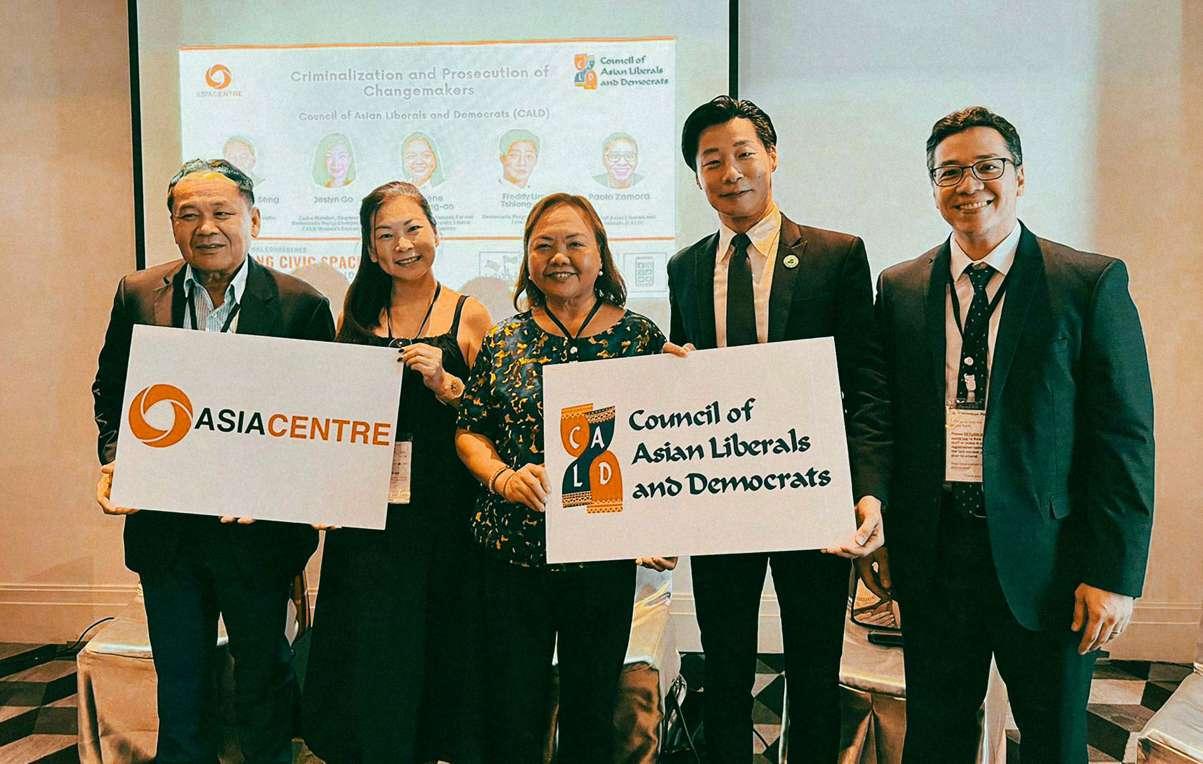
leads to the concentration of power, weakens checks and balances, and ultimately, dismantles the institutions that are meant to safeguard our freedoms.”
Bag-ao also said that the attacks on Ressa and de Lima, apart from being triggered by their work, were “rooted in patriarchal norms and are designed to discourage women from participating in the public sphere.”
Go, for her part, chose to focus on freedom of speech, which she described as “the cornerstone of a vibrant democracy.” An opposition member in Singapore, she said that in a country where draconian laws are passed such as the Protection from Online Falsehoods and Manipulation Act 2019 (POFMA) and the Foreign Interference Act (FICA), defending fundamental rights of critical voices must be upheld.
Lim, meanwhile, emphasized the role of the youth in fighting disinformation and in strengthening international cooperation. A heavy metal rockstar turned politician in Taiwan, he pointed out that although his country is seen as a model of freedom and democracy, it is still navigating through the influence of its authoritarian past. Its ability to support and empower democratic movements in Asia is crucial in its pushing forward, he added.
Participants looking for examples of cooperation did not have to look far as CALD and Asia Centre renewed their partnership on the conference sidelines, with Mardi Seng and Asia Centre Regional Director James Gomez signing a memorandum of agreement to organize and coordinate platforms for discussion and cooperation.
“We have been in partnership with Asia Centre for a long time,” said the CALD chairperson, “and we believe it’s a meaningful venue, not only to expand and strengthen the CALD network, but also to reach out to the academe and civil society and find common ground to synergize efforts in safeguarding freedom and democracy.”
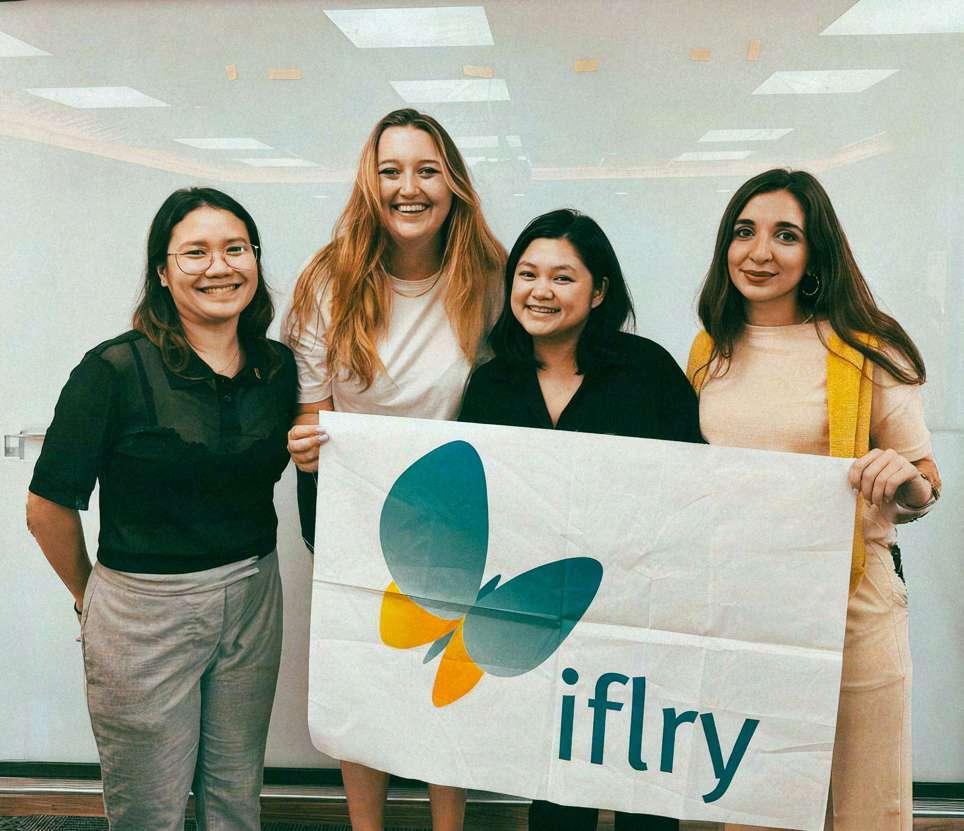
A quarter into the 21st century, women are still finding themselves marginalized in many parts of the world. In positions of power and decision-making, men are often the occupants in far too many places, even if there are more qualified women available to take these seats.
In its bid to help women make themselves seen and heard, the International Federation of Liberal Youth (IFLRY) and Centerpartiets Internationella Stiftelse (CIS) organized a Female Leadership Program for aspiring women leaders and activists. The program, which was held in Taiwan on 22 -25 August, aimed to provide participants with training, mentorship, and networking opportunities to enhance their leadership skills and political participation.

IFLRY has been a longstanding partner of CALD Youth, continually supporting initiatives that empower young leaders across the region. CALD Program Officer Chelse Racar Caballero and Communication Officer Julienne Janolo-Faustino were among the Taipei program’s participants.
For sure, it was no coincidence that the program took place in Taiwan, a country known for its progressive approach to gender equality, freedom, and human rights. The healthy presence of women in Taiwan’s politics and its strong gender movement have also led to significant legislative advancements, such as women-friendly divorce laws and parental leave policies. Taiwan is also the first country in Asia to legalize same-sex marriage, further demonstrating its commitment to equality and inclusion.
PREPARING WOMEN FOR LEADERSHIP

One of the program’s highlights was a field trip to the Democratic Progressive Party of Taiwan’s Gender Equality Department. In Taiwan, DPP is the only party with such a department.
Participants engaged in a panel discussion with the department’s director Yen-Jong Lee. She shared insights about its initiatives and best practices, as well as on the challenges they face in promoting gender equality. Lee also highlighted the achievements of the DPP’s women leaders and the legal framework supporting gender quotas in Taiwan. DPP Youth Director Juan Chun-ta discussed the department’s role in empowering women and youth while Dennis Yang from the DPP International Affairs Department talked about the department’s efforts in advancing the female leadership agenda and its collaboration with organizations like CALD.
The program also addressed the critical issue of mental health, particularly its impact on women leaders, through a session led by IFLRY Vice President Hania Knio. She emphasized the challenges women face in balancing leadership roles with societal expectations, noting, “The pressure to do it all can lead to chronic stress and burnout. It’s crucial to acknowledge that striving for this unrealistic ideal can be detrimental to our mental health.” Hania then provided practical tips for maintaining a healthy mental balance, stating the importance of self-care in leadership.
Indonesian MP Novita Hardini led the session “Cultural Climb: Overcoming Tradition and Barriers.” An Indonesia Democratic Party of Struggle member, she shared her journey of overcoming barriers to rise as a female leader in Indonesia. She encouraged participants to reflect on their own challenges and consider potential solutions to overcome these.
There was a panel discussion as well featuring DPP Deputy Director of the Gender Equality Department Tsai I-wen, Chang Yuan Ting from the Ministry of Health and Welfare, and New Taipei City Councilor Chen Nai-Yu. These leaders shared the realities and struggles they face as women within their own
departments and emphasized the ongoing need for more women in the political sphere.
The participants also explored the importance of personal branding, with Hania leading a discussion on how to effectively present oneself as a leader. In a more personal and reflective activity, the participants identified the values they consider as closest to their characters. This was followed by a collaborative brainstorming session, where the participants, guided by IFLRY Secretary General Tirza Drent, developed project ideas aimed at empowering others and advancing the cause of women in leadership.
At the program’s end, IFRLY reminded the participants that the conversations and discussions would still be continuing. It shared this message: “If you have any stories about your country that you’d like to share, please reach out to us. If you have any achievements, news, or updates, we’d love to hear them. Remember, within this group, you have people who support you, celebrate your successes, and are cheering you on, no matter how far apart we may be.”
Reflecting on the experience, Caballero said, “It is always remarkable to build new connections, listen to refreshing perspectives on different issues, and still find common ground in crafting solutions that will help us deepen our views and generate quality self-reflection. And it is far more thrilling to think that these initiatives and conversations by these amazing women and youth happen in the same room as we are.”
Janolo-Faustino echoed these thoughts, and added, “Working with CALD, I’ve seen time and again how programs like this create powerful and inspiring leaders, and of course, build long-lasting connections. We return to our countries and organizations with minds ready to tackle any obstacles and hearts full of inspiring stories and warmth from the bonds we’ve formed. We are incredibly thankful to IFLRY and CALD for this opportunity.”
Protecting rights in cyberspace
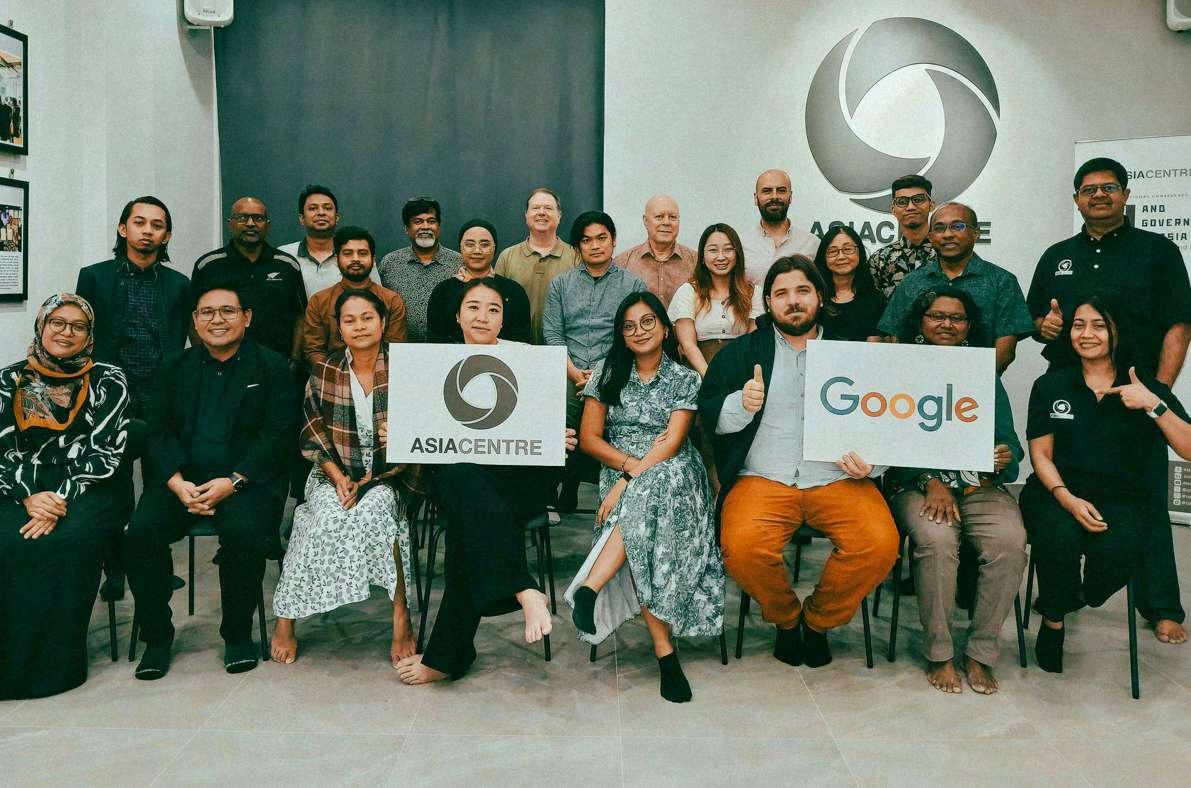
“How equipped are civil-society organizations in protecting human rights in the digital space?”
This was the overarching question that the independent research institute Asia Centre attempted to answer in its “Digital Rights Programme for Civil Society Organizations (CSOs): Regional End-of-Programme Meeting” in Johor Bahru, Malaysia.
CSO representatives from Bangladesh, Cambodia, Indonesia, Japan, Malaysia, Nepal, Singapore, Sri Lanka, Taiwan, and Thailand attended the 25-26 October meeting. CALD Executive Director Lito Arlegue was there as a speaker, sharing his insights on key developments and trends in the region and how these affect digital rights.
Drawing from a report by Digital Reach, an organization which looks at the impact of technology on human rights in Southeast Asia,
Arlegue noted three trends of particular importance:
• The continuing enactment or amendment of laws and legislation to increase control of online space;
• The government’s information control and manipulation of social media; and
• The persisting threats against critics and the political opposition.
He also discussed the various digital tools used by electoral candidates and political parties for campaigning and voter engagement. For instance, Arlegue cited how YouTube and TikTok aided the 2022 presidential campaign of Ferdinand Marcos Jr. in the Philippines, pointing out that the massive corruption and serious human rights abuses under the administration of Marcos Jr.’s father were whitewashed with the help of these apps.
Arlegue also tackled how artificial intelligence (AI) played a crucial role in Indonesia’s 2024 general election, with TikTok again helping then presidential candidate Prabowo Subianto have a successful image makeover. From a former army general who had been accused of rights abuses, Prabowo was able to gain a gentler image partly by using a gemoy (cute) avatar.
“It is crucial for CSOs to enhance their digital resilience amidst the increasing online threats, made worse by tightening authoritarian grip in many countries in the Asian region,” Arlegue said. “This programme by Asia Centre, with the support of Google, is an important step for CSOs to understand the nature of digital security and resilience and to strategize how to stay safe online.”
FEMALES AT THE FOREFRONT
CALD has always believed that when women rise, their communities and countries rise with them. And so when FNF Southeast and East Asia (FNF SEEA0 organized the “WomenUp Democracy” conference on 28 October in Bangkok, CALD Women’s Caucus Chairperson Jaslyn Go and CALD Program Officer Chelse Racar Caballero were among the attendees.
The one-day conference aimed to create a platform that fosters a supportive sphere for female leaders with diverse backgrounds, and to promote gender
equality and democratic leadership. Indeed, a feminine-filled energy was palpable throughout the conference as various women from the Philippines, Thailand, Korea, Malaysia, and Indonesia shared empowering messages, experiences, and insights on the role of women in politics and society.
The morning session began with Former Philippine Senator Leila de Lima, who shared her inspiring journey as a woman opposition leader who became a frequent target of political attacks. Despite the challenges that came
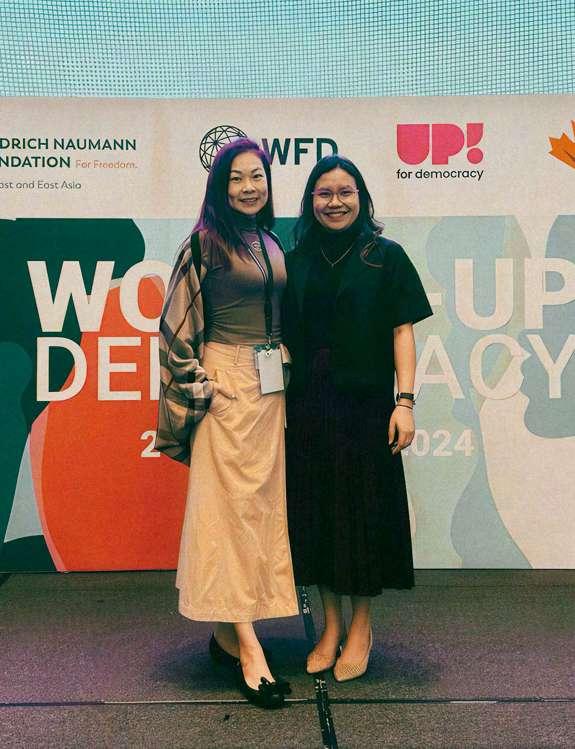

her way, de Lima never wavered in her commitment to serve the Filipino people, particularly those affected by the bloody war on drugs. In her talk, she stressed that women should build up inner strength to be able to survive and thrive in the face of political adversity.
“For too long, we women have been expected to survive in a man’s world, navigating a landscape dominated by patriarchal norms and structures that often seek to silence us,” de Lima said. “But I assert that our fight has shifted. We are no longer merely surviving; we are thriving, leading and demanding our rightful place at the table, because indeed, women hold half the sky.”
A panel discussion led by BBC journalist Panisa Aemocha featured various political leaders, including CALD Women’s Caucus head Go. They discussed their personal struggles and the challenges they face as women working to promote a more inclusive political sphere.
Go herself said, “I may have lacked qualification at first, but my team and I chose to rise above the challenges. Being a politician shouldn’t be limited to gender or background.”
In advocating for a more inclusive space, Go also noted, “Change doesn’t come overnight. It requires courage to break stereotypes and commitment to keep going, even when the odds are against you.”
The afternoon featured an interactive session designed to create political conversations on topics such as mentorship

and networking for female politicians, combatting gender-based violence in politics, work-life balance in political careers, media representation of women politicians, and advancing gender-sensitive politics. These topics were assessed better through the use of the “three-horizon” approach which allowed the participants to unlock ideas and communicate their opinions even more. There were facilitators at each table actively engaging with the participants, processing their insights and summarizing the discussions.
The conference recognized that much more needs to be done to transform the political field into an inclusive ground in which everyone can have equal voice and opportunities. But it ended with the participants gaining a broader understanding of the challenges that female politicians face in Southeast and East Asia. In the process, the event also further strengthened ties among women leaders, inspiring more women to enter the political arena.
“While it is uplifting to meet women from diverse backgrounds—whether as daughters, wives, mothers, leaders, or in many other roles—coming together to discuss common issues and challenges, I aspire to a future where these issues are no longer taboo for men or other genders to address,” Caballero said. “Though we have made significant progress, I hope for a future where development focuses on enabling all individuals to maximize their potential, regardless of gender or sexuality.”
Collaborative brainstorming over rights protection
Even the strongest typhoon to hit it since 1996 failed to stop Taiwan from hosting a discussion among Southeast Asian civil-society members and stakeholders on the issue of shrinking civic space in the region.
As Typhoon Kong-rey battered Taiwan on 31 October, the Asia Citizen Future Week (ACFW) organized by Asia Citizen Future Organization (ACFA) proceeded online. The event’s main objective: to consolidate the connections between Taiwan and Southeast Asian civil society, and to build a platform to increase dialogue and develop collaboration and strategies.
ACFW 2024 was a follow-up to the 2023 ACFA report “Exploring Taiwan’s Role Amid the Crisis of Closing Civic Space in Southeast Asia,” which looked into Taiwan’s potential to provide a safe and welcoming environment for Southeast Asian CSOs and human-rights defenders. There was also a Taiwan and Southeast Asia Civil Society Week held in 2023, gathering stakeholders from the region to discuss potential strategies to defend civic space.
During ACFW 2024, Vietnam Rise –a group that draws experience from movement-building in Vietnam and across the world — organized the NGO roundtable “Resilience
in Action: Building Secure Regional Collaboration.” This brought together civil-society representatives and think tanks to map opportunities and challenges to movement collaboration; discuss innovative, collaborative and community-based approaches and solutions to regional issues; and strengthen cross-regional efforts for resilience and resistance.
CALD Executive Director Lito Arlegue was invited to ACFW 2024 to share his thoughts on best practices and strategies on network- or movement-building. Drawing from the experience of CALD, Arlegue discussed the huge role of trust and personal relations in the work of civil society. He also highlighted the importance of communication in increasing visibility and building organizational reputation, which in turn opens more opportunities.
Arlegue said, though. “My participation in ACFW 2024 was a great opportunity to learn about the experiences of other CSOs in the region, particularly in defending freedom of expression and association. It also made me realize the huge potential of Taiwan to become a shelter for human rights defenders in the region – which, in this day and age of intensifying authoritarianism — can spell the difference between freedom and subjugation, even between life and death.”
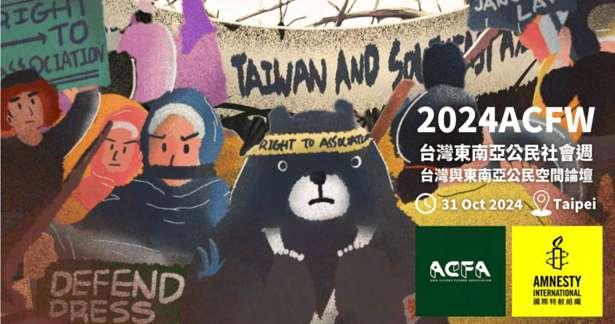
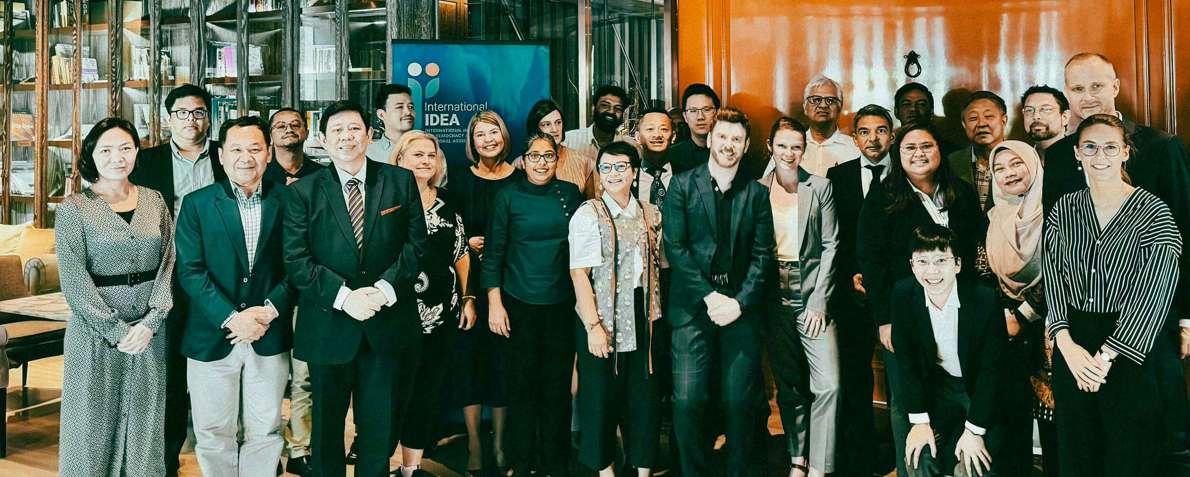
RESISTANCE AND RESILIENCE
In Asia, where institutions can be disregarded — even overhauled — by powerful political personalities, democratic backsliding seems to have become more common than ever. On 12-13 November, CALD Chairperson and Cambodian Senator Mardi Seng participated in a regional workshop convened by the intergovernmental organization International IDEA that hoped to understand the drivers, forms, and potential responses to this unwelcome phenomenon in the region. Held in Bangkok, Thailand, the workshop assembled more than 30 experts on institution-building and democracy. Academics, journalists, and political-party and civil-society members discussed resistance strategies, as well as ways to build the resilience of democratic institutions.
Interestingly, the 2023 International IDEA report “Designing Resistance: Democratic Institutions and the Threat of Backsliding” had already recognized that institutions matter when it comes to whether or not democracy can power through challenges. Noted the report: “Poor
institutional design can make the path easier for backsliders, while strong institutional design can strengthen the resistance of democracy.” At the same time, it acknowledged that there are other factors at play, such as state capacity, engaged citizenry, nature of the media, and broader political culture.
The Bangkok workshop event had four thematic sessions that focused on:
Elections, representation, and parliaments. This session looked into efforts to undermine democratic representative institutions and processes, such as tilting the electoral playing field and weakening the powers of the opposition in the parliament.
Independent institutions. This session considered threats to both the independence of institutions like the judiciary and integrity bodies, as well as to their accountability.
Civil society. This session examined ways in which laws are made and applied to shrink civic spaces and to manipulate the information ecosystem to
limit free and open discussion and criticism of government.
Strategies for resilience. This session drew on examples to identify strategies to strengthen political and constitutional frameworks to address or prevent backsliding.
“The high-level and incisive discussions during the conference demonstrated that the extent of democratic backsliding in the Asian region was much worse than what we know,” Mardi Seng said later. “The root of the problem, it appears, is the concentration of executive power, which, combined with socio-economic inequities, apathetic or disillusioned citizenry, and personality-oriented culture, can have negative repercussions on democratic institutions and processes.”
He added, “The great thing about the conference was it also impressed on us the possible ways forward in terms of addressing backsliding and building resilience. For this reason, we went back hopeful for the possibilities of positive change through institutional reform.”
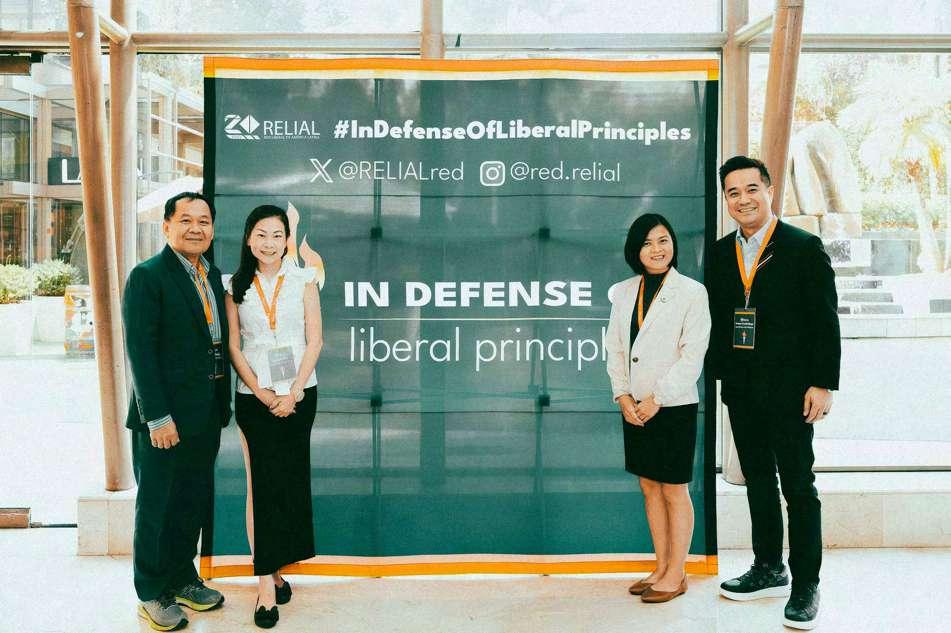
GLOBAL TALKS IN A LATIN SETTING
It took more than 24 hours of travel to get to Santiago de Chile from Asia, but the global political workshop awaiting CALD was worth all the aching bones and muscles of its delegates.
On 26-28 November, Red Liberal de America Latina (RELIAL), with FNF support, held the interactive and innovative workshop “In Defense of Liberal Principles” in the Chilean capital. Around three dozen political party representatives from across the world attended the event, which was held in conjunction with the 64th Congress of Liberal International.
The CALD delegation, led by its Chairperson Mardi Seng from the Candlelight Party (CLP) of Cambodia, included representatives from the Democratic Progressive Party of Taiwan, the Liberal Party of the Philippines, Singapore Democratic Party, and the Civil Will Green Party of Mongolia.
Workshop participants shared their experiences and acquired fresh ideas on how to strengthen liberalism during the three-day workshop. Several interventions were made by CALD. Mardi Seng, for example, was featured in “Global Newscast,” an informative space where the latest political events shaping the course of societies worldwide were
discussed. In this segment, the CALD chairperson took up the current political situation in Cambodia and the rest of Asia.
Wenli Alysa Chiu of the DPP spoke in the session “The Liberal Spot – Liberal Experiences in Government.” In her presentation, Chiu talked about the opportunities and challenges of the DPP as a ruling party amidst the increasing pressure from China. She recounted as well how Taiwan under the DPP leadership has become a model of effective liberal democratic governance.
In the session on “Global Perspectives on Recent American Elections,” Mardi Seng discussed the possible security, political, and economic implications of Donald Trump’s second presidency.
The CALD chairperson warned that Asia would not be the only region facing several issues, problems, and uncertainties under Trump. He pointed out, “We are now witnessing the specter of Trumpism –a unique blend of economic nationalism, nativism, and strongman approach to leadership – and its repercussions would reverberate not only in Asia, but also in other parts of the globe.”
Strengthening democracies amid growing uncertaintyglobal
It was the first event of its kind in Latin America, and CALD was there not just as a very active participant, but also as co-organizer of a side session that addressed a related issue.
On 29 November-1 December, Liberal International had its 64 th Congress with the theme “The Future of Freedom: Uniting Liberals to Re-Empower Democracies” in Santiago, Chile. CALD Chairperson Mardi Seng led the Council’s delegation, which included CALD Secretary General Francis Abaya, CALD Women’s Caucus Chairperson Jaslyn Go, and representatives from member-parties in Taiwan and Mongolia.
LI’s 64 th Congress convened “at a time of significant global uncertainty, where the tenets of liberalism we hold dear face unprecedented challenges,” said then LI President Hakima el Haite. But she stressed that she remained a strong believer of the indomitable spirit of the global liberal family.
“Across continents,” she noted, “courageous individuals continue to fight for their nations, rights, and lives, reminding us of the profound impact our collective efforts can have.”
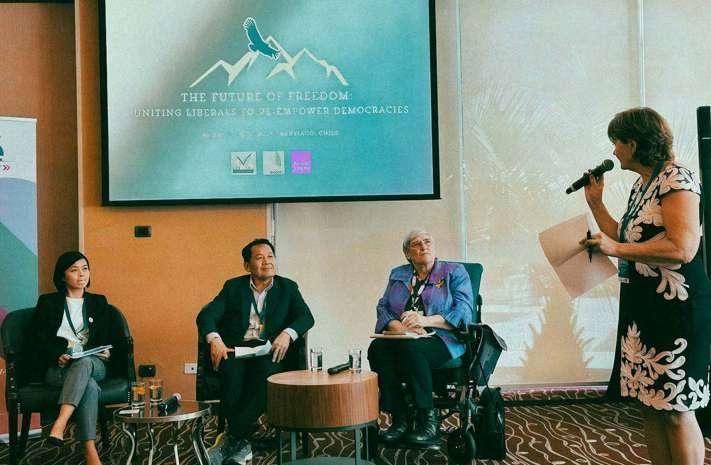
One of the plenary panels in the Congress was on “AI, Liberal Democracies and Governance: Shaping the Future of Elections and Public Trust.” CALD’s Mardi Seng spoke in the panel, where he shared key insights from CALD’s policy paper on AI.
“As a network of liberal and democratic political parties, we acknowledged that AI can be a double-edged sword,” he said. “On the one hand, it can be used to propagate disinformation during the campaign, especially through the use of deep fakes. On the other hand, there is also

immense potential for AI to enhance electoral transparency, voter engagement and campaign efficiency.”
Representatives from the Democratic Progressive Party of Taiwan took part in multiple panels. Legislator Fan Yun, for instance, spoke in the panel, “Democracies Under Pressure: Confronting the Axis of Autocrats.” DPP Deputy Director for International Affairs Wenli Alysa Chiu also had at presentation at a roundtable discussion on transnational repression.
The 64 th LI Congress also inaugurated a new LI Bureau. The highlight of the Congress for CALD, however, was its joint side event with the Alliance of Liberals and Democrats for Europe (ALDE) Party. With the theme “U.S. Foreign Policy under Trump 2.0: Implications for Asia and Europe,” the session’s objectives were twofold: to analyze the possible shape of U.S. foreign policy in the incoming Trump presidency and its implications for regional security and the global liberal order; and to share experiences and strategies on how to protect and reinforce the global liberal order against authoritarian intrusions.
“Trump’s second term would be characterized by heightened superpower competition with China, decline of multilateralism and a less open global economy”, argued CALD Chairperson Mardi Seng. “Trump has made our work more difficult, but we must remember that the liberal and democratic values which made the world more secure and more prosperous in the past decades are much stronger and enduring than a thousand Trumps.”
The session, moderated by ALDE Party Vice President Eva Kjer Hansen, also had as speakers Ukrainian Member of Parliament Vadym Halaichuk, Baroness Sal Brinton of the U.K. Liberal Democrats, and Chiu from DPP Taiwan. Sir Graham Watson, who played a very significant role in the initial convening of the ALDE-CALD Meeting in 2002, delivered the session’s closing keynote address.

MAKING POLITICAL COMMUNICATION COUNT
Veteran political communicator Nick Clelland put it succinctly: “In politics, you have to be on message, in volume, over time.”
This actually became the guiding principle for the International Academy for Leadership (IAF)seminar “Political Communication: How to Shape Narratives and Amplify Impact” held 8-15 December in Gummersbach, Germany. Clelland was among the facilitators at the seminar, which brought together participants from over 20 countries, including CALD Communications Officer Julienne Janolo-Faustino.
The seminar offered a platform for political communicators and leaders to exchange ideas and enhance their skills in political and strategic communication. Participants engaged with modern, dialogue-oriented methods, emphasizing practical applications in communication and media within a political context.
IAF Facilitator Wulf Pabst opened the seminar with the topic “Strategy and Strategic Thinking.” He emphasized the importance of integrating strategy with communication, explaining that strategic thinkers must connect the past, present, and future to bridge the gap between today’s reality and future aspirations. According to Pabst, it is also intelligently opportunistic. He said, “The dilemma involved in using a well-articulated strategy to channel organizational efforts effectively and efficiently must always be balanced against the risks of losing sight of alternative strategies better suited to a changing environment.”
The seminar also invited external experts who provided diverse perspectives on political communication. Jan-Maik Schlifter, a campaign expert and trainer from FNF, shared insights into Germany’s political landscape, focusing on the campaign strategies of the Free Democratic Party (FDP). His session covered campaign trends, issue framing, and preparations for upcoming elections. Content creator and short-form video expert Medeni Sungur discussed the evolution of online communications—from blog posts to short-form videos. He
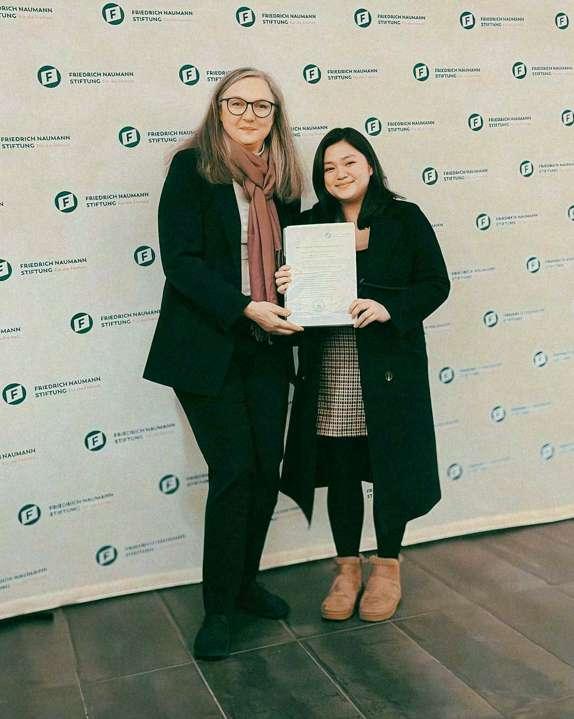
guided participants in a session “Thinking like an Influencer,” where the participants created their own TikTok-style videos.
The seminar’s practical approach included group activities such as designing political communication models, developing brand strategies, and launching mock campaigns. In addition, participants experienced a simulated press interview with a journalist that tested their media readiness under pressure.
Clelland’s session on brand strategy emphasized the emotional aspect of branding. He described brand strategy as the “feeling” that you or your organization would like to convey to the people. Formulating a brand strategy, he said, involves understanding the organization’s ambitions, core values, benefits,
promises, and universal human archetypes. Clelland urged participants to “tell it fast, tell it yourself, tell it all,” emphasizing the importance of timely and transparent communication.
Another key discussion was the challenges of accessing traditional media in the digital era, especially when one is in the opposition. Although many people believe that social media is the key to winning campaigns, the facilitators challenged this notion, asserting that traditional media still plays a crucial role. Clelland and Pabst stressed the ongoing relevance of traditional media and advised participants to focus on producing high quality, relevant content. “Don’t skip it. Manage it professionally,” they urged, encouraging attendees to integrate both traditional
and alternative media into their communication strategies.
“These practical training in media skills, branding and political communication are crucial for advancing CALD’s mission of promoting democracy and freedom across Asia,” said CALD’s Janolo-Faustino. “Attending this seminar has empowered me to develop more impactful strategies, ultimately helping our member parties in their efforts to regain democracy.”
She also expressed her heartfelt gratitude to CALD, FNF, and IAF, saying, “After six years with CALD, I’m more inspired than ever to contribute more to our organization through the lessons and skills I have learned in the seminar. Thank you for investing in me and believing in our shared mission.”
MEMBER PARTY HIGHLIGHTS
CAMBODIA NATIONAL RESCUE PARTY
Steadfast and Pushing Forward
The mass convictions of leaders and local members of the Cambodia National Rescue Party throughout 2022 drew global attention to the shrinking democratic space in Cambodia. Over 40 local members received five-to-seven-year sentences; eight top leaders faced lifetime imprisonment; and further key figures were handed terms up to 40 years. United Nations human rights experts labeled these proceedings “political trials peppered with judicial flaws.” Concerns included in absentia hearings, denial of full access to case files, and a lack of concrete evidence. The UN Human Rights Council urged the Cambodian government to review these judgments and reverse its alarming crackdown on civic freedoms.
Two years later, little had changed. In fact, on 26 November 2024, the European Parliament’s resolution on Cambodia’s political crisis emphasized the country’s continued backsliding on human rights. It called for targeted sanctions against officials responsible for dismantling political opposition, and raised the possibility of a full suspension of Cambodia’s ‘Everything But Arms (EBA)’ trade benefits if no meaningful steps toward free and fair elections were taken. CNRP leaders, including those in exile, meanwhile maintained robust advocacy—securing support from members of the European Parliament and urging the EU and other international partners to act decisively.
The CNRP remains steadfast despite the repressive conditions. While CNRP President Kem Sokha continues to face unsubstantiated charges in Cambodia, party leaders abroad have heightened efforts to mobilize the Cambodian diaspora. CNRP North America (Canada and the United States) convened a

strategic summit in Massachusetts in September 2022, bringing together over 50 leaders to outline the party’s future direction. In parallel, they have urged members of the U.S. Congress to sanction individuals who undermine Cambodian democracy, violate human rights, or engage in corruption.
KEY STRATEGIC INITIATIVES MOVING FORWARD:
Coordinated Mass Mobilization: Despite transnational repression by the Cambodian regime, the CNRP will continue peaceful protests and public awareness campaigns, both domestically and among diaspora communities. These efforts aim to underscore the unjust trials and galvanize citizens who demand free elections.
Digital Activism & Secure Communication: In response to increasing Internet surveillance and restrictions, the party will invest in secure online platforms. This will ensure that local supporters can safely exchange information, document abuses, and mobilize grassroots advocacy.
Exile Leadership & Policy Readiness: The CNRP’s leadership, operating overseas, is refining a governance
roadmap that covers electoral reforms, justice for political prisoners, and measures to restore genuine multiparty democracy through the Khmer Movement for Democracy Congress. This blueprint will be presented to international stakeholders and the Cambodian public alike.
Targeted International Advocacy:
The party will continue pressing for sanctions against key figures within the ruling structure while calling for further scrutiny of Cambodia’s EBA status. Building on momentum from the European Parliament’s resolution, CNRP leaders are working to ensure that financial assistance and trade benefits are predicated on respect for human rights. With Marco Rubio’s recent appointment as Secretary of State, we will also push for S.2331: Cambodia Democracy and Human Rights Act of 2023 to be passed because Rubio is the main sponsor of our bill.
Alliances & Capacity-Building: The CNRP is bolstering alliances with other pro-democracy advocates by creating the United National Committee of Cambodia, including Cambodian diaspora groups from different regions that also experiencing authoritarian pressures from the Cambodian government. This UNCC collaboration focuses on sharing resources, amplifying each other’s causes, and preparing the next generation of civic leaders.
Through these initiatives, the CNRP is forging a renewed path toward restoring democracy in Cambodia. Despite ongoing trials and a restrictive political climate, the party’s collective strategy—grounded in nonviolent resistance, global partnerships, and a clear plan for inclusive governance—aims to safeguard the fundamental freedoms and rights of all Cambodians.
DEMOCRATIC PROGRESSIVE PARTY
Toward a Stronger, More Resilient Democracy
Amidst geopolitical sea change in 2024, Taiwan has remained a beacon of democratic resilience on the global stage. Taiwan’s recommitment to the path of democracy during the 2024 elections, held under the shadow of Chinese intimidation, further solidifies its role as a frontline stronghold for global democracy. Despite coercion and misinformation campaigns from China, the Taiwanese people have demonstrated their unwavering determination to safeguard their sovereignty and freedom in the face of mounting challenges.
China has escalated its military intimidation against Taiwan through large-scale military exercises following President Lai Ching-te’s May 20th inauguration and Taiwan’s National Day celebrations on October 10th. These displays of belligerence expose China’s overt hostility toward Taiwan and its ongoing efforts to coerce the Taiwanese people into submission. Nonetheless, Taiwan remains a responsible actor in the Taiwan Strait and the broader Indo-Pacific region, and is steadfast in its commitment to maintaining peace and stability despite these provocations.
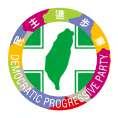
Under the leadership of President Lai Ching-te, who guided the DPP to an unprecedented third consecutive term in 2024, we are committed to building an inclusive and resilient society. By addressing pressing societal issues and strengthening our partnerships with like-minded nations, Taiwan continues to demonstrate that adversity can be overcome through solidarity and shared purpose.
Underpinning this progress is the DPP’s dedication to Wholeof-Society Defense Resilience, which integrates government, civil society, and international allies to address threats ranging from security risks to natural disasters. These efforts reflect our commitment to enhancing Taiwan’s resilience and ensuring that democratic values and civil liberties thrive for generations to come.
The DPP continues to build on its three core values—democracy, peace, and prosperity—to foster a stronger, more united Taiwan. The party is focused on addressing social issues, particularly those affecting youth, gender equality, and marginalized communities. By engaging with civic groups and seeking input from diverse perspectives, the policies implemented will reflect the aspirations of all Taiwanese people. Taiwan has also solidified its reputation as a leader in innovation and sustainability. In 2025, the DPP will strengthen supply chain resilience, accelerate the transition to green energy, and advance Taiwan’s 2050 NetZero plan. These advancements ensure Taiwan’s continued contribution to regional stability and global prosperity.
Taiwan’s achievements in 2024 are a testament to the strength of its democracy and the enduring resolve of its people. As we look ahead to 2025, the DPP will guide Taiwan toward a future defined by peace, prosperity, and a steadfast commitment to democratic values. Through multilateral engagement and inclusive governance, we call on our global partners to stand with us as we forge a path toward a world where democracy and human rights prevail.
LIBERAL PARTY OF THE PHILIPPINES
Rebuilding and Strengthening
Despite setbacks in the 2022 elections, the Liberal Party of the Philippines remains committed to advocating for liberal democracy, social justice, and governance reforms. While its president, Edcel Lagman, passed away in January 2025, the party is still on course toward rebuilding its political influence under the leadership of lawyer and former legislator Lorenzo ‘Erin’ Tañada III, who now serves as acting LP president.
To strengthen its grassroots presence, LP launched Mamamayang Liberal (ML) in 2024, aiming for representation in the 2025 House elections through the party-list system. ML represents the workers, farmers, fisherfolk, indigenous peoples, urban poor, women, youth, professionals, and the LGBTQ, and seeks to be their strong, vocal advocate in Congress.
Former Senator Leila de Lima, ML’s first nominee, has become the face of the impeachment movement against Vice President Sara Duterte, reinforcing her role as a key opposition figure. Former legislator Teddy Baguilat is ML’s second nominee and Tañada its third, further solidifying LP’s presence in the upcoming elections. Former Senator Francois ‘Kiko’ Pangilinan has also declared his senatorial candidacy for 2025, signaling LP’s renewed electoral push.
Looking ahead, LP remains committed to engaging communities, pushing progressive policies, and addressing key national issues. As the 2025 polls approach, the party seeks to reclaim its influence by mobilizing supporters and reinforcing its role in Philippine politics.
SINGAPORE DEMOCRATIC PARTY
Toward more decades of commitment
In 2024, the Singapore Democratic Party celebrated its 44th anniversary with a grand gala dinner at the prestigious Raffles Town Club. The event brought together party members, volunteers, supporters, local civil-society organizations, opposition politicians, and international partners, including delegates and friends from CALD — all united in a shared vision for Singapore’s future.
The evening was a true celebration, featuring a warm reception, live performances, and a cake-cutting ceremony led by SDP’s Central Executive Committee members. Inspiring speeches by Dr. Chee Soon Juan and Prof. Paul Tambyah highlighted the party’s milestones and aspirations for the future.
“We extend our heartfelt gratitude to everyone who attended the event and to those who have supported us unwaveringly over the years,” Dr. Chee said. “Your steadfast commitment and tireless efforts are invaluable as we continue to
champion the cause we all believe in. Together, we move forward with hope, determination, and the collective will to make a difference.”
The party also honored pioneer members with long-service awards, recognizing their invaluable contributions and dedication. The presence of international delegates underscored the strong partnerships and shared ideals that connect SDP to global and regional allies.
As the SDP geared up for the General Election, this anniversary celebration stood as a testament to the party’s resilience, unity, and unwavering commitment to building a better Singapore.
SPEAKERS & SESSION CHAIRS
CALD – LI
ELECTION
OBSERVATION MISSION TO TAIWAN
Andrea Yang Deputy SecretaryGeneral, Democratic Progressive Party
Alysa Chiu Deputy Director, Department of International Affairs Democratic Progressive Party
Bi-khim Hsiao Vice Presidential Candidate
Freddy Lim Member, Legislative Yuan of Taiwan
Joseph Wu Foreign Minister of Taiwan
Josephine Wu Board Member, Asia Pacific Liberal Women Association
Judy Peng Communications Officer, FNF Global Innovation Hub
Lin Fei-fan Director of the Board, Taiwan Foundation for Democracy
Lo Chih-cheng Member, Legislative Yuan of Taiwan
Mark Ho Member, Legislative Yuan of Taiwan
Maysing Yang Founder, Asia Pacific Liberal Women Association
Michael Kau Senior Fellow, Taiwan Foundation for Democracy
Puma Shen Nominee for Legislator-at-Large, Democratic Progressive Party
Tsai Ing-wen President of Taiwan
Vincent Chao Director, Department of International Affairs Democratic Progressive Party
William Lai Presidential Candidate
Ya-Wei Chou Program Manager, FNF Global Innovation Hub
You Si-kun Legislative Yuan President
CALD INDONESIA
ELECTION
OBSERVATION MISSION & CALD 49TH EXECUTIVE COMMITTEE MEETING
Hasto Kristiyanto Secretary General, Indonesian Democratic Party of Struggle
Khoirunnisa Nur Agustyati Executive Director, Association for Elections and Democracy (Perludem)
Mardi Seng Chairperson, CALD
Moritz KleineBrockhoff Regional Director, Southeast and East Asia Office
Friedrich Naumann Foundation for Freedom
Titi Anggraini Advisory Board Member, Association for Elections and Democracy (Perludem)

CALD LOCAL
GOVERNMENT WORKSHOP ON SMART MOBILITY
Andrew Arristianto Chief Strategy Officer/ Director Cititrans, Bluebird Group Indonesia
Bartolome “Omie” Rivera, Jr. Mayor of San Mateo, Rizal Republic of the Philippines Liberal Party of the Philippines
Dennis Hora Councilor, Municipality of Panglao Provincial Government of Bohol, Philippines Liberal Party of the Philippines
Francis “Blue” Abaya Secretary General, CALD
Karlo Abadines Officer, AltMobilityPH
Kusuma Refa Haratama D4 Transportation Engineering, State University of Surabaya
Luisito Obtinario Traffic Operations Officer, Department of Public Order & Safety San Mateo, Rizal, Philippines
Luke Tsai
Associate Researcher, Democratic Progressive Party of Taiwan
Mochamad Nur Arifin Mayor of Trenggalek, Indonesia
Indonesian Democratic Party of Struggle
Paolo Zamora Program Manager, CALD
Pleethum Triyakasem Technical Manager, Strategic Technology and Innovation Center Democrat Party of Thailand
Stefan Diederich Representative, Southeast and East Asia Office
Friedrich Naumann Foundation for Freedom

CALD EXECUTIVE MISSION TO JAPAN
Alongkorn Ponlaboot Former Member, Thailand House of Representatives Democrat Party of Thailand
Celito Arlegue Executive Director, CALD
Dominic Lau Senator, Malaysia Parti Gerakan Rakyat Malaysia
Francis “Blue” Abaya Secretary General, CALD
SPEAKERS & SESSION CHAIRS
Frederic Spohr
Project Director, Korea Office
Friedrich Naumann Foundation for Freedom
Jaslyn Go Chairperson, CALD Women’s Caucus
Singapore Democratic Party
Kuo Ruei
Associate Researcher, Department of International Affairs Democratic Progressive Party of Taiwan
Mardi Seng Senator, Kingdom of Cambodia Chairperson, CALD
Putra Nababan Member of Parliament, Indonesia
Indonesian Democratic Party of Struggle
CALD
TRANSFORMATIVE ACADEMY FOR DEVELOPING EMPOWERED LEADERSHIP
Alexandra Charnock Advisor, Corporate and Public Affairs
Apollo Strategic Communications
Braema Mathi Former Member of Parliament, Singapore Founding Member, MARUAH
Calvin Nixon Member, International Committee for Asia Junge Liberal
Celito Arlegue Executive Director, CALD
Chee Soon Juan Secretary General, Singapore Democratic Party
Cherian George Vice Professor, Media Studies
Hong Kong Baptist University
Elvin Ong Assistant Professor, Political Science National University of Singapore
Emil Kirjas Founder, Kirjas Global Former Secretary General, Liberal International
Esti Marina Publicity Director, CALD Youth
Hakima El Haité President, Liberal International
James Gomez Regional Director, Asia Centre
Jaslyn Go Chairperson, CALD Women’s Caucus
Singapore Democratic Party
Jeremiah Tomas Chairperson, CALD Youth
Jobelle Domingo Secretary General, CALD Youth
Kai Pischke Vice President, International Federation of Liberal Youth
Kimhun Thit Chairwoman, Women’s Affairs
Cambodia National Rescue Party America/Overseas
Leila De Lima Spokesperson, Liberal Party of the Philippines Former Senator, Republic of the Philippines
Mardi Seng Chairperson, CALD
Maria Leonor “Leni” Robredo 14th Vice President, Republic of the Philippines
Martine van Schoor International Officer, D66 Netherlands
Mats-Ole Maretzke International Officer, Junge Liberal
Paul Anantharajah Tambyah Chairman, Singapore Democratic Party
Rachel Palma Randle CEO, Scottish Liberal Democrats
Samady Ou Vice Chairperson, CALD Youth
Thekla Ebbert Regional Program Manager, Southeast and East Asia Office
Friedrich Naumann Foundation for Freedom
Viviana Giacaman
Senior Manager, World Movement for Democracy
Wolfgang Sachsenroeder
Managing Editor, Political Party Forum Southeast Asia
CALD SMART MOBILITY CONFERENCE
Bartolome “Omie” Rivera, Jr.
Mayor of San Mateo, Rizal Republic of the Philippines
Liberal Party of the Philippines (LP)
Chalermpon Punnotok Founder / Chief Executive Officer, CT Asia Robotics
Chien-Pang Liu
Deputy Director, Transportation Bureau
Kaohsiung City Government
Dech-it Khaothong Deputy Minister, Public Health Secretary General, Democrat Party of Thailand
Dennis Hora Councilor, Municipality of Panglao Provincial Government of Bohol, Philippines Liberal Party of the Philippines
Francis “Blue” Abaya Secretary General, CALD
Gonggomtua
Sitanggang
Southeast Asia Director, Institute for Transportation and Development (ITDP)
Harya Dillon Transport Specialist, Indonesia
Ira Cruz Director, AltMobility PH
Jeeyoung Bae Research Fellow, The Institute for Democracy Democratic Party of Korea
Karlo Abadines Officer, AltMobility PH
Kusuma Refa Haratama D4 Transportation Engineering, State University of Surabaya
Mardi Seng Senator, Kingdom of Cambodia Chairperson, CALD
Mishari Ahmed Muqbil Committee Member and Secretary, Bangkok Urban Cycling Alliance
Mochamad Nur Arifin Mayor of Trenggalek, Indonesia Indonesian Democratic Party of Struggle
Paolo Zamora Program Manager, CALD
Pimrapaat Dusadeeisariyakul Program Manager, Thailand Office
Friedrich Naumann Foundation for Freedom
Pleethum Triyakasem Technical Manager, Strategic Technology and Innovation Center Democrat Party of Thailand
Romtham Khamnurak Member of Parliament, Kingdom of Thailand Democrat Party of Thailand
S.K. Jason Chang Professor, Transportation Engineering National Taiwan University
Silpa Wairatpanij Committee Member, Thailand Walking and Cycling Institute Foundation
Sirisak Laochankham Dean, College of Local Administration Khon Kaen University
Suchatvee Suwansawat Deputy Leader, Democrat Party of Thailand Former President, King Mongkut’s Institute of Technology
Supakorn Sirisoontorn Chief Financial Officer, Bussing Transit & Khon Kaen City Bus
Suradech
Taweesaengsakulthai Deputy DeanManagement, Khon Kaen University Co-Founder and Chairman, Khon Kaen City Development
Teerasak
Teekayuphan Mayor, Khon Kaen Municipality
Thekla Ebbert
Regional Program Manager, Southeast and East Asia Office
Friedrich Naumann Foundation for Freedom
Yossawat
Kaewsuebtunyanij Superintendent, Mueang Khon Kaen Provincial Police Station

CALD AI REPORT LAUNCH
Almut Besold Country Head, Philippine Office Friedrich Naumann Foundation for Freedom
Alvin Carpio Founding Director, School of Social Justice
Celito Arlegue Executive Director, CALD
Cleve Arguelles CEO, WR Numero Research, Inc.
Francis “Blue” Abaya Secretary General, CALD
Julio Teehankee Professor, De La Salle University Manila
Mardi Seng Chairperson, CALD
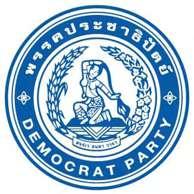
ContaCt
67 Setsiri Road, Samsannai Phayathai, Bangkok 10400, Thailand
T +66 2 0 2270 0036
F +66 2 0 2279 6086
public@democrat.or.th
www.democrat.or.th
The Democrat Party
The Democrat Party, founded in 1946, is the longest-standing political party in Thailand, and is one of the longest-standing in Southeast Asia as well. Since its inception over 70 years ago, the Democrat Party has held ideologies that oppose all forms of dictatorship, and is committed to the promotion of democracy for the people, and most importantly, by the people.
The survival and existence of the DP has not come easily. The party had to go through political struggles throughout its history that has five periods:
1st Period (1946-1967) Party Building, Pro-Democracy and Anti-Dictatorship
2nd Period (1968-1979) Party Rehabilitation and Democracy Promotion
3rd Period (1979-1990) Policy Improvement and Participation in National Administration
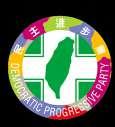
ContaCt
Michael Chen Acting Director
10F, No.30 Beiping E.Rd., Taipei, Taiwan
T +866 2 23929989
F +866 2 23930342 www.dpp.org.tw
F dpptaiwan

4th Period (1991-2000) Leading Party of Opposition and Coalition Government
5th Period (2001-Present) Combating Parliamentary Dictatorship and opposing the abuse of power and conflicts of interest in public sector
Introducing the People’s Agenda
Throughout its history, the DP has always stood firm on the principles of democracy, freedom, transparency, accountability, and public participation. These principles are stipulated in the Party Guidelines, which have helped steer the party through both highs and lows in the last seven decades, and will continue to act as its compass for many years and generations to come.
Under the leadership and guidelines of the Executive Committee, DP aims to provide the Thai public with a viable responsible political alternative to the populist political environment that has
Democratic Progressive Party
The Democratic Progressive Party of Taiwan was founded on September 28, 1986, by political, social and human rights activists, along with defense lawyers of political prisoners. The DPP was founded by political dissidents during Taiwan’s martial law era, when the nation was ruled by the authoritarian regime of the Chinese Nationalist Party (KMT), which established a one-party state in Taiwan after losing to the Chinese Communist Party in the Chinese civil war.
Through social and political movements as well as participation in local elections as independents, the founders of the DPP risked their freedom and lives to champion a democratic Taiwan. Throughout the process of Taiwan’s political transition, the DPP and its precursors played a pivotal role in consolidating Taiwan’s democracy.
In 2000, the DPP captured the presidency. From 2000 to 2008, DPP continued to push for freedom of expression, gender equality, social and transitional justice, judicial impartiality, and democracy. The DPP also gained valuable experience and lessons as a young party during its eight years of governance.
Although back in opposition from 2008 to 2016, in 2014 the DPP won Taiwan’s local elections by a landslide. DPP took 13 out of the 22 cities and counties, including
4 out of 6 special municipalities. The election was the DPP’s best poll showing since its founding.
In 2016, the DPP’s Chairperson, Dr. Tsai Ing-wen, became Taiwan’s first female president. Dr. Tsai and her running mate Dr. Chen Chien-jen garnered 6.89 million votes or 56.1 percent of the total in the presidential election.
In 2017, the DPP pushed through many reforms and progressive laws, including pension reforms, a forward-looking infrastructure plan, transitional justice acts, and other important policies geared toward a better Taiwan. The DPP has also long promoted legislation to protect the rights of the LGBTQ community. In 2019, a ruling by Taiwan’s constitutional court made Taiwan the first country in Asia to legalize same-sex marriage.
In 2020, President Tsai Ing-wen was reelected as the President, and Lai Ching-te was elected as the Vice President. The electoral result, where a record high of 8.17 million or 57.13% of the electorate voted for President Tsai and Vice President Lai, was a historic victory for the DPP. President Tsai Ing-wen resigned as chairperson in 2022 and Vice President Lai Ching-te was elected as chairperson in January 2023.
been permeating the Thai atmosphere since 2001. Through various schemes and measures implemented since 2008, especially the People’s Agenda, the Party has been able to steer national development toward a new direction. It uses the idea of “policy for the people and by the people,” which highlights the point that “people must come first.”
The Party has assured the inclusiveness of its socio-economic policy and measures. Programs such as 15 years of free education, incomeguarantee initiative for farming population, debt relief and access to micro-credits, and social and health security schemes had been launched when the Party was in government.
LEADERS
Chalermchai Sri-on Party Leader
Det-it Khaothong Secretary General
In 2024, Vice President Lai Ching-te was elected as the President, and Ambassador Bi-khim Hsiao was elected as the Vice President. This marks the first time in Taiwan that the president-elect and the president are from the same party after two terms in office.
The DPP will continue to defend democracy against the onslaught of rising global authoritarianism. We will seek out connections with like-minded partners who share our commitment to furthering civil liberties and values-based diplomacy. Taiwan will seek to be an upholder of regional peace and security. On social issues, we also hope to create a society that encourages the participation of youth in civic affairs. The DPP will also build on its legacy of ensuring social equality by empowering women and protecting the rights of LGBTQ members of society
DPP is a founding member of CALD and a member of Liberal International.
LEADERS
Lai Ching-te
Chairperson
Lin Yu-chang
Secretary-General
Jason Gonzales Director General
Liberal Party of the Philippines Lower Ground Floor, AGS Building, EDSA, Guadalupe Nuevo, Southbound, Makati City, Philippines
www.liberal.ph F LiberalPartyPhilippines

Andy Tan
Parti Gerakan Rakyat Malaysia
Level 5, PGRM, No. 8 Jalan Pudu Ulu, Cheras, 56100, Kuala Lumpur, Malaysia
T +60 3 9287 6868
F +60 3 9287 8866
www.gerakan.org.my
F partigerakan
T partigerakanrakyatmalaysia
Liberal Party
The Liberal Party of the Philippines is a founding member of CALD. It is a full member of Liberal International. The LP has championed freedom, justice, and the dignity and rights of the individual for 75 years. At great cost to its stalwarts and members, it stood among the few voices of dissent during the dark days of the Marcos dictatorship, and at every turn in the country’s recent history when democracy came under threat.
To this day, the LP upholds its legacy as the only major political party standing its ground against an increasingly authoritarian, populist regime. Its leaders and members have consistently adhered to the Party’s thrusts:
• Protecting human rights, as it did in challenging the return of the death penalty and lowering the minimum age of criminal responsibility, and in calling for an end to murder, violence, and lawfare as the primary instrument of the government’s anti-drug and anti-terrorism campaigns;
• Advocating for the welfare of workers and consumers; pushing back against anti-consumer, anti-poor economic policies, and burdensome tax laws; and demanding a more strategic, more transparent, and more humane whole-of-nation approach to the COVID-19 pandemic;
• Defending democracy, press freedom, and the rule of law against attempts to undermine democratic institutions to consolidate power.
The LP forges onward by harnessing the energy of a massive volunteer base that was at the heart of its unconventional election campaigns in 2019 and 2022. It builds on the promise of becoming a true people’s party through opening memberships to the general, liberal democratic public and key sectors of society; organizing and mobilizing citizens in the grassroots; and declaring a policy direction geared towards inclusiveness, dignity, and empowerment.
Parti Gerakan Rakyat Malaysia
Parti Gerakan Rakyat Malaysia (PGRM) was founded on 24 March 1968 as an independent party. It won the general election the following year and ruled the Penang State for the next 40 years (1969 - 2008).
After successfully forming a state government in 1969 general elections, Gerakan was invited by Tun Abdul Razak, the second prime minister of Malaysia, to join the national ruling coalition, the Alliance Party, which formed the federal government.
In 1972, Gerakan joined the Alliance and inspired the formation of Barisan Nasional. On 23 June 2018, Gerakan left Barisan Nasional and became an independent political party.
On 11 February 2021, Gerakan was officially accepted as a component party to the new political coalition, Parti Perikatan Nasional.
Gerakan has been committed to the pursuit of a non-ethnic approach as the basis of its political struggle, be it in politics, economics, education, and culture.
Since its founding in 1968, Party Gerakan has never relented, and will never relent, in the party struggle for a truly Malaysian nonracial approach toward the attainment of a united, secular, and socially just Malaysia, though the forms and modes of struggle can vary according to changing circumstances.
This was the line of the party’s founding fathers. It remains the party’s line today. It will be the party’s line tomorrow. This consistency and steadfastness in the party’s commitment to the non-ethnic approach are premised on the belief that there is a large section of the society who are not ethnic Malay, but whose political consciousness is Malaysian, and want political representation as Malaysians.
LEADERS
Erin Tanada Acting President
Francis “Kiko” Pangilinan Chairperson
Christopher Belmonte Vice Chairperson
Jason Gonzales Director General
Teddy Baguilat Secretary-General
Alfonso Umali Treasurer
LEADERS
Dominic Lau National President
Oh Tong Keong Deputy President
Wong Chia Zhen Secretary General
ContaCt
ContaCt
Jufri Salim
International Liaison to CALD, and Organising Secretary
Singapore Democratic Party 3 Ang Mo Kio Street 62, #02-30, Link@AMK, Singapore, SIngapore
sdp@yoursdp.org www.yoursdp.org
FIYT yoursdp


ContaCt
Kimhun Thit / Ry Kea International Liaison to CALD
Cambodia National Rescue Party 111 Fitchburg Rd, Ayer MA 01432, United States
E kimhunthit@gmail.com rykea2015@hotmail.com F CNRP America
Singapore Democratic Party
The Singapore Democratic Party (SDP) was constituted in 1980. It believes in and is working toward restoring human, civil, and political rights in Singapore; cultivating a transparent and accountable political system based on free competition and equal opportunity for all; removing all policies and practices that discriminate against the less fortunate, women, and minorities, and cooperating with democratic parties and organizations in Asia to achieve peace and sustainable development in the region.
The SDP is widely recognized as the party in Singapore that is most adept in using the Internet to communicate with the public outside of the constraints of the state-controlled media in the city state. It uses blogging, political videos, and social media to reach out to the people. It was the first opposition party in Singapore to have a youth wing (Young Democrats).
The party has released 10 policy papers in the last several years on various topics, including Education, Healthcare, Housing, and Climate Change. The SDP was also the first political party in Singapore to produce a paper on the issues faced by the minority Malay community with community-driven solutions.
The Central Executive Committee (CEC) leads the party with Prof. Paul Tambyah as Chairman and Dr. Chee Soon Juan as its secretary general. A third of the party leadership are between the age of 30 and 40 years old. Party leaders and members have had to endure a series of court cases, and even imprisonment, for exercising their fundamental rights to freedom of expression and assembly in the recent past.
In the past two general elections, the SDP was seen to be the most “improved” opposition party, in terms of making the largest gain in the share of votes among opposition parties. In GE 2020, both Chairman Paul Tambyah and Secretary General Chee Soon Juan garnered more than 45 percent of the votes in their respective constituencies, placing them very close to electoral success. This was in spite of a very skewed campaign that had no campaign rallies, limited voter engagement allowed, and widespread use of the new draconian POFMA law, which allows ministers wide latitude in characterizing statements as “falsehoods.”
LEADERS
Paul Tambyah Chairman
Chee Soon Juan Secretary General
Cambodia National Rescue Party
The Cambodian National Rescue Party (CNRP) is an electoral alliance between two main democratic opposition parties in Cambodia: the Sam Rainsy Party and the Human Rights Party. CNRP was founded in mid-2012 to run together in the 2013 elections.
The party principles and values are the rule of law and democracy, with social merit and harmonization, as well as mutual respect of interest. The party believes in strengthening freedom and human rights, the institution of free and fair elections, and “rescue, serve, protect.”
After the 2013 elections, it became the second-largest party in Cambodia, accounting for 55 seats out of the 123 seats in parliament.
In the June 2017 commune elections, CNRP received 43.83 percent of the votes cast versus 50.76 percent of the ruling Cambodian People’s Party.
As CNRP’s electoral momentum threatened the ruling party ahead of the 2018 parliamentary elections, court cases, widely perceived as politically motivated, were filed against its leaders, resulting in the continuing exile of Sam Rainsy and the imprisonment of Kem Sokha.
In November 2017, the CNRP was dissolved by Cambodia’s high court with its 118 leaders banned from politics for 5 years. Despite this major setback, these former CNRP leaders still exert all their efforts, particularly by appealing to the international community, to bring Cambodia back to the democratic path.
LEADERS
Sam Rainsy Acting President
Kem Sokha President
ContaCt
ContaCt
Hanjaya Setiawan
Director of Foreign Affairs
International Liaison to CALD
PDI Perjuangan
Jl. P. Diponegoro No. 58, Menteng, Jakarta Pusat 10310, Indonesia
T +62 21 3909925
T +62 21 3900715 hanjaya@pdiperjuangan.id www.pdiperjuangan.id
F DPP.PDI.Perjuangan
T pdi_perjuangan

Indonesian Democratic Party of Struggle
The Indonesian Democratic Party of Struggle (PDI Perjuangan) came into existence as a result of the people’s struggle against the efforts of the New Order regime to hold onto power. The year 1999 was a milestone for the party, which emerged as the winner of the general election and thus put an end to Soeharto’s regime. The sudden victory initiated a long and hard work of consolidation in the organization, from national level down to the community level.
The party’s ideology is based on Pancasila (Five Principles) that was first articulated by Indonesian nationalist leader Soekarno in a speech he gave on 1 June 1945. It is derived from the old indigenous Indonesian philosophy and way of life. Pancasila reflects Indonesian nationalism, humanity and internationalism, democracy, social justice, and belief in one God.
Our founding father, Ir. Soekarno, once said, “Indonesian nationalism is a nationalism that grows and flourishes in the garden of internationalism.” It is impossible to separate nationalism and internationalism; one needs the other. PDI Perjuangan thus understands the importance of international relations. We will continue to develop and strengthen mutually beneficial cooperation among countries.
As the vanguard force that raises Pancasila’s banners high, PDI Perjuangan faces constant challenges on becoming the uniting power of Indonesia. PDI Perjuangan is always at the forefront in supporting social diversity, pluralism, and human rights in Indonesia. We believe that equality among citizens is the basic foundation of unity in diversity.
In the current Indonesian democracy, PDI Perjuangan plays its role to ensure people and state sovereignty by strengthening democratic institutions, mechanisms, and political practices. PDI Perjuangan also aims for a self-sufficient economy in the globalized era to bring prosperity and social welfare to the people. A nationalist party, PDI Perjuangan maintains a political stance of pluralism, humanity, democracy, and social welfare.
After 10 years as the ruling party, PDI Perjuangan experienced a bitter setback in the 2024 presidential election. The party’s candidate lost to his main opponent, who secured 58 percent of the total votes in one round. The latter achieved this by gaining support from the then incumbent president who had his son run as vice presidential candidate. Under the Constitution, the son was not qualified for the post because he did not meet the required minimum age for it. But to accommodate the then president’s wishes, Indonesia’s charter was undermined, with the Constitutional Court, then led by the president’s brother-in-law, changing the law.
This outcome marked a notable shift in Indonesia’s political landscape. PDI Perjuangan, however, remains one of the most influential political forces in Indonesia by winning significantly in the 2024 national legislative election.
As a modern party, PDI Perjuangan continues to carry out various innovations and organizational development. It is the only party that has been recognized by the Information Commission as the ‘Informatif Party’ six years in a row, and the only party in Indonesia – and probably also in Asia – with an ISO for quality and asset management. PDI Perjuangan is also the only party with a floating hospital, its medical ship servicing islands in Indonesia. The Party has mobile cinema units (trucks) as well, which operate in the country’s rural areas.
PDI Perjuangan is not merely an electoral party; it is an ideological party. The biggest challenge that the party faces is to make Pancasila our living and working ideology -something we practice in our daily life. For us victory is only a stepping stone toward our ultimate goal: a just and prosperous society, in a united yet diverse Indonesia.
LEADERS
Megawati Soekarnoputri General Chairperson
Hasto Kristiyanto Secretary General

ContaCt
S#70 Street Krang Chrey, Sangkat Krang Thnong Khan Sen Sok, Phnom Penh, Cambodia
Administration Office admin@candlelightparty.org
Public Relations and Press info@candlelightparty.org
candlelightparty.info.en


Candle Light Party
The Candlelight Party (CLP) was originally formed as the Khmer Nation Party on 9 November 1995, but not officially registered as a political party until 10 March 1998 as the Sam Rainsy Party (SRP). On 17 July 2012, SRP merged with the Human Rights Party to form the Cambodia National Rescue Party (CNRP).
The CNRP won 55 of 123 parliamentarian seats in the subsequent elections. After a very good performance in the June 2017 local elections, and being on the verge of certain victory in the upcoming July 2018 national election, the CNRP was dissolved on politically motivated charges of treason.
The SRP, in order to avoid the same fate as the CNRP, held an Extraordinary Congress on 30 September 2017 to change its name from the “Sam Rainsy Party” to the “Candlelight Party” (CLP). This was to comply with amended Law on Political Parties. CLP boycotted the 2018 general election in protest of the CNRP dissolution. CLP was “reactivated” at the end of 2021 to prepare for the June 2022 commune elections. Even with a very short preparation time, the CLP was able to win 2,198 commune council seats (22 percent).
As the CLP was preparing for the July 2023 general election and with the momentum on its side, the government moved to prevent CLP from participating in all future elections by requiring the submission of the original party registration from 10 March 1998. SRP/CLP had participated in 12 different elections since 1998 with a photocopy of the registration; the original was never required. The original registration document was destroyed when the government seized and controlled the party headquarters on 16 November 2017. Because of this, the CLP will not be able to compete in all future elections.
As a way out, on 11 October 2023, the CLP formed the Alliance Towards the Future (ATF) with three other like-minded political parties. CLP transferred its leadership and grassroots network to Khmer Will Party (KWP), an ATF member party and asked KWP to continue CLP’s mission by participating in future elections on behalf of the CLP.
LEADERS
Teav Vannol President
Thach Setha Vice President
Hong Sok Hour Vice President
Chea Kimly Vice President
Lee Sothearayuth Secretary General
OBSERVER PARTY
Constitutional Democratic Party of Japan
Founded in 2017, the Constitutional Democratic Party of Japan (CDP) is a political party fostering democratic politics that value constitutionalism and deliberation. It is a party protecting human lives and wellbeing, and with the people as the leading actors. It aims to build a genuine grass-roots democracy in the country. A politics which is rooted in the real voices of real people.
They aspire to connect with a diverse range of people living in the Japanese society and to chart a new vision for the future.
LEADERS
NODA Yoshihiko President
OGAWA Junya Secretary-General
ContaCt
3F, 2-12-4 Hirakawa-cho, Chiyoda-ku, Tokyo 102-0093 Japan
T +03 3595 8529 international@cdp-japan.net
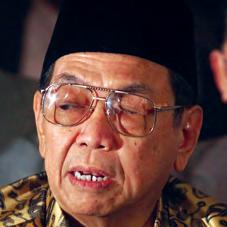

Abdurraham Wahid
Abdurrahman Wahid served as the fourth president of the world’s most populous Muslim nation, Indonesia, from 1999-2001. He was an important figure among religious groups and political movements during the restoration of freedom and democratic rights after 32 years of the Suharto dictatorship.
More popularly known as “Gus Dur,” he showed fellow Indonesians his lifetime commitment to public service and the promotion of liberal democracy and staunchly defended human rights, ethnic minorities, and Indonesia’s secular tradition. Wahid headed the Nahdlatul Ulama (NU), Indonesia’s largest Muslim organisation.
His position as a moral leader was transformed, however, when he and his supporters formed the National Awakening Party (PKB) following the dramatic fall of President Soeharto. He became the Chairman of its Advisory Council and its official presidential candidate in 1999. Though dominated by NU members, Wahid promoted PKB as a party that is non-sectarian and open to all members of society. Wahid passed away in 2009.
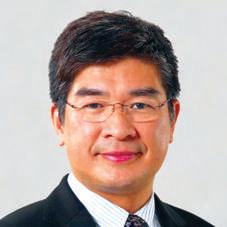
Chung-Kai Sin
Chung-Kai Sin was formerly the Deputy Chairman of the Democratic Party of Hong Kong. He served as a member of its Central Committee since the party’s founding in 1994. In November 2019, Sin was elected as Kwai Tsing District Councillor for a term of four years (2020- 2023), but was disqualified due to a criminal conviction for organizing an unauthorized assembly, for which he was handed a 14-month jail term. The unauthorized assembly was part of the social and democratic struggle in the antiextradition movement in 2019-2021 in Hong Kong.
Sin has a long public service record. He was part of the 1,200-member Committee for Electing the Chief Executive of the Hong Kong Special Administrative Region (HKSAR). He also served as a Legislative Councillor of Hong Kong (Oct 2012 to Sep 2016); and Member of the Legislative Council, representing New Territories South (1995-1997) and then the Information Technology Sector (1998-2008).
Sin was a member of the Housing Authority from 2001 to 2009, and sat in the board of directors of the Hong Kong Mortgage Corporation Limited from 1999 to 2009. He was an elected representative at all three tiers of the Government--Legislative Council, Regional Council (abolished by the HKSAR Government in 1999) from 1988 to 1994 and the Kwai Tsing District Council from 1985 to 2003.
Born and educated in Hong Kong, Sin obtained his Bachelor of Science degree from the University of Hong Kong in 1982 and his master’s in business administration degree from the Chinese University of Hong Kong in 1997. Sin, a life and fellow member of the Hong Kong Computer Society, is married to Yvonne Ying Yee Chan. The couple has two sons, Clement and Ryan.
HONORARY MEMBER
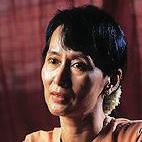
Aung San Suu Kyi
Aung San Suu Kyi served as the State Counsellor of Myanmar in charge of the Foreign Ministry, Energy Ministry, and the Ministry of Education until a military coup in 2021 deposed her and the NLD-led civilian government. In 1991, she was awarded the Nobel Peace Prize for her struggle against oppression and her fight to attain democracy and human rights in her country.
“The Lady” has spent most of her life committed to the people of Burma’s struggle for justice, freedom, and democracy. Much of the last two decades has seen her locked up, but in 2010, she was released from house arrest. In 2012, she contested a by-election and won a seat in parliament. In 2015, NLD won by landslide, paving the way for her appointment as Myanmar’s State Counsellor. Suu Kyi, together with other civilian leaders, are now in detention.

Friedrich Naumann Foundation for Freedom
The Friedrich Naumann Foundation for Freedom (FNF) is a German foundation, which works in 60 countries and territories. FNF is funded by Germany’s parliament and has close ties to Germany’s Free Democratic Party (FDP). FNF has been working in Southeast and East Asia since 1969. We now have offices in Bangkok, Hanoi, Jakarta, Manila, Seoul, Taipei, and Malaysia.
FNF and its partners promote freedom, liberalism, democracy, human rights, tolerance, curbing climate change, an open and digital society, social market economy, and the rule of law. FNF has partnered with CALD since its establishment in 1993. We work together to produce publications and to organize conferences and meetings. These collaborations are aimed at fostering international dialogue and promoting policy exchange and cooperation among Asian political parties sharing similar values.

Liberal International
Liberal International (LI) is the world federation of almost 120 liberal and progressive democratic political parties and affiliates. LI was founded in 1947 to strengthen liberal protection from totalitarianism and communism. Through its advocacy,
networking, and capacitation, LI has become the pre-eminent global network for promoting liberalism, individual freedom, human rights, the rule of law, tolerance, equality of opportunity, social justice, free trade and a market economy.
ContaCt
25th Floor BBC Tower, 29 Soi Sukhumvit 63, Sukhumvit Road, Bangkok, 10110, Thailand
T +66 2 095 2740 fnf-bangkok@freiheit.org

ContaCt
1 Whitehall Place, London, SW1A 2HD
T +44 20 7839 5905 office@liberal-international.org www.liberal-international.org
National Democratic Institute for International Affairs
The National Democratic Institute for International Affairs (NDI) is a nonprofit organization working to strengthen and expand democracy worldwide. Calling on a global network of volunteer experts, NDI provides practical assistance to civic and political leaders advancing democratic values, practices,
and institutions. NDI works with democrats in every region of the world to build political and civic organizations, safeguard elections, and to promote citizen participation, openness, and accountability in government.
ContaCt
455 Massachusetts Ave., NW, 8th Floor Washington, DC 20001
T +1 202 728 5500
F +1 202 728 5520 www.ndi.org

International Republican Institute
International Republican Institute (IRI) was founded as one of the core institutes of the National Endowment for Democracy (NED), with a mission to advance democracy worldwide. IRI has been working to strengthen civil society, political parties, marginalized communities, and other key areas essential to democratic governance. They encourage democracy in places where it is absent, help democracy
become more effective where it is in danger and share best practices where democracy is flourishing.
Since its founding in 1983 IRI has worked in more than 100 countries—in Africa, Asia, Eurasia, Europe, Latin America and the Caribbean, and the Middle East and North Africa.
Contact 1225 I (Eye) Street NW, Suite 800 Washington, DC 20005
T +1 02 408 9450 info@iri.org iri.org
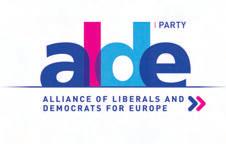
Alliance of Liberals and Democrats for Europe Party
Liberal Democrats created their European political family in 1976 in view of the first European elections, and in 1993 established a true transnational political party. The Alliance of Liberals and Democrats for Europe Party is the party for liberal democrat values in Europe.
Today the ALDE Party consists of more than 70 member parties from more than 40 countries. Together with its liberal member parties across the European continent the ALDE Party is translating the principle of freedom into politics, economics, and all other areas of our societies. It provides an increasingly vital link between citizens and the EU institutions and is continuously growing in size and significance.
Leaders and key figures
Svenja Hahn MEP was elected President of the ALDE Party for a two-year mandate in October 2024 at the Congress in Estoril, Portugal. The ALDE Party brings together elected representatives, mayors, ministers, prime ministers, and members of the European Parliament from among its member parties. Together with the MEPs from the European Democratic Party and in partnership with Renaissance, ALDE forms the core of the Renew Europe group in the European Parliament, which is led by Valérie Hayer MEP.
As of January 2025, liberal democrats account for four EU Prime Ministers: Alexander De Croo (Prime Minister of Belgium), Robert Golub (Prime
Minister of Slovenia), Emmanual Macron (President of France) and Kristen Michal (Prime Minister of Estonia) and five European Commissioners: Kaja Kallas (High Representative for Foreign Affairs and Security Policy), Michael McGrath (Democracy, Justice, the Rule of Law and Consumer Protection), Marta Kos (Enlargement), Hadja Lahbib (Equality, Preparedness and Crisis Management) and Stéphane Séjourné (Executive Vice-President for Prosperity and Industrial Strategy, Industry, SMEs and the Single Market).
Mission Statement
In 60 years of European integration, the European Union has served us well in achieving peace, stability and prosperity. The EU has promoted and extended to half a billion people the four freedoms: the free movement of people, services, capital, and goods across borders. We want the Union to play a key leadership role in tackling the global challenges of today, as well as those of tomorrow.
We strengthen the Liberal Democrat movement in the EU and throughout Europe. We assist Liberal Democrat politicians across Europe to become better acquainted and to define a common political vision. We draw up and adopt a common manifesto for the European Parliament elections, and in 2024 we adopted our new Charter of Values, updating our foundation values document the Stuttgart Declaration.
Renew Europe
Let’s Renew Europe together
There has never been a larger centrist group in the European Parliament. By ending the dominance of the Conservatives and the Socialists, Europeans have given us a strong mandate to change Europe for the better.
We will invest in a sustainable continent. We do not have a Planet B, so we must make sure that we preserve the one we have for future generations. The Paris climate agreement of 2015 set out the roadmap, now it is time to deliver on the promises made and even go beyond them.At a time when the rule of law and democracy are
under threat in parts of Europe, our Group will stand up for the people who suffer from the illiberal and nationalistic tendencies that we see returning in too many countries.
We thrive for a more prosperous Europe to the benefit of all Europeans. By investing in the talents of our citizens and unlocking the potential of Europe’s internal market. We strongly believe that economic growth, environmental sustainability, fair competition and responsibility go hand in hand.
Our mission is to Renew Europe. Because Europe is our future and is well worth fighting for!
ContaCt
ALDE Party Rue d’Idalie 11 – box 2 1050 Brussels, Belgium
T +32 2 237 0140
info@aldeparty.eu www.aldeparty.eu

Contact
reneweuropegroup.eu FT reneweurope
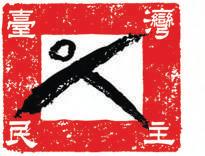
Taiwan Foundation for Democracy
Taiwan’s peaceful transition to democracy is not only a historical accomplishment for its 23 million people, but a landmark in the worldwide spread of democracy. Only after years of struggle and effort could this transformation take place. We must never forget this history, for it shapes the cornerstone of our continued commitment to the principles of democracy and human rights.
The Taiwan Foundation for Democracy (TFD) was established with an inter-related, two-tracked mission in mind. Domestically, the TFD strives to play a positive role in consolidating Taiwan’s democracy and fortifying its commitment to human rights; internationally, the Foundation hopes to become a strong link in the global democratic network, joining forces with related organizations around the world. Through the years, Taiwan has received valuable long-term assistance and stalwart support
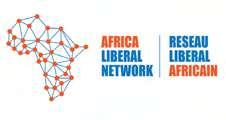
Africa Liberal Network
Developed from what was originally called the Organisation of African Liberal Parties, the network was established during an initial meeting of political parties in Mombasa, July 2001, and was later launched formally in Johannesburg, June 2003. At the Johannesburg, June 2003 meeting, one of our cornerstone commitments, the Johannesburg Declaration was adopted, pledging like-minded political parties, organisations, networks, thinktanks and individuals to the core principles of liberal democracy.
The network’s mission is to support and empower political parties, organisations, networks, think-tanks and individuals, to grow their support,
from the international community, and it is now time to repay that community for all of its efforts.
The Ministry of Foreign Affairs initiated the Taiwan Foundation for Democracy project in 2002. After much research and careful evaluation, the Ministry integrated the required resources from many sectors of society. In January 2003, the Ministry obtained the support of all political parties to pass the budget for the Foundation in the legislature. The TFD formally came into being on 17 June 2003, with its first meeting of the Board of Trustees and Supervisory Board. At that meeting, Legislative Yuan President Wang Jin-pyng was elected its first chairman. According to its by-laws, the TFD is governed by a total of 15 trustees and five supervisors, representing political parties, the government, academia, nongovernmental organizations, and the business sector.
ContaCt
No.4, Alley 17, Lane 147, Section 3, Sinyi Road, Taipei 106, Taiwan
T +886 2 2708 0100
F +886 2 2708 1148 www.tfd.org.tw

to increase their influence on politics and to implement policies of good governance when in government.
The current active programme of the network is the Women Empowerment Programme. It is an an annual development programme for women politicians from ALN member parties. We aim to develop their knowledge and skills to win candidate nominations, upcoming elections, and internal party leadership positions. The programme also aims to dismantle barriers to women’s political participation and selection as candidates.
ContaCt
3rd Floor Travel House, 6 Hood Avenue, Rosebank, Johannesburg 2196 Republic of South Africa
T +27 11 880 8851
M +27 73 707 8513 www.africaliberalnetwork.org

Liberal Network for Latin America
RELIAL (Red Liberal de América Latina), the Liberal Network of Latin America, is a Latin America-wide network of currently 41 civil society organizations, political parties, think tanks, and research-institutes. RELIAL is forming the institutional frame for leaders and opinion makers, academics, intellectuals, business people, and personalities from the region who share and profess the ideas of individual freedom, limited government, the market economy, the rule of law, and a free democratic system in the continent.
ContaCt
IOS Offices Torre Murano, Av Insurgentes Sur 2453, Suite 6000, Piso 6
Col. Tizapan
Alvaro Obregon
CP 01090 CDMX
T +55 52 5556 5548 www.relial.org

The Council of Asian Liberals and Democrats (CALD) was inaugurated in Bangkok in 1993, with the support of then Thai Prime Minister Chuan Leekpai and South Korea’s Kim Dae-Jung. CALD, which offers a unique platform for dialogue and cooperation, is the only regional alliance of liberal and democratic political parties in Asia.
CALD was formed out of the recognition of leaders of like-minded political parties in Asia of the need for a dynamic forum promoting discussion and exchange of ideas regarding trends and challenges affecting democracy, human rights, and the rule of law in the region.
The chair parties of CALD since its inception to the present have been the Democrat Party of Thailand or DP (1993 – 1995, 2002 –2004, 2016 – 2018), the Democratic Progressive Party of Taiwan or DPP (1995-1997, 2004-2005, 2018-2020), the Liberal Party of the Philippines or LP (1997-1999, 2005-2007, 2020-2023), the Singapore Democratic Party or SDP (2007-2010), the Liberal Party of Sri Lanka or LPSL (1999-2000, 2010-2012), the Sam Rainsy Party/Cambodia National Rescue Party (2000-2002, 2012-2014), Civil Green Party of Mongolia (2014-2016), and the Candlelight Party (2023 to present).
The other members of CALD are the Parti Gerakan Rakyat Malaysia (PGRM), and the Indonesian Democratic Party of Struggle (PDI-P), while Hong Kong legislator Chung-Kai Sin is an individual member. In 2010, CALD bestowed honorary individual membership to Daw Aung San Suu Kyi of Myanmar. The Constitutional Democratic Party (CDP) of Japan is an observer party.
Through CALD, political parties, groups, and individuals have a continuing discussion on the developments occurring in the various countries of the region. The aim is to assess the possibilities for liberal solutions to problems facing Asian democracies.
Accordingly, CALD organizes network meetings including those with its partners (Friedrich Naumann Foundation, Liberal International, Alliance for Liberals and Democrats for Europe, Renew Europe, Taiwan Foundation for Democracy, and the National Democratic Institute for International Affairs), international conferences on vital issues affecting the region, and regular workshops on communication, political management, and women in politics. It also sends missions for various advocacies, sponsors internship programs in its secretariat, as well as maintains a website, a social-network group account, and a weekly electronic newsletter.


CALD SECRETARIAT
Celito Arlegue Executive Director
Paolo Antonio Zamora Program Manager
Mari Julienne Janolo Communications Officer
Chelse Racar Caballero Program Officer
EDITOR C.C. Balgos
LAY-OUT & ART
Michael A. Gadi



